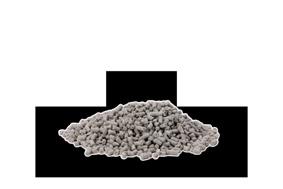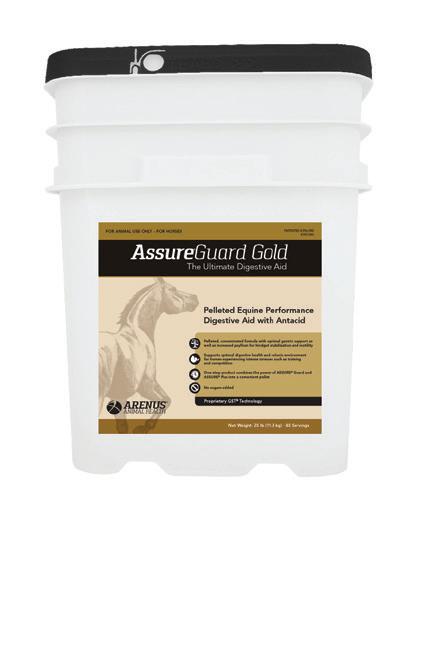



























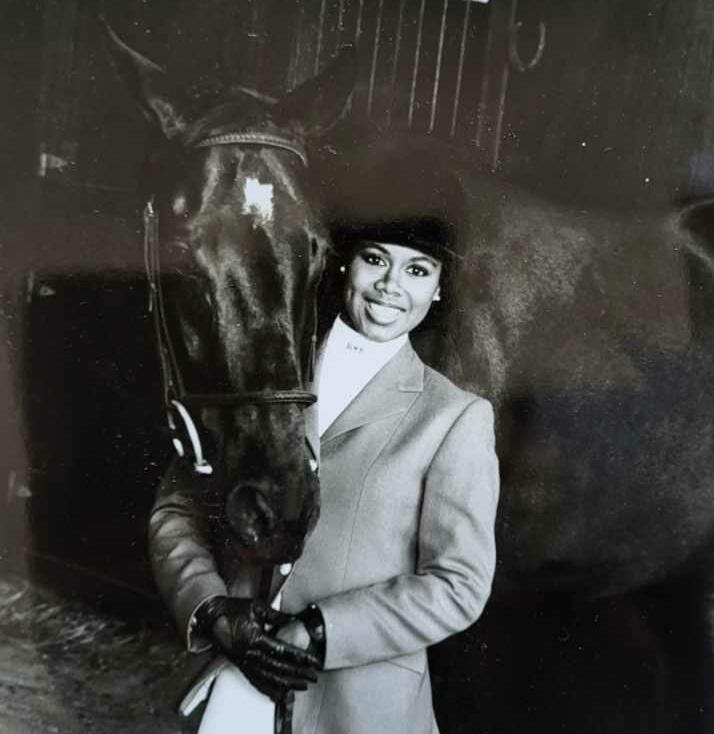




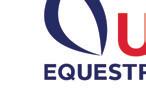




Official Magazine of the United States Equestrian Federation
US EQUESTRIAN MAGAZINE
Volume LXXXVII, Winter 2023
PUBLISHED BY
The United States Equestrian Federation, Inc.
CHIEF MARKETING & CONTENT OFFICER
Vicki Lowell | vlowell@usef.org
EDITOR-IN-CHIEF
Glenye Cain Oakford | goakford@usef.org
CREATIVE DIRECTOR
Candice McCown | cmccown@usef.org
ADVERTISING DIRECTOR
Kim Russell | 859 225 6938 | krussell@usef.org
DIRECTOR OF SPONSORSHIP & SALES
Layson Griffin | lgriffin@usef.org
ASSISTANT DESIGNER
Kendall Neubeiser, Kate Strom
EDITORIAL STAFF
Emily Girard, Kathleen Landwehr, Kim Russell
CONTRIBUTING WRITER
Kim and Ciara Doyle
Equestrian Magazine (ISSN 1548-873X) is published five times a year: Horse of the Year Special Edition, Spring, Summer, Fall, and Winter, by the United States Equestrian Federation®, 4001 Wing Commander Way, Lexington, KY 40511; Phone: (859) 258-2472; Fax: (859) 231-6662. (ISSN:1548-873X). NOTE: Effective Spring issue of 2018, Equestrian magazine will be published and provided electronically and only four editions will have printed copies and be provided by U.S. Mail. The Winter issue will only be provided electronically. The Horse of the Year issue will be mailed only to competing members as of the date of publication and the year immediately prior to the date of publication. USEF is not responsible for the opinions and statements expressed in signed articles and paid advertisements. These opinions are not necessarily the opinions of USEF and its staff. While the Federation makes every effort to avoid errors, we assume no liability to anyone for mistakes or omissions. It is the policy of the Federation to report factually and accurately in Equestrian and to encourage and to publish corrections whenever warranted. Kindly direct any comments or inquiries regarding corrections to Glenye Cain Oakford goakford@usef.org or by direct dial 859-225-6941. POSTMASTER: Send address changes to US Equestrian, 4001 Wing Commander Way, Lexington, KY 40511. Canadian Publications Agreement No. 40845627. For Canadian returns, mail to Canada Express, 7686 #21 Kimble Street Mississauga, Ontario, Canada, L5S1E9. (905) 672-8100. Reproduction of any article, in whole or part, by written permission only of the Editor. Equestrian: Publisher, United States Equestrian Federation®, Chief Executive Officer, William J. Moroney (859) 225-6912. Director of Advertising, Kim Russell (859) 225-6938.
Copyright © 20120 Equestrian is the official publication of the United States Equestrian Federation, the National Governing Body for Equestrian Sport in the USA, and is an official publication of USEF.
Published at 4001 Wing Commander Way, Lexington, Ky 40511




Official Timepiece rolex.com
Proud partners of US Equestrian

Title Sponsor of the U.S. Show Jumping Team netjets.com

Official Vehicle & MemberPerk
Title Sponsor of the U.S. Eventing Team
Title Sponsor of the U.S. Driving Team landroverusa.com

Official Blanket of the U.S. High Performance Teams horseware.com
Title Sponsor of the USEF Hunter Seat Medal Final & Official MemberPerk doversaddlery.com
Official Footwear & Apparel ariat.com
Official Joint Therapy adequan.com
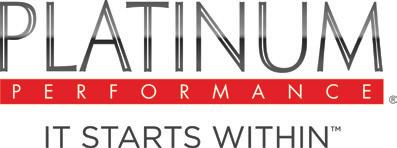
Title Sponsor of the USEF Horse of the Year Program and Official MemberPerk smartpakequine.com
Official Partner of US Equestrian marsequestrian.com
Title Sponsor of the USEF Show Jumping Talent Search Program platinumperformance.com

Official Partner of US Equestrian Official Training Support Device of US Equestrian & Official MemberPerk shop.movensee.com
Official Partner of US Equestrian zoetis.com

Title Sponsor of the Perrigo U.S. Para Dressage Team perrigo.com
Official Hay Steamer of US Equestrian Official Supporter of Equine Respiratory Health of US Equestrian & Official MemberPerk haygain.us

Title Sponsor of the USEF Young & Developing Horse Dressage National & Championships & Title Sponsor of the USEF Emerging Young Horse Dressage Program horseinsurance.com
Official Pinque Coat, Tail Coat and Show Coat of US Equestrian Teams charlesancona.com
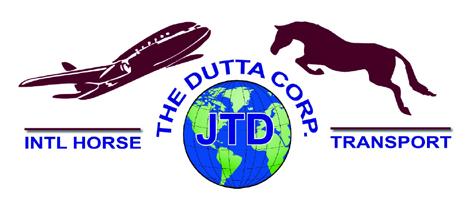
Title Sponsor of the U.S. Dressage Team Official Equine Air Transportation Provider timdutta.com




Official Helmet Supplier charlesowen.com









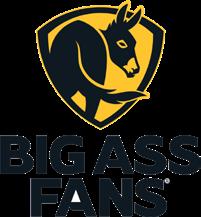









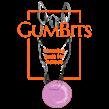



When you are ready, we want to help get you where you are needed to do what is best for your business. We are now offering new and enhanced programs, making business—and personal—travel easier and more cost-efficient than ever before.
Call 1-866-JET-9930 or visit netjets.com.

Dear USEF Members,
It’s tempting to see winter as a time of endings: one year draws to a close, at the barn we watch summertime’s long hours of light wane into earlier sunsets, and, for many of us, the competition season finishes with Championships. But winter also can be a time of opportunity, to try new things, and to hone skills. In this issue’s “Finding Your Focus” feature, we turn our attention to strategies equestrians can use to sharpen their own mental focus and build confidence at any time of year, even if wintry weather is keeping you and your horse in the barn. The article is excerpted from “Winning Habits: How Elite Equestrians Master the Mental Game,” by equestrian mental coach and 2023 USEF Horsemastership Training series presenter Annette Paterakis. It draws on her deep experience not only in studying applied psychology, but also in working with top equestrian athletes. Applied consistently, the strategies and exercises she discusses here will serve you well both in and out of competition, and they can help your equestrian performance plans become more than a short-lived New Year’s resolution. This winter issue is also infused with celebration, not only of the season’s literal gifts (though you will find inspiration for your list in our annual Holiday Gift Guide), but also of the gifts horses give us when we live our lives in their company. Often, I hear how equestrian sport is a homogeneous group, but after a few years of travels and interactions with members in my role as USEF President, I have met many equestrians from diverse backgrounds and perspectives and enjoy hearing about and witnessing how the horse connects us all. For example, in “Catch Riding Through Life,” author Denise Quirk draws on primary sources, historic documentation, and interviews with Black equestrian Donna Cheek to capture Cheek’s journey from horse-crazy California kid to 2022 Ethos Award winner as a Black pioneer in equestrian sport. Cheek did not grow up in a horsey family but was determined to build a life with horses, and she has done just that. In 1982, the teenage Cheek became the first Black American on a U.S. team in an international event when she participated in the 1982 American Junior Show Jumping Championship in Mexico City. “I want my life to be an example for young Black women who are told they can’t do something,” she said not long afterward. Cheek certainly was an inspiration, but she was more than a symbol. She dedicated herself to
the art of horsemanship, something that clearly has given her lifelong satisfaction. “It’s been a joy and privilege to better the life of horses that came through my barn or that I encountered in my career,” she told Quirk.
We hear about a similar passion for horses and competition from combined driving athlete Chrissy Aitken, who took time after her debut FEI Para Driving World Championship performance to contribute this issue’s “I Am US Equestrian” column. Aitken, who survived life-threatening injuries from a house fire in her childhood, began working with horses as a sophomore in college. “I enjoy the freedom that driving gives me,” she writes. “With horses, I have learned confidence in my abilities. I’ve learned to be patient because things may not always go right the first time. I’ve learned to trust—trust in the horse’s ability and for the horse to trust me.”
The importance of community is a thread that runs through both Donna Cheek’s and Chrissy Aitken’s stories. Both women found communities that lifted them up, supported their dreams and delighted in their accomplishments. So many of us find that kind of extended family through horses and equestrian sport. That experience is a powerful draw for people to try equestrian sport and a strong reason they stay involved.
A crucial element in fostering such a community is safety—and specifically the commitment to protect our youngest equestrians. At US Equestrian, we take that responsibility very seriously and pledge to help the entire equestrian community fulfill this obligation to participants. As part of our many resources offering Safe Sport guidance, this issue’s Safe Sport story reviews transportation and lodging policies covered under the Minor Athlete Abuse Prevention Policies. This overview is timely as many young equestrians prepare to migrate to winter show grounds with coaches, families, and barn mates. Our Safe Sport department provides this valuable refresher, as well a link for parents and others to access training and additional educational materials online at usef.org/safe-sport.
We at US Equestrian wish you all a peaceful, joyous, and safe holiday season.
 Tom O’Mara President
Tom O’Mara President
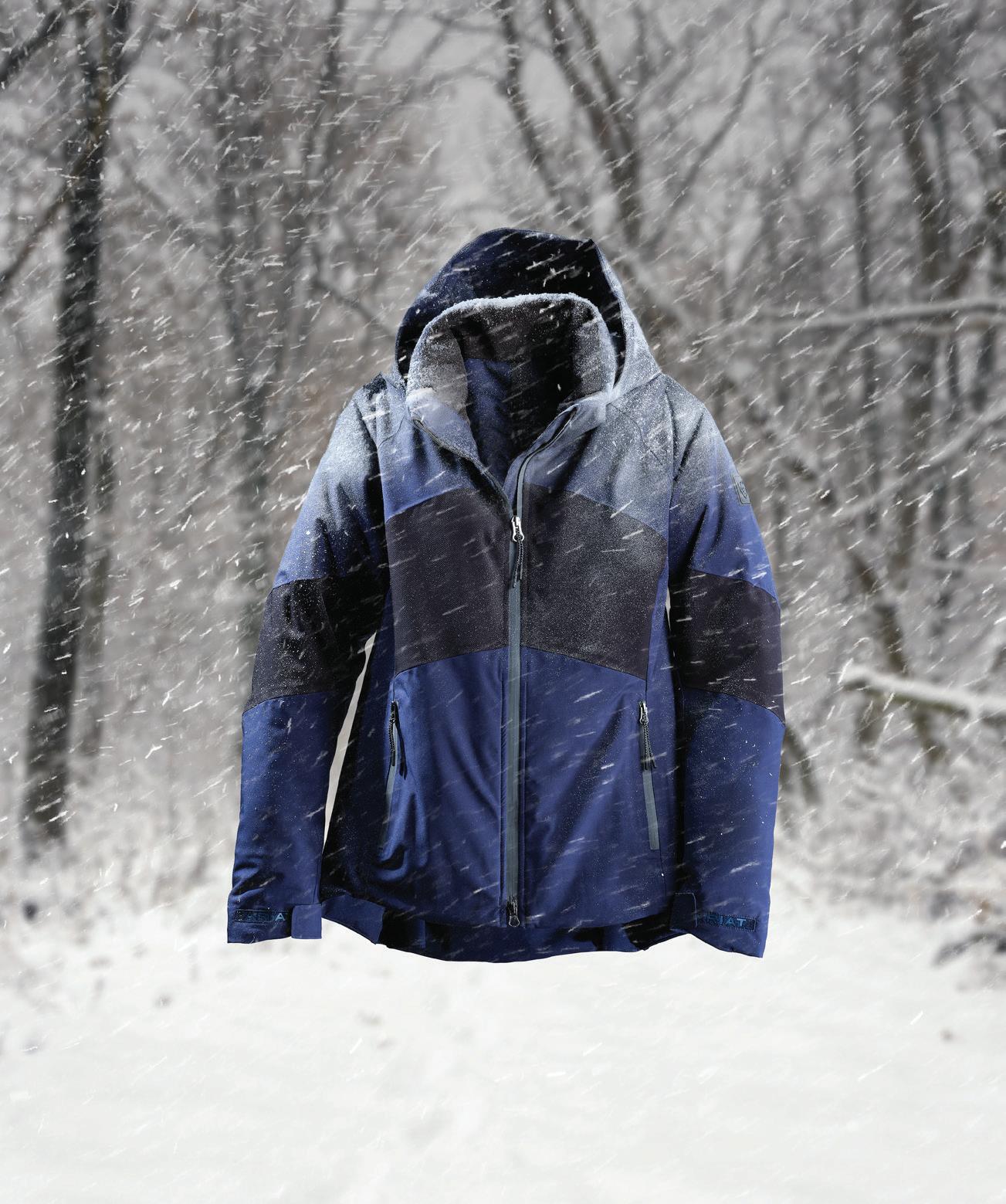
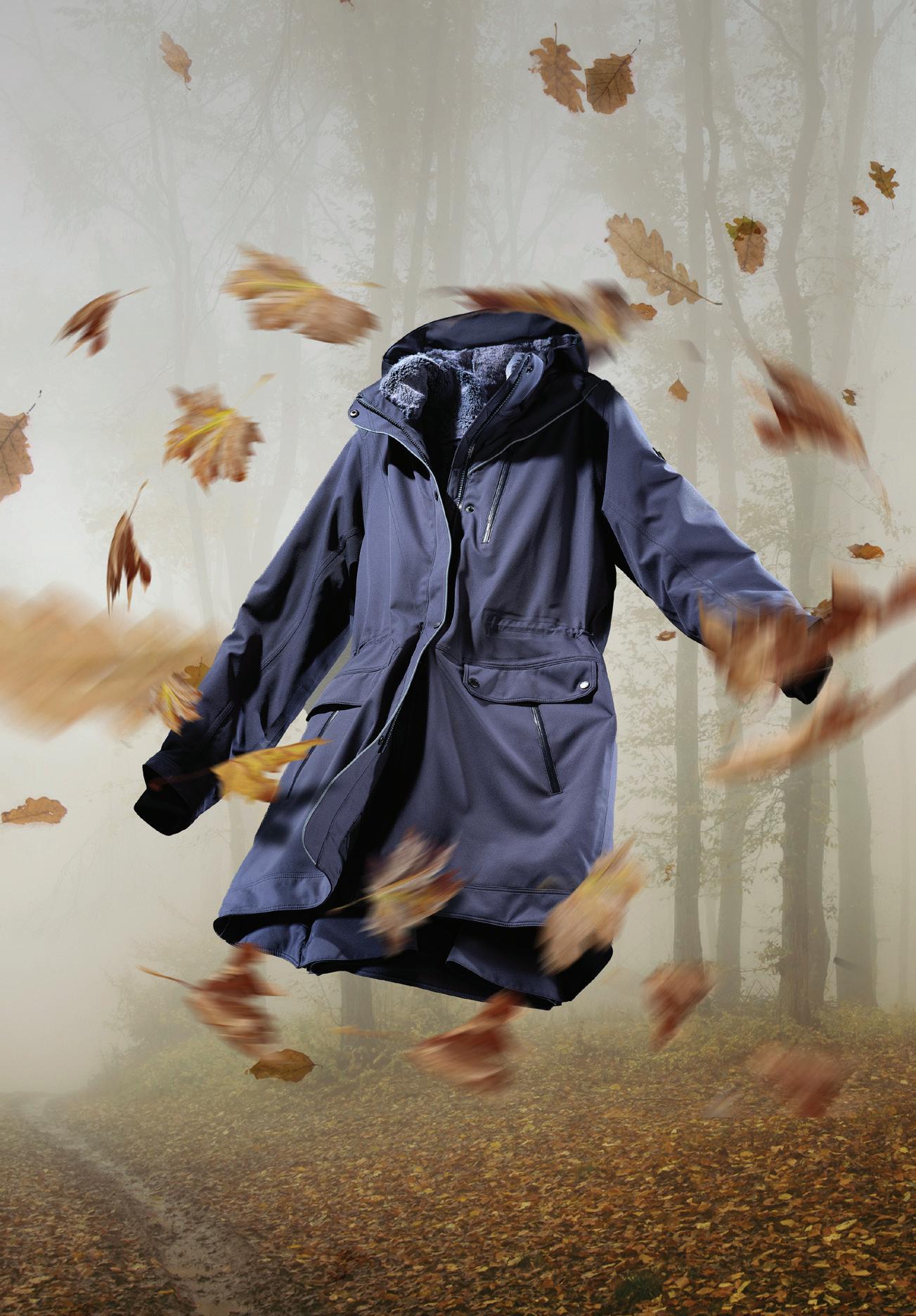

WHATEVER THE WEATHER, WE’VE GOT YOU COVERED
TEMPEST PARKA
PROUD PARTNER
IDEAL DOWN PARKA




Protect your horse's respiratory & digestive health by reducing of the microscopic irritants commonly found in hay.
Plus, up to 3X the moisture



The U.S. Equestrian Federation (USEF) is unveiling 2USEF (28733), a new, easy-toremember number for anonymously submitting any misconduct concerns regarding the USEF Safe Sport Policy including the Minor Athlete Abuse Prevention Policies (MAAPP) and equine safety issues.
“USEF prioritizes the wellbeing of our athletes, both human and equestrian alike, and this is another step toward removing barriers to reporting concerns about participant abuse and horse health,” states Sonja Keating, USEF Chief Operating Officer and General Counsel. “The new code, 2USEF (28733), is simple to text and importantly, all texts received are anonymous.”
If a member becomes aware of a USEF Safe Sport Policy violation or an equine safety or welfare concern, they now can text 2USEF (28733) directly and attach any photos, videos, or other relevant information. USEF will receive the communication, but the sender’s contact information will remain unavailable to USEF. This report will then be directed to the appropriate USEF staff member for resolution.
In 2022, USEF implemented RealResponse, an anonymous reporting platform that allows members to report any issues anonymously and quickly regarding violations of the USEF Safe Sport Policy, including the MAAPP.
Additionally, USEF members and participants will now be able to submit anonymous reports regarding Equine Safety matters through the same number. Adding this functionality to the same number will allow anonymous reporting of equine safety concerns directly observed at a competition, which may include reports of failure to follow health and safety protocols, improper training practices, and observed violations of prohibited substances practices.
“Given the success of this program, it made sense for us to expand the use of RealResponse to horse health concerns, too,” states Keating. “Now, a member only needs to remember 2USEF (28733) to easily report a concern.”
USEF has updated the MAAPP posters to include QR codes that will direct members to the anonymous texting platform.
More information on additional ways to report concerns regarding violations of the USEF Safe Sport Policy can be found here
Members are also welcome to report Equine Safety matters by emailing medequestrian@aol.com or by calling 800-633-2472. Equine health and safety concerns may also be reported via the USEF webpage
U.S. vaulting athletes notched four top-10 placings and a bronze medal at the FEI Vaulting World Championship for Young Vaulters and Juniors in Flyinge, Sweden, where the U.S. fielded participants in the Junior Individual, Pas de Deux, and Squad competitions, as well as in the Young Vaulter Individual competition.
The Junior Squad claimed a bronze medal, and there was a total of four top-10 placings for the U.S. under the guidance of Chef d’Equipe Emma Seely and Assistant Chef d’Equipe Kimberly Wellmann.
The Oak Hills squad of Gracie Griffiths (Elk Ridge, Utah), Miriam Griffiths (Elk Ridge, Utah), Jacey Muir (Payson, Utah), Mikell Stoddard (Eagle Mountain, Utah), Amber Terry (Spanish Fork, Utah), and Abby Wilson (Spanish Fork, Utah) represented the U.S. in the Junior Squad competition. The squad kicked off the competition with their mount Drillian, a 2008 Hanoverian gelding owned by Reitclub Blau-Weiß Löwenstedt, and lunger Selena Brummund (GER) by earning a score of 6.035 in the Compulsory Test. Next, they delivered a stellar Free Test to score 7.321. The squad closed out the competition by earning its top score in the second Free Test performance–a 7.364–to finish with an overall score of 7.021, clinching the bronze medal.
Young U.S. vaulters Aria Deshpande and Hanna Parker also finished fourth overall in the Junior Pas de Deux at a competition that saw strong performances from a slate of U.S. athletes. For an event recap, including comments from coaches and competitors, visit usef.org



USEF and leaders from the Arabian Horse Association, American Morgan Horse Association, and American Saddlebred Horse and Breeders Association have announced refinements to the licensing requirements for USEF Lite competitions.
Highlights from this collaborative work include
• Horse entry number thresholds to define eligibility for Arabian, Morgan, Saddlebred/ Roadster/Hackney/Harness, or Multi-Breed USEF Lite competitions that will permit these competitions to be licensed as USEF Lite for longer than three years. Thresholds are posted on the USEF website here.
• An approved Presidential Modification to waive the $50 licensing fee for the 2023 and 2024 competition years for all USEF Lite competitions, regardless of breed or discipline type.
• An approved Presidential Modification to add wording to the Local Competition rule to allow USEF Lite competitions to offer more than $500 in prize money if approved by the Federation. A rule change proposal has been drafted to amend the rule to align with the Presidential Modification.
• Organizers of a USEF Lite competition can use a USEF licensed steward or technical delegate, or a USEF applicant steward or technical delegate to officiate as a steward at their competition.
• A grant program to financially assist USEF Lite competition organizers who use an applicant steward or applicant technical delegate in the role of competition steward at their competition. Click here for the grant application.
• “Multi-breed” dressage classes can be held at USEF Lite competitions. These classes cannot use the name “open” and do not count for USDF or USEF Horse of the Year awards, scores, or qualifications.
• Each affiliate will determine if USEF Lite competitions will count for their affiliate association’s awards and qualifications.
• The existing rule that requires any adult who signs the USEF Lite competition entry form as coach or trainer to be a USEF Competing Member and complete the applicable SafeSport Training remains unchanged.
• USEF, AHA, AMHA, and ASHBA will proactively work with organizers to assist them with operating USEF Lite competitions.
• To simplify and clarify USEF Lite competitions for organizers and participants, USEF has produced a quick reference guide (click here) that will outline all the needed steps for organizing and participating in a USEF Lite competition.
Other USEF recognized affiliates or competition organizers interested in learning more about the USEF Lite competition license and the opportunities it affords can find additional information by visiting the USEF Lite Resources page on the USEF website. For specific licensing questions, please contact the Competitions Department at dates@usef.org
US Equestrian is pleased to announce that Nicole Zerbee has been named Director of Endurance. Zerbee is based in the Lexington, Ky., office and will report to Steven Morrissey, Managing Director of Sports Logistics and NonOlympic Disciplines.
Zerbee is a familiar face within US Equestrian, having served as the National Breeds and Non-FEI Disciplines Operations Manager since April of 2018. In that role, she served as the staff liaison for several USEF breed and discipline committees and affiliate organizations. She has extensive experience in coordinating rule change proposals, traveling to competitions to host meetings and answer questions from members across numerous breeds and disciplines, and assisting in the management of US Equestrian programs and competitions.
“I look forward to bringing my USEF knowledge and experience to the endurance community and working with the endurance committee to help promote and grow the sport,” Zerbee said. “I am eager to explore the possibilities for how I can best support endurance in continuing to build an enjoyable, safe, and thriving discipline within USEF.”


Today, experts recommend less frequent, targeted deworming with effective products based on your horse’s age and the length of your grazing season.1
Quest® Gel and Quest® Plus Gel are the only equine dewormers that target the most threatening parasites in a single dose.*
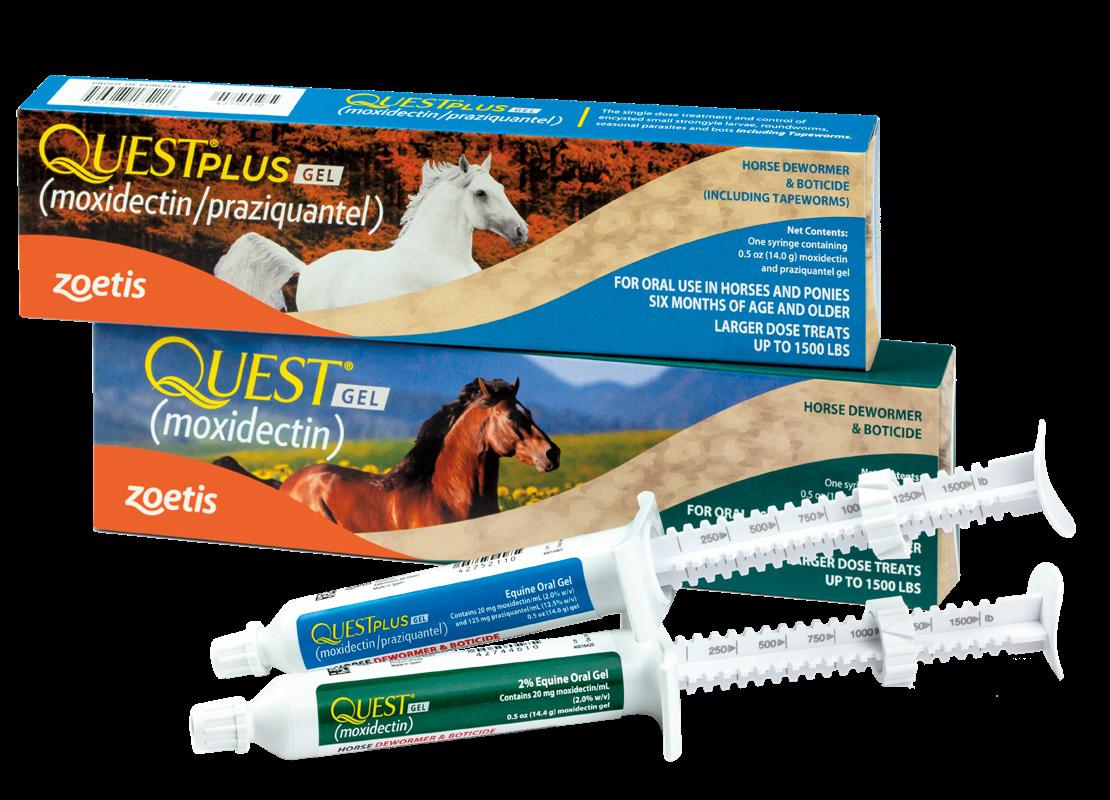
Scan to take the quiz and find the right dewormer recommendation for your horse.
IMPORTANT SAFETY INFORMATION: Do not use Quest® Gel or Quest® Plus Gel in foals less than 6 months of age or in sick, debilitated and underweight horses. Do not use in other animal species, as severe adverse reactions, including fatalities in dogs, may result. Consult your veterinarian for assistance in the diagnosis, treatment and control of parasitism.
1. American Association of Equine Practitioners. AAEP Internal Parasite Control Guidelines. https://aaep.org/guidelines/parasite-control-guidelines. Accessed September 2022. *Compared to labels of Zimecterin®, Zimecterin Gold®, Eqvalan®, IverCare®, Duramectin, Bimectin®, EquiMAX®, Safe-Guard®, and Panacur®. Zimecterin, Zimecterin Gold, and Eqvalan are registered trademarks of Boehringer Ingelheim Animal Health. IverCare is a trademark of Farnam Companies, Inc. Bimectin is a
of

US Equestrian’s Board of Directors approved a new microchipping rule during the 2023 Mid-Year Board meeting in June. The rule, which becomes effective beginning Dec. 1, 2025, under GR 1101.1, requires all horses competing in USEFlicensed or -endorsed competitions to be microchipped with a 15-digit ISO compliant 11784/11785 chip.
Microchips in horses allow for immediate on-site verification of horses, which is vital, especially during times of disease outbreaks or natural disasters.
“I am thrilled to see widespread use of microchipping technology put in place,” said Judy Sloan, amateur dressage competitor and USEF Secretary Treasurer. “Knowing that we can quickly and accurately identify, track and protect our horses is a positive step for horse welfare and gives me real peace of mind as a horse owner.”
The implantation process of a microchip takes only a few seconds. The
microchip is inserted into the nuchal ligament of the horse’s neck, and the chip will last for a horse’s lifetime.
“In the event of an infectious disease outbreak, microchip readers may be utilized by state and federal animal health officials or veterinary staff to scan microchips of horses on the competition grounds for the purpose of identification of exposed horses to be isolated and quarantined,” explained Dr. Katie Flynn, USEF’s Senior Veterinarian, Equine Health and Biosecurity. “Microchips will allow our competitions to become an even safer and healthier place for equine athletes.
“I strongly recommend horse owners consider the use of a biothermal microchip,” she added. “This microchip not only identifies your horse, but, when scanned, records a temperature. These biothermal chips can be utilized by horse owners for daily monitoring of their horse’s health at home and on the
road. As a rise in temperature is often times the first sign of an infectious disease, this allows a horse owner to take prompt action to isolate and care for the horse before it infects other horses.
Recognizing the potential costs associated with requiring microchips for horses entering licensed competitions, US Equestrian is seeking potential partnerships with microchip companies, software companies, and veterinarians to provide USEF members with discounted microchipping services. USEF is also exploring options for microchipping events at future USEF-licensed competitions and is collaborating with equine veterinarians on strategies for microchipping USEF horses at designated locations across the country.
“I urge everyone, especially those connected to a registered breed who see no purpose to microchip a horse because their horse’s pedigree was verified by DNA, to educate themselves on the value of an equine microchip,” said USEF Vice President Judy Werner, noting that microchips aid traceability during disease outbreaks (which helps mitigate disease spread), help owners and managers quickly and easily take the temperatures of many horses several time a day, and more. “The microchip is a tool whose value is many times its price.”
Learn more about microchipping at US Equestrian’s microchip information webpage , which offers outreach and educational resources, including Microchip 101, Microchip Mythbusters, and the Microchip Rule FAQ.
US Equestrian has launched a dedicated page on usef.org to allow members to keep up with developments from the vesicular stomatitis outbreak that was, at press time, affecting a number of counties in California. The page includes updates to USEF policies around the outbreak, such as any changes to USEF requirements and protocols for licensed events; guidance on USEF requirements; critical control
measures for USEF-licensed competitions; a VS video educational module about the examination of horses upon arrival at events, and more.
The VS page provides such useful features as FAQs and general information about VS and its prevention, easy-to-share infographics, and forms for competition management, and a printable temperature log that can be used on an individual stall.
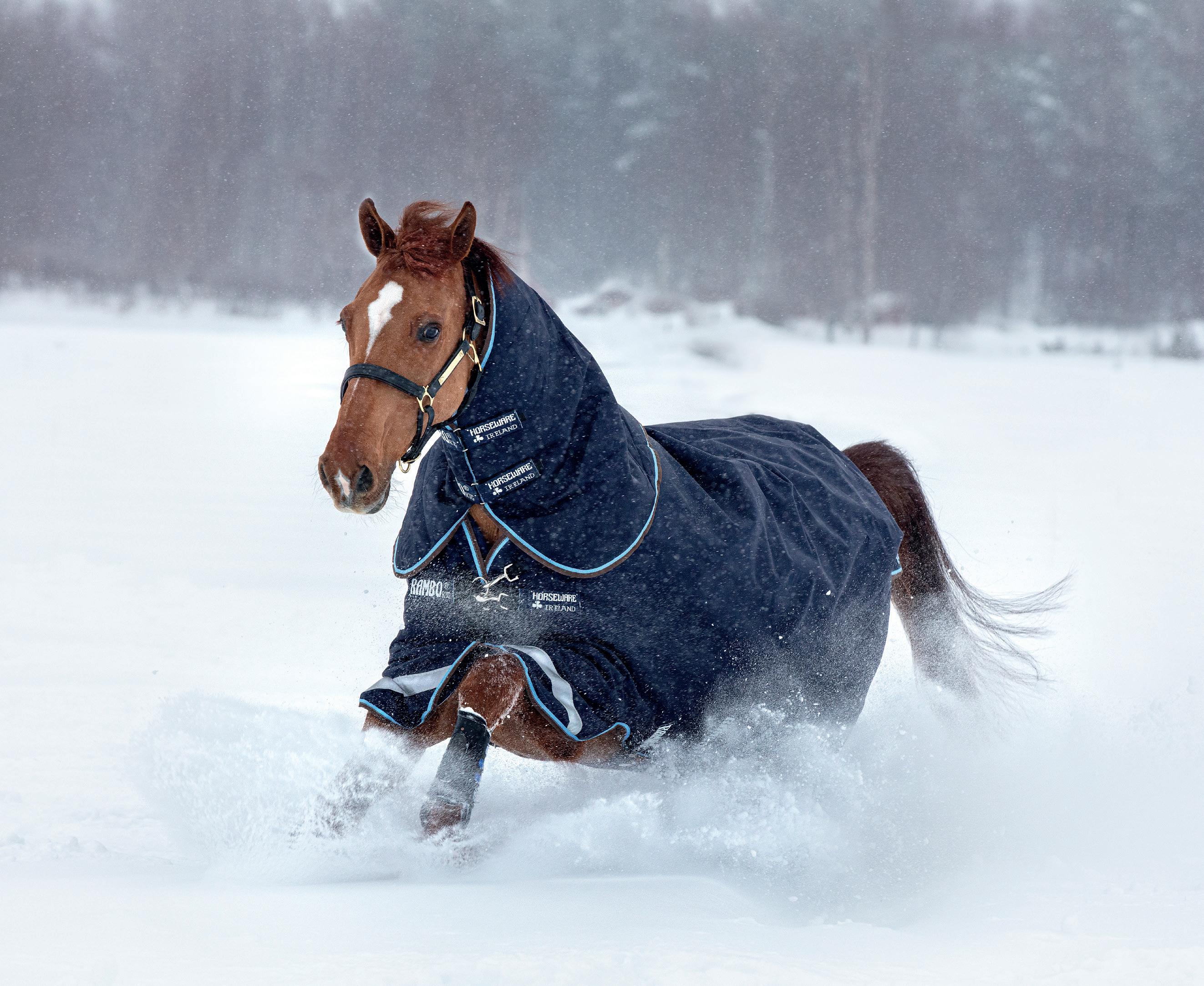

The all-weather robust Rambo ® Duo offers exceptional waterproof and breathable properties making it the perfect all-season turnout blanket. Designed with shine-enhancing, anti-static and anti-bacterial lining to keep your horse’s skin happy and healthy with use.
the Rambo ® Range online now
WELLNESS + DIGESTIVE CARE
Platinum Performance® GI
For added gastrointestinal and immune health, this formula provides probiotics, prebiotics and additional glutamine.
RECOMMENDED FOR:
• Digestive health concerns
• Difficulty maintaining weight
• During training, competition or travel
WELLNESS & PERFORMANCE
Platinum Performance® Equine
Delivering results for nearly 30 years, this wellness formula supports total body health and performance.
RECOMMENDED FOR:
• All ages and life stages
• All levels of activity
WELLNESS + JOINT SUPPORT
Platinum Performance® CJ
For the highest level of joint support, this formula promotes healthy joints with ASU, hyaluronic acid and more.
RECOMMENDED FOR:
• Advanced joint care needs
• Additional tendon and ligament support
• Performance horses or prospects



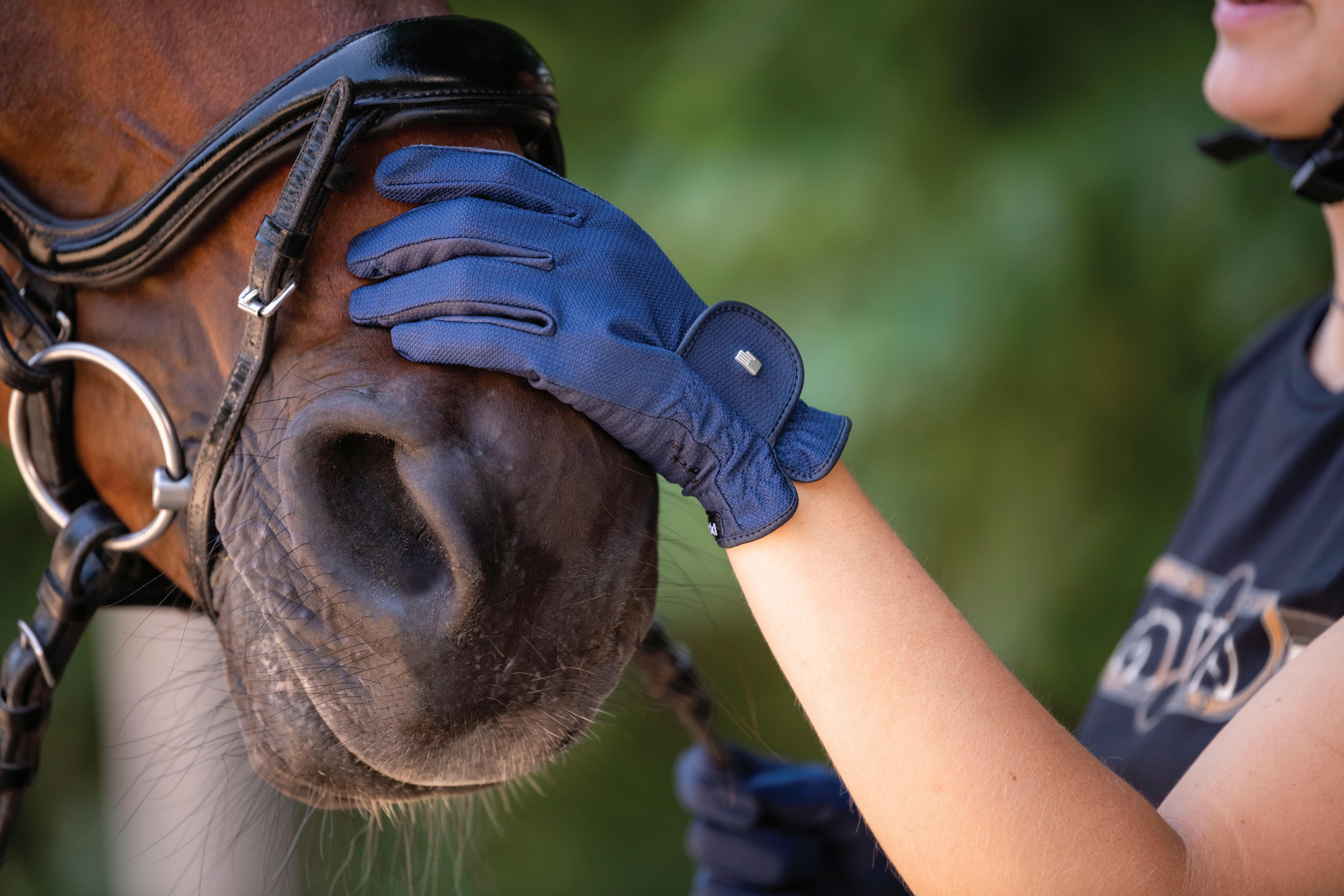
Roeck-Grip® Lite gloves are made with Roeckl's exclusive Roeck-Grip® material that provides soft, breathable comfort on hot summer days! Like Roeck-Grip and Roeck-Grip Winter, the Roeck-Grip Lite fits like a second skin, giving the rider a close contact feel, and is even touchscreen compatible! Roeck Grip Lite gloves are available in Black, White, and the new Naval Blue!
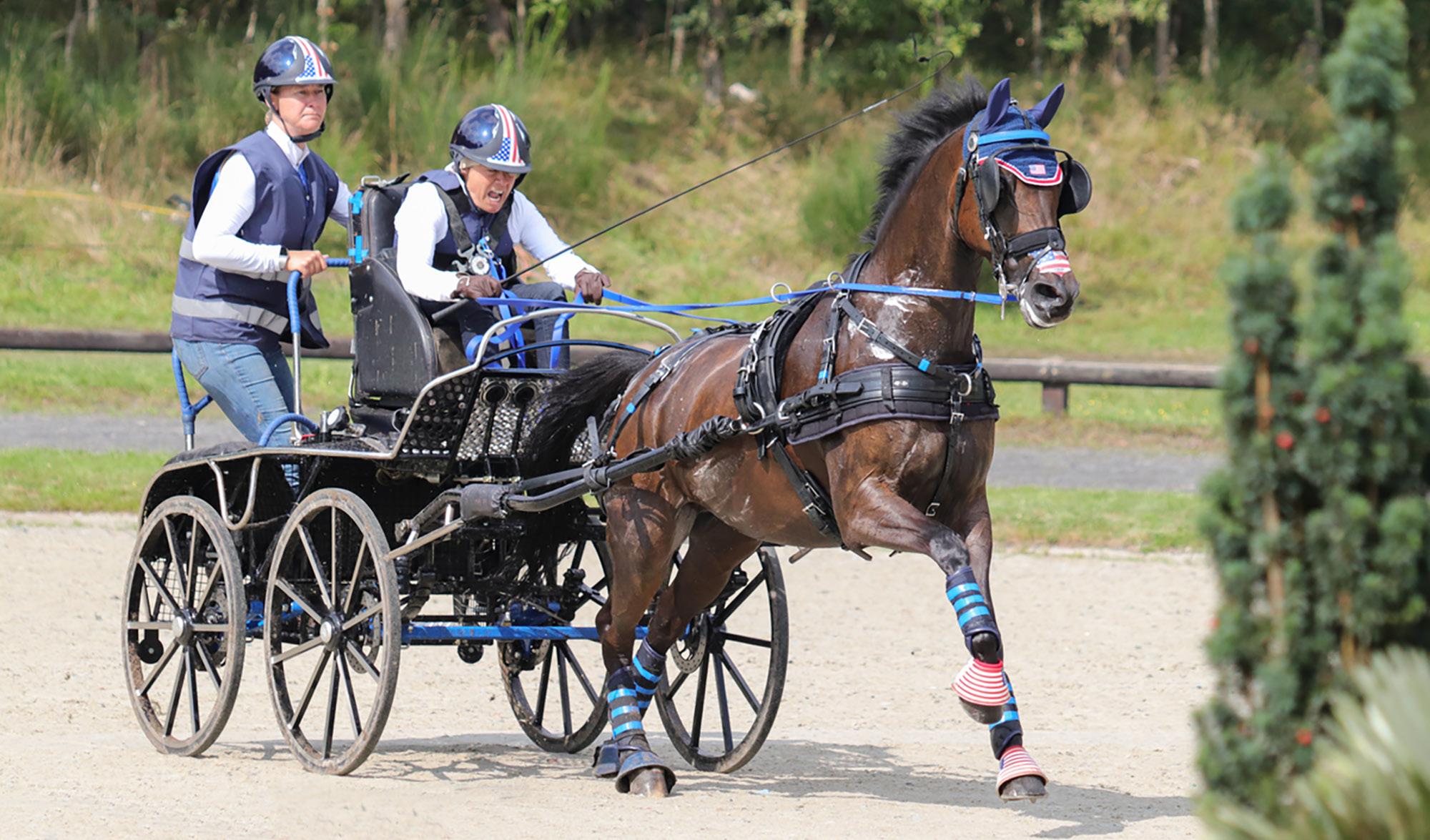
“I started in a really big group and we split off. The group that I split off with ended up becoming great friends, some that I had known before and some I made today. It was really great to ride and chat with people I enjoyed.”
- Avery Betz-Conway, after her top-20 completion at the 2023 FEI Edurance World Championship for Young Riders and Juniors in Castelsagrat, France

Above left: Para driving world champion Tracy Bowman, navigator Jolie Wentworth, and Albrecht’s Hoeve’s Lars at the FEI Para Driving World Championship for Singles in the Netherlands, where they led from start to finish to claim gold.
Above right: Kathryn Padilla on Celebration and Logan Baras on Dream Big share a joyous moment at the USEF Pony Finals presented by Honor Hill Farms in Lexington, Ky.
Opposite: Tarah Taylor takes a leap on Wervelwind, lunged by Ingrid Hamar, en route to a 2* Silver Individual Female National Champion title at the 2023 USEF/Equestrian Vaulting USA Vaulting National Championships in Rancho Murieta, Calif.
“I think this sport is incredible. It’s taught me a lot of valuable life lessons, and I hope to continue it as long as I can.”
- Mimi Gochman, in an FEI video celebrating her Longines FEI Rising Star Award 2023


To find a veterinarian near you who offers PulseVet® shock wave therapy, visit Zomedica.com/PulseVet
To learn more, call or click Zomedica.com • 800.245.4417 info@zomedica.com

•90% success in treating back pain and kissing spines
•Helps speed the healing of tendon and ligament injuries
•81% improvement in horses with Navicular Syndrome
•Clinically proven to reduce lameness associated with chronic orthopedic conditions

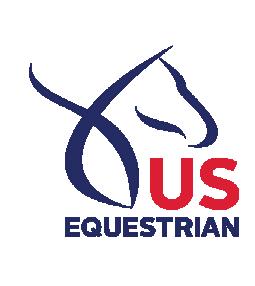


Before young equestrians travel to winter show grounds in the company of adults, it’s a good time to review transportation and lodging policies covered in the Minor Athlete Abuse Prevention Policies.
As the winter months approach, we know that some equestrians start to consider a move to warmer climates. Whether for better riding conditions or simply for the fear of snow, this migration southward is an annual feature of some equestrians’ lives.
During this move south, we know that some young equestrians leave their homes and travel with adults who are not their parents. Whenever that is the case, it’s important to take proactive steps to protect the wellbeing of our young athletes so that they may continue their training and reap the benefits that come with participating in our sport through the winter months.
As we review both the transportation and lodging policies, please note that these are meant to be proactive, preventative measures. In order to protect young equestrians, it’s vital to understand what situations can occur and to understand how to proactively protect young equestrians from potentially higher-risk situations.
The following sections will review the topics found in the Minor Athlete Abuse Prevention Policies. To see the policies in full, please visit usef.org/forms-pubs/dPLrSbE5I20/maap-policies. The sections reviewed below begin on page 14 of the USEF Safe Sport Policy.
In the following sections, we discuss “minor athlete” and “adult participant.”
A minor athlete is defined as an amateur athlete under 18 years of age who participates, or participated within the previous 12 months, in an activity, competition, event, or program that is a part of, or partially or fully under the jurisdiction of, USEF.
An adult participant is any adult (18 years of age or older who is a USEF Senior Active member, a USEF board member, or USEF employee, within the governance or disciplinary jurisdiction of USEF, or who is authorized/approved/appointed by USEF or its recognized affiliates to have regular contact with or authority over minor athletes (e.g., licensed officials, USEF Team Chefs d’Equipe, USEF Team Technical Advisors/Coaches, USEF Team Veterinarians).

T H E W E A T H E R


A parent/guardian may provide written consent for an adult participant to transport a minor athlete, and that written consent must be given on at least an annual basis.
For traveling, USEF encourages shared or carpool travel arrangements if a parent or guardian cannot transport the minor athlete directly. With a few exceptions, a minor athlete should not travel alone with an adult participant. A parent/guardian may provide written consent for an adult participant to transport the minor athlete, and that written consent must be given on at least an annual basis. For any of the other applicable exceptions (e.g., dual relationship, close in age, or personal care assistant), the parents/guardians must provide a written record of the applicable exception and their consent to the minor athlete’s transportation under the exception.
Minor athletes must not be sleeping within the same quarters as an adult participant. However, there are some limited exceptions to that rule, all of which require written parent/guardian consent identifying the specific lodging arrangement and applicable exception. The MAAPP lays out those exceptions on pages 14 and 15 of the USEF Safe Sport Policy.
USEF’s lodging policy is not limited to sleeping arrangements but also requires any and all contact at a hotel or lodging site to be observable and interruptible, aside from specific exceptions with written consent. As an example of this, a one-on-one meeting between an adult trainer and a minor athlete could not occur in a hotel room or private conference room at a hotel but would be permissible in the lobby or other lounge area.
Finally, we encourage all parents and guardians to receive the U.S. Center for SafeSport education and training on child abuse prevention before providing consent for any of the abovementioned situations. This training is available on our website at usef.org/safe-sport/parents
We also encourage young equestrians to take the youth training tailored for their age groups; parental consent is required for registration. There is a 15-minute course for minor athletes aged 13-17 which focuses on bullying prevention, supporting friends who have experienced abuse or misconduct, and resources for reporting. There is also a 15-minute course for minor athletes aged 5-12 that educates children about the difference between discipline and abuse and encourages them to reach out to a trusted adult when something is not right. The course also stresses the importance of positive sportsmanship and having a healthy sport environment focused on fun and safety.
With your help, we can continue to keep our young equestrians safe from abuse and continue to educate our community at large.

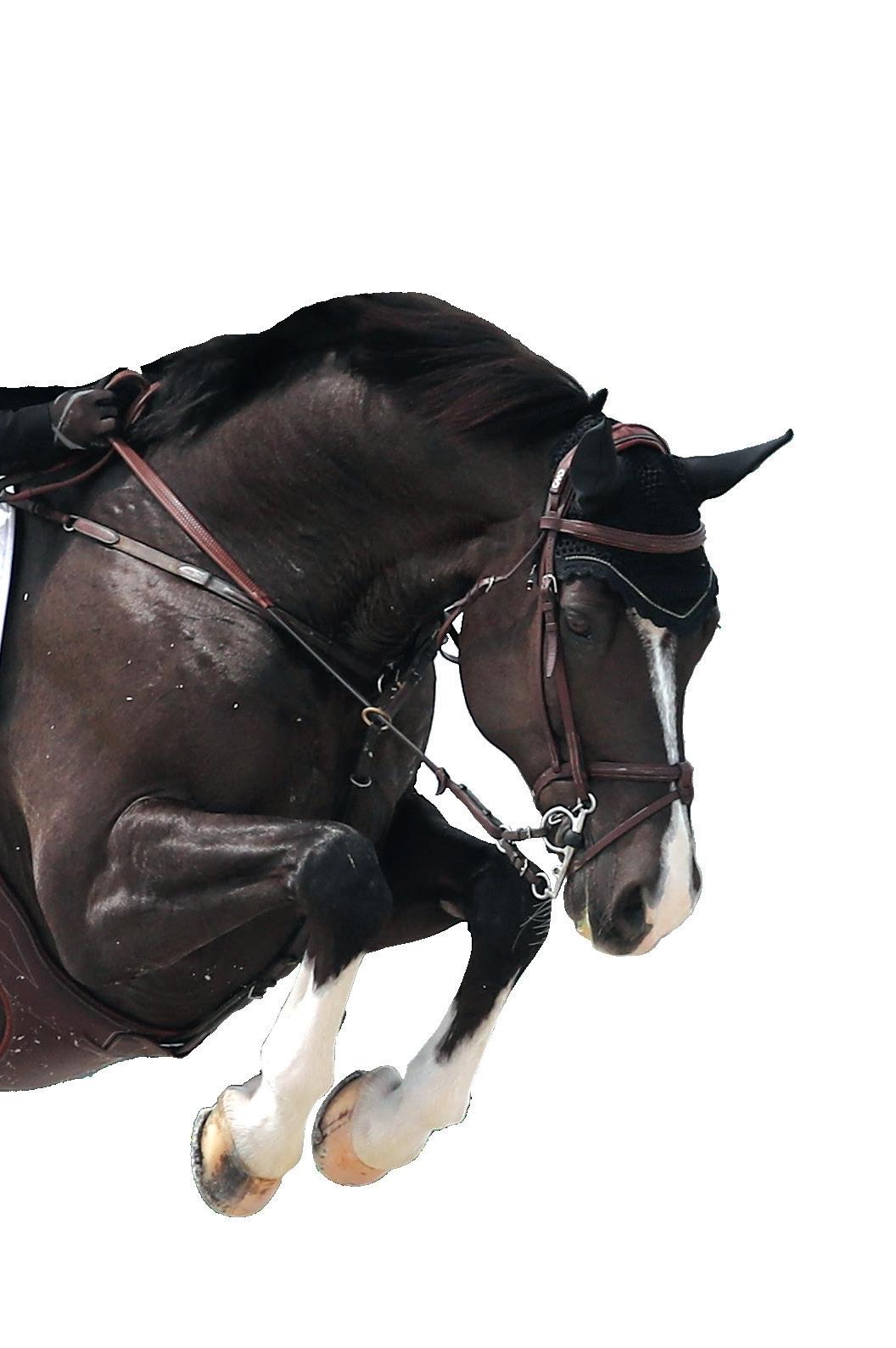
Zen Elite Equestrian Center, located in Southwest Ranches, Florida is everything the name suggests and much more.
The state-of-the-art facility hosts a spacious covered arena, two huge outdoor arenas and a full rehab/spa.
From the cascading waterfalls in the rider’s lounge, to its peaceful statues and inviting gardens, Zen Elite Equestrian Center envelops visitors in a spa-like relaxed atmosphere.
But Zen Elite is more than just soothing to the soul. The facility is unique in its scope, hosting grassroots dressage and jumping lesson programs in the same arenas where international trainers are preparing for national and world competitions.
Owner, Heidi Humphries’ vision is legendary, in that it supports the future of horse sport in the spa-like serene atmosphere that is Zen Elite Equestrian Center.


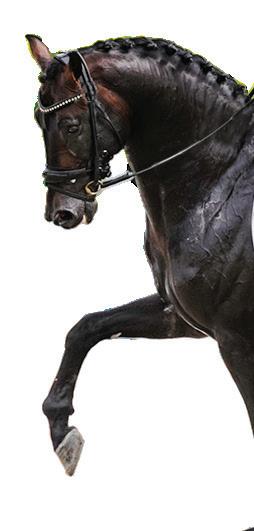



Unlike other products that only mask odors, Odaway eliminates them completely, leaving behind a fresh, clean scent.
• The Best Solution for Anything Stinky Because it’s Highly Effective & Easy to Use
• For Use in Pyranha SprayMaster® Systems
• Spray it on Those Hard to Wash Items
• Safe for Use Around Children & Pets, Making it a Great Choice for Families
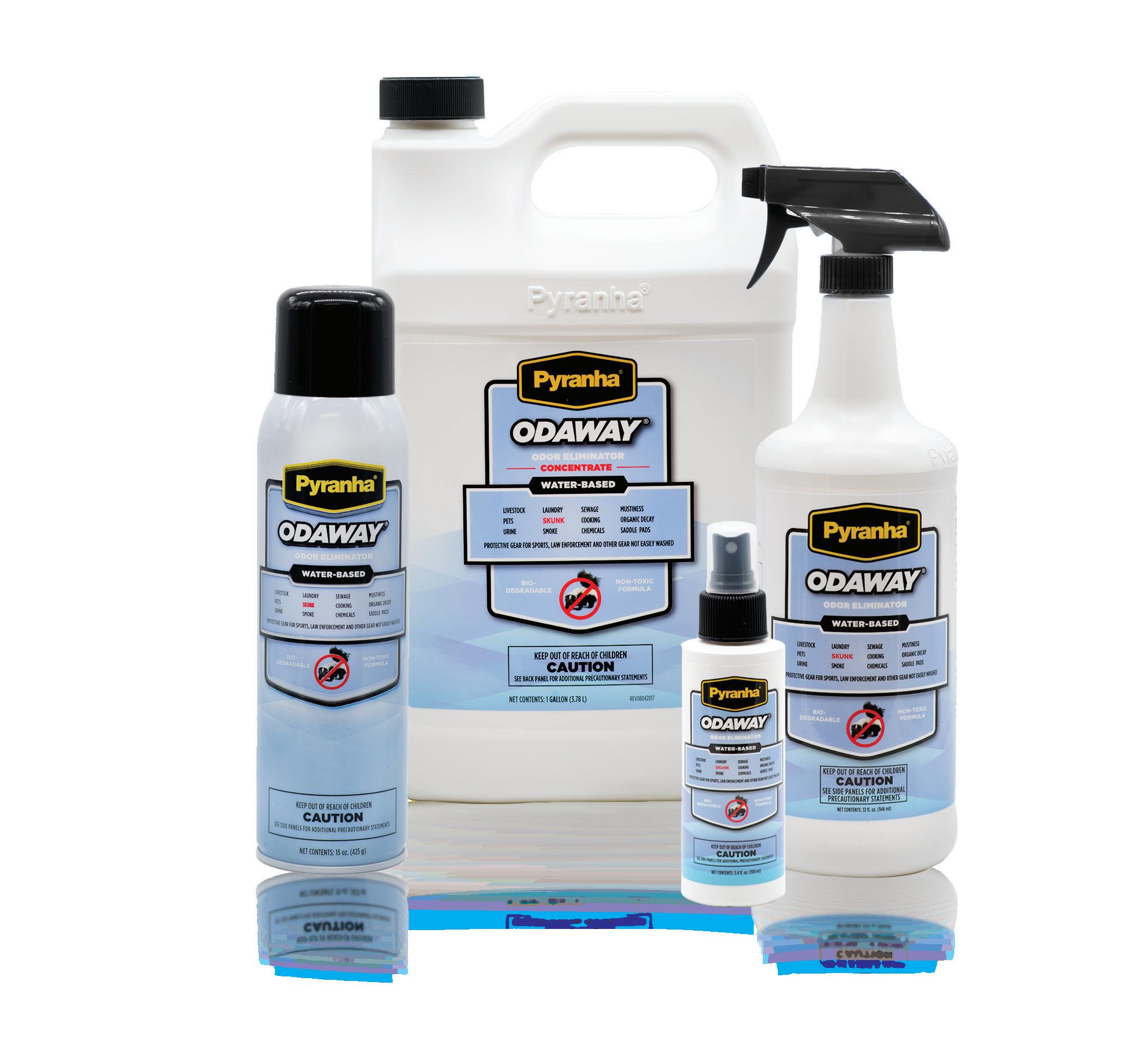




Para driver Chrissy Aitken, who competed at the 2023 FEI Para Driving World Championship for Singles for the first time this year and finished 10th overall, says horses have taught her confidence in her own abilities and brought her a feeling of freedom.
My involvement with horses didn’t begin until my sophomore year of college. There was a four-pack riding lesson package donated to a pediatric burn survivor fundraiser that I was at. It was donated by a local riding stable, Maple Crest Farm in Brecksville, Ohio. Those four lessons just turned into a continuance, and here we are today.
A little backstory: I was in a house fire at the age of five where I almost died. I grew up loving animals because they don’t judge based on looks or abilities. I’ve always had an inner drive to better myself and make the best of the situation I was given. My family background and financial situation were very limited. Unlike others, I didn’t come from a horse family.
I rode for about a year and a half. The instructor suggested I try driving, and we found that driving was easier for me because I didn’t have to focus on balancing. I could focus more on driving and the horse and not trying to hold myself up. I practiced driving for maybe a year or so, and I started doing little schooling shows for about two years, and then I started doing more true combined driving events.
With competitions, I enjoy that combined driving allows me to compete on a level playing
field with the able-bodied drivers. Most of the shows we go to don’t have a para division, so I’m in the regular class with the able-bodied drivers.
Sometimes in our sport, para driving is underrated or seen as an inconvenience to others. There are not a lot of para driving opportunities in the U.S. compared to other countries. It takes so much extra work and determination to drive and compete as a para driver than an able-bodied driver. We need extra help, and it takes a special horse to accommodate a driver’s limitations. Given the chance to compete, you will see that most of us can drive with the best able-bodied drivers. We just need more driving opportunities.
I enjoy the freedom that driving gives me. I’m not held back by my disability or limited, and when I’m in the seat with the reins, I’m like everybody else. And I enjoy the camaraderie and the friendly rivalries I have developed over the past couple of years. Traveling to new places is fun, too. I had never been out of the country until this year.
With horses, I have learned confidence in my abilities. I’ve learned to be patient because things may not always go right the first time. I’ve learned to trust—trust in the horse’s ability and

for the horse to trust me. And I’ve learned to be a more outgoing person. I’ve always been extremely shy. With horse shows and horses, that’s not allowed, especially to get the support I need to get where I am right now.
My first horse was given to me to compete and have my own horse. I had always borrowed horses. He was the first horse that was actually mine, and I could do what I wanted without having to worry about somebody else using the horse. It was another driver who donated him to me, but she doesn’t want credit for it. I was in disbelief because every little girl dreams of having a horse or finding Prince Charming. His registered name is Prince Charming, so I found my Prince Charming, just not in the form of a man, but better.
“Prince” is a 17-year-old Hackney gelding who is 16.2 hands tall and is full of love. I have owned him for almost four years. He’s very easy going. I could do pretty much anything with him, and he would go with the flow. He has the biggest heart and always tries his best even when he’s not 100% sure about what I’m asking.
“I DIDN’T COME FROM
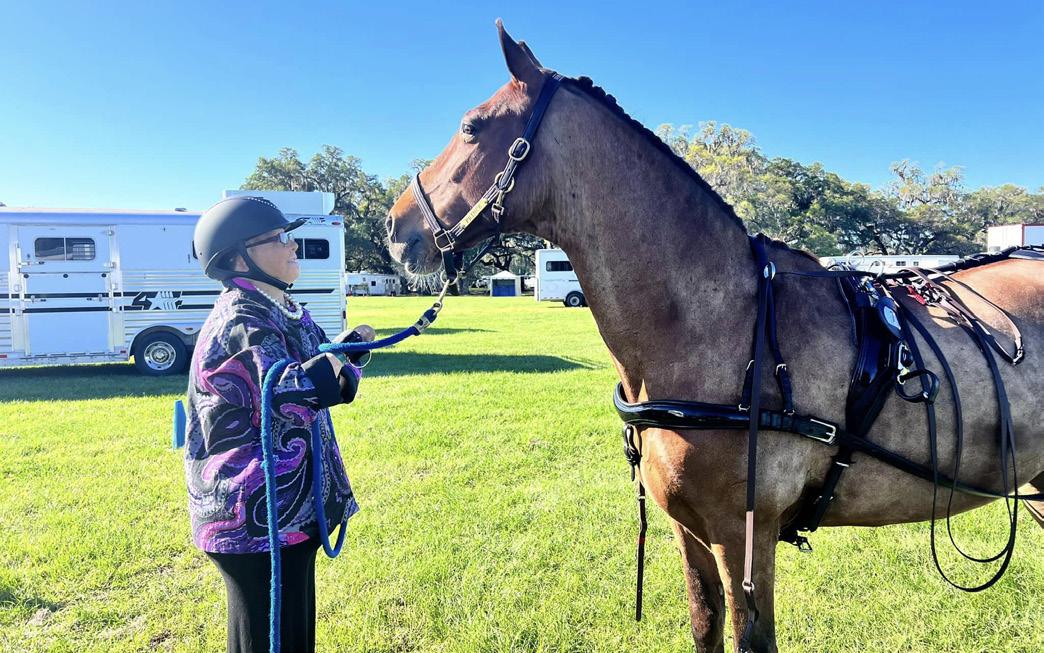
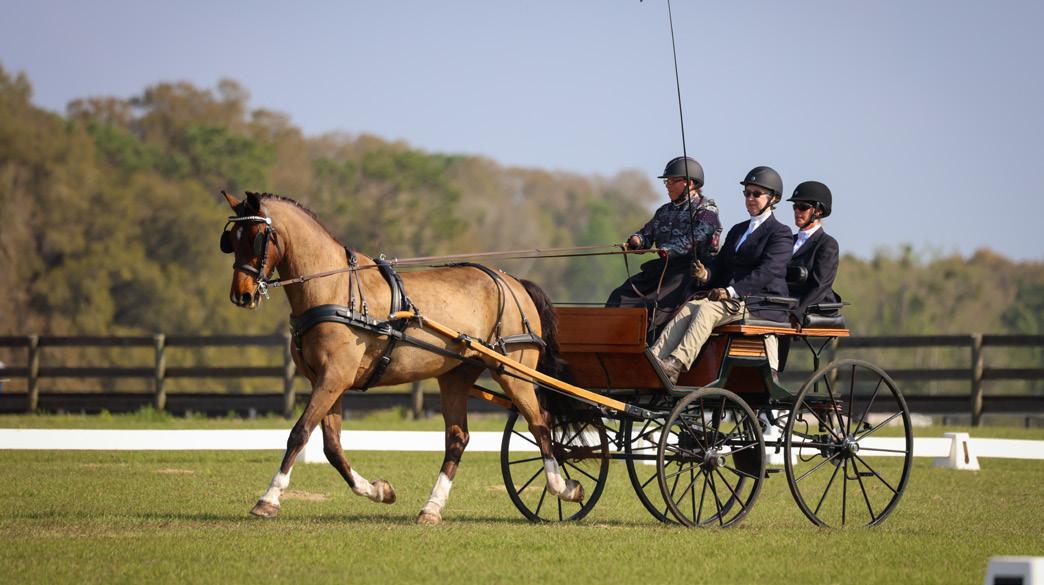
Right: Chrissy Aitken spent three weeks getting to know Gerritje, her leased horse for the 2023 FEI Para Driving World Championship for Singles, before the start of the competition.
Top left: Chrissy Aitken and her Hackney gelding Prince Charming share a quiet moment at a combined driving event.

It takes a special horse to be a para driving horse. They have to be patient and soft. I have limited movement to give to allow Prince to stretch, so he has adjusted to my driving abilities and continues on, even when I can’t regulate rein pressure. He is my unicorn. He is just magical with me and one of a kind. His younger years brought him some battle scars, and my younger years brought me my battle scars. We just understand each other.
Heading to the 2023 FEI Para Driving World Championship for Singles was very short notice. It was on the radar for future years. And then, in March, my trainers and I decided we’re going to go for this year. It was a couple of months trying to raise all the funds, get a horse in line, and figure out travel plans. I wanted to be able to be on the same team as my fellow para driver and mentor, Bob Giles. He’s been encouraging me since the beginning, and he is one of the main ones who encouraged me to compete as a para driver.
I remember seeing Bob at a derby at Grand Oaks Resort in Weirsdale, Fla., in 2018 or 2019, and he walked up and said, “Who are you, and why aren’t you out here driving?” I was still doing local shows back in Ohio, and I was on vacation in Florida for two weeks to see how it all worked. He had me walk the hazards with him and showed me how he would drive them and how a hazard actually worked. Then he said I should look into para



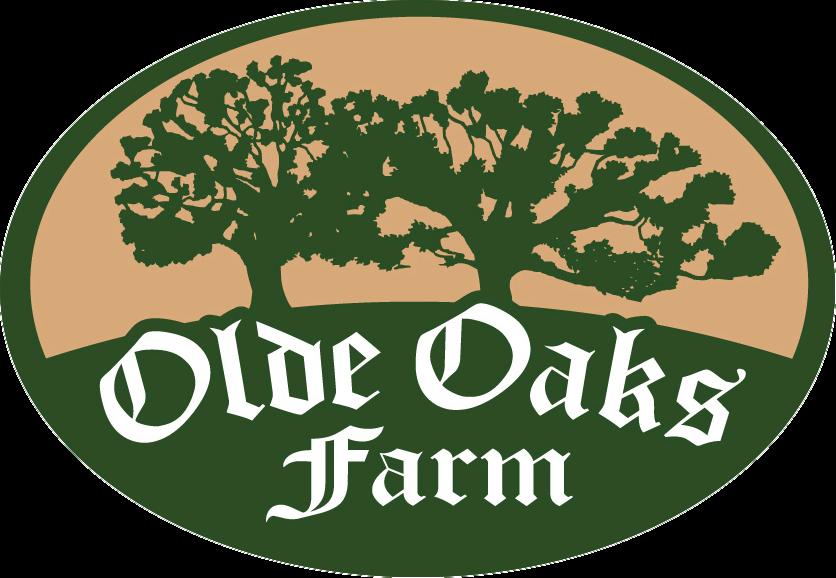
“I ENJOY THE
ME.”
driving, and I needed to be on his team. And it kind of went on from there.
The ability to compete in combined driving—let alone in the world championship—was only possible financially through donations and support from many friends, fellow driving enthusiasts, and some strangers. It was only possible physically through the support of trainers, coaches, and friends—mainly Kristin Whittington, Stacey Giere, Tracey Morgan, Marcie Quist, and the anonymous donor of my horse, Prince Charming.
For the world championship, I was in Europe for about five weeks. I leased a horse in the Netherlands named Gerritje—I called her “Gigi”—owned by Kim de Groot and Heidi Martens. It was a learning curve—new horse, new language. The horse was learning English at the same time as trying to learn my body movements. She was bigger than I’m used to, and I couldn’t really see over her head, so that was a little bit of a struggle. But it all worked out.
Leading into the world championship, I was looking forward to being considered as part of the U.S. team. Although I was technically an individual, it’s a huge accomplishment. Just overcoming my background, where I came from, overcoming the physical limitations, overcoming what doctors and society said I could and could not do, and overcoming the financial limitations means so much. I like proving people wrong. I feel like if you have a disability, society automatically has one view
of you. I wasn’t supposed to live past 24 hours because of the severity of my injuries when I was five. I’m 34 now, so I’ve just continued to prove people wrong.
Horses and competing make me happy. Growing up I was always told what I couldn’t do or what I wouldn’t ever achieve. I can drive horses and compete. It turns out I’m also good at it. It also allows me to be a role model for someone else in similar situations as myself.
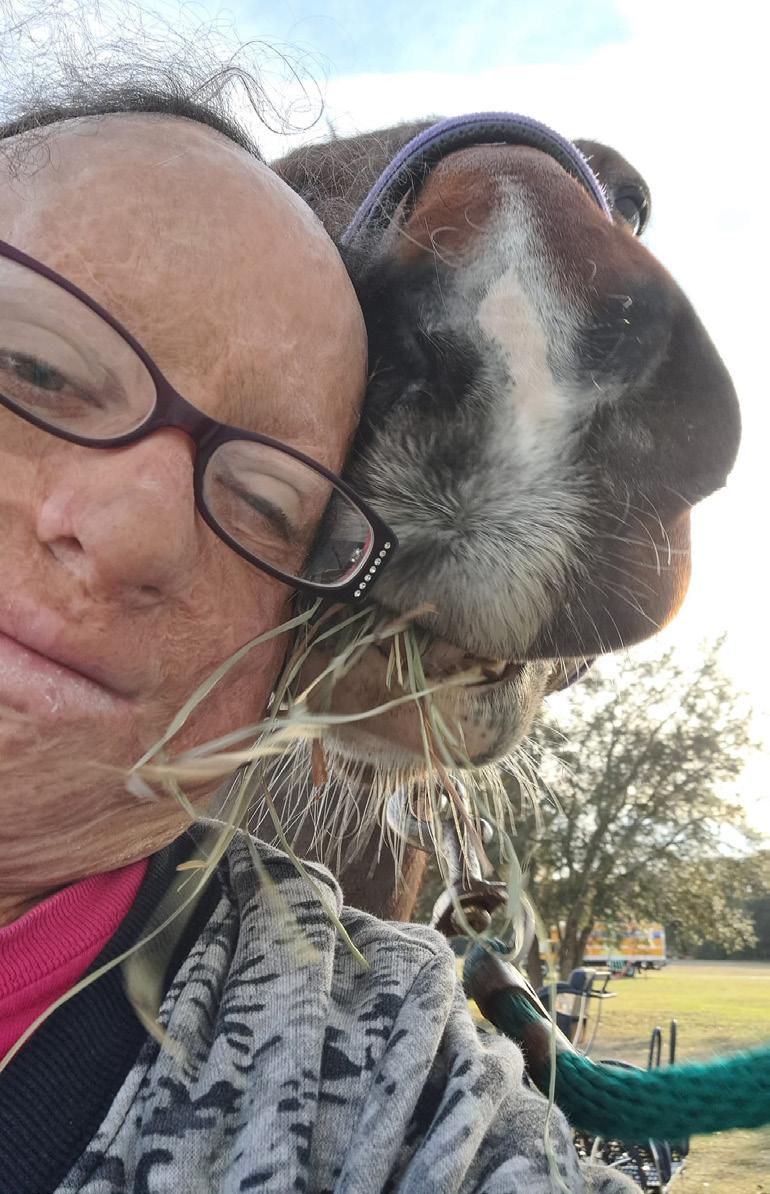

Chrissy Aitken says that her Hackney gelding Prince Charming is “full of love.”
Chrissy Aitken and Gerritje compete in the driven dressage phase of the 2023
FEI Para Driving World Championship for Singles in Exloo, Netherlands.


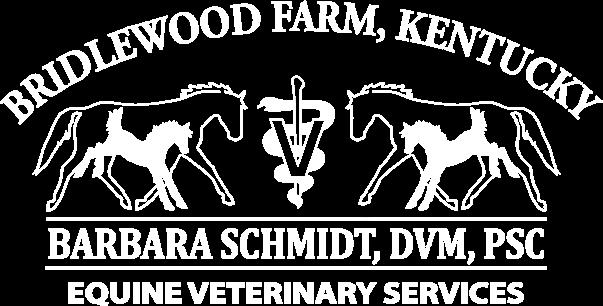
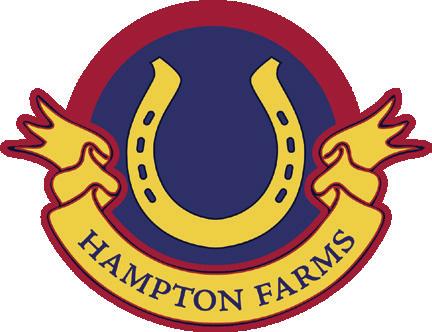





 Pictured with Paul O’Shea (IRL)
Pictured with Paul O’Shea (IRL)
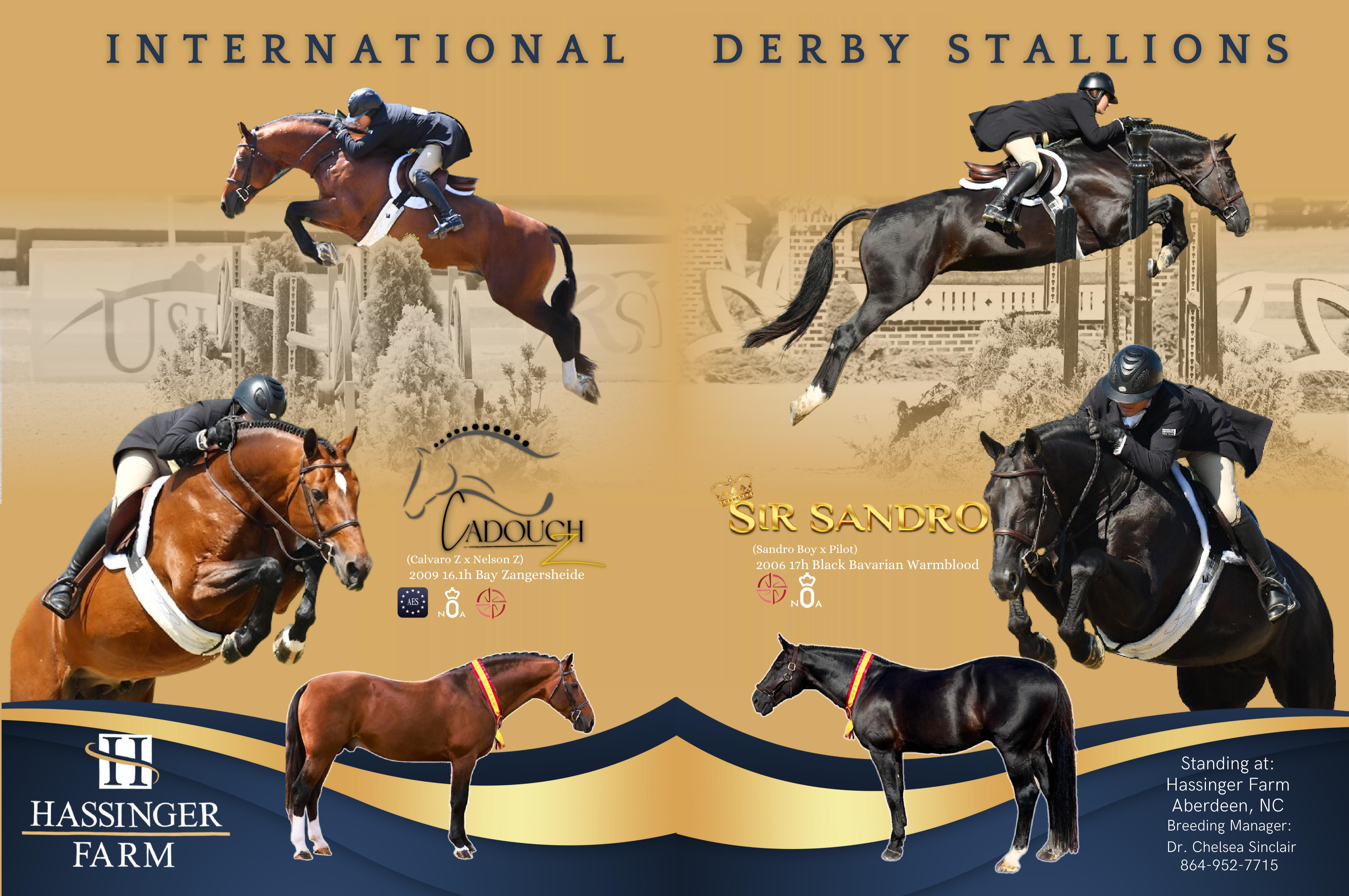

Updated styling, fresh colors, functional durability, and cozy warmth will put these pieces at the front of every equestrian’s closet–and on top of many holiday wish lists!—this season.
Ariat understands: you love the sleek, chic look of the equestrian lifestyle, but in winter that lifestyle also can involve cold after-work rides and trooping out in a muddy paddock to catch your horse. Ariat’s equestrian apparel is rider-tested by horse people for horse people, so they’ve literally got you covered, and their barn-friendly outerwear is proof that you don’t have to compromise on good looks just to stay warm and dry.
You can’t slow down just because the seasons change, and the key to staying warm and dry for winter work starts with good foundation layers. The ultra-versatile Lowell quarter-zip is the perfect base layer for any season, with recycled stretch jersey fabric that moves with you for all-day comfort. The Tri Factor Frost insulated breech has superior stretch, moisture-wicking fabric, and slimming compression in a warming fleece.
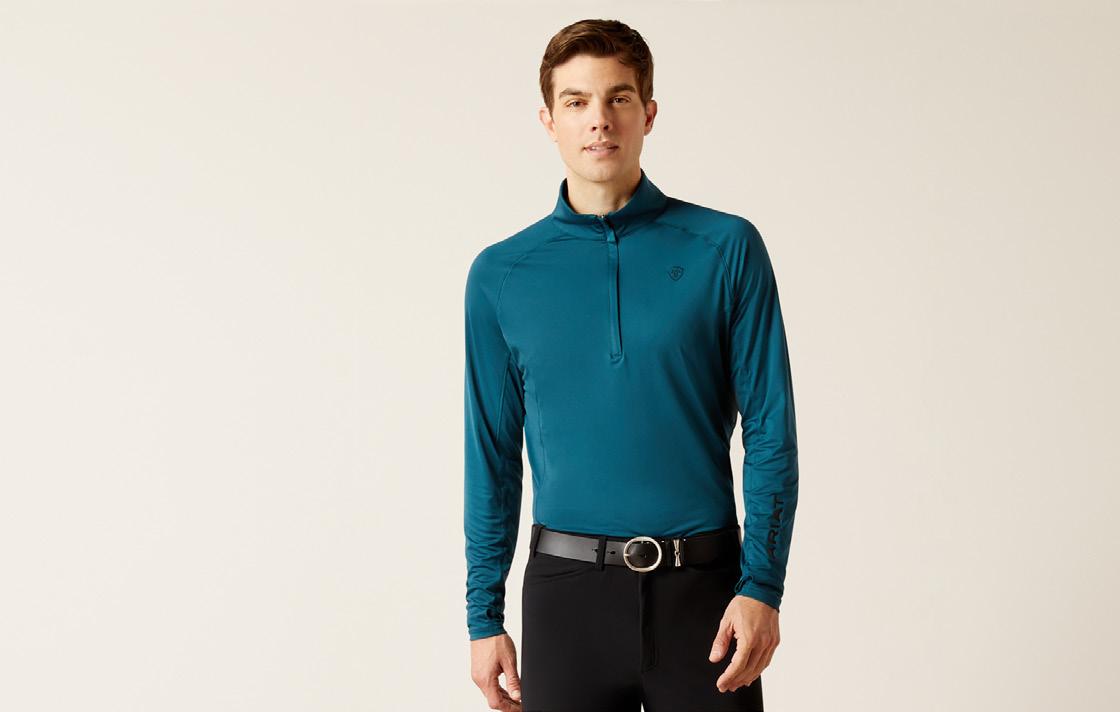

The Zonal insulated jacket warms your body and your conscience: crafted with recycled materials, it’s earth-friendly from its PrimaLoft® Black Insulation Eco interior to its water-repellant PFC-free EcoDry™ finish. A removable hood and two-way zipper complete the package on a jacket that’s as comfortable in the saddle as it is enjoying a coffee at the local cafe with your barn family. Pair it with Ariat’s iconic Heritage waterproof paddock boot—now with a Thinsulate™ lining—and the next-generation midweight Avail half-grip riding tight with high-performance compressive stretch fleece and InfraTEK™ for reliable, lightweight warmth in the saddle. And add a cheery pop of color with the Midlands beanie, lined in comfy, warm, super-soft fleece.

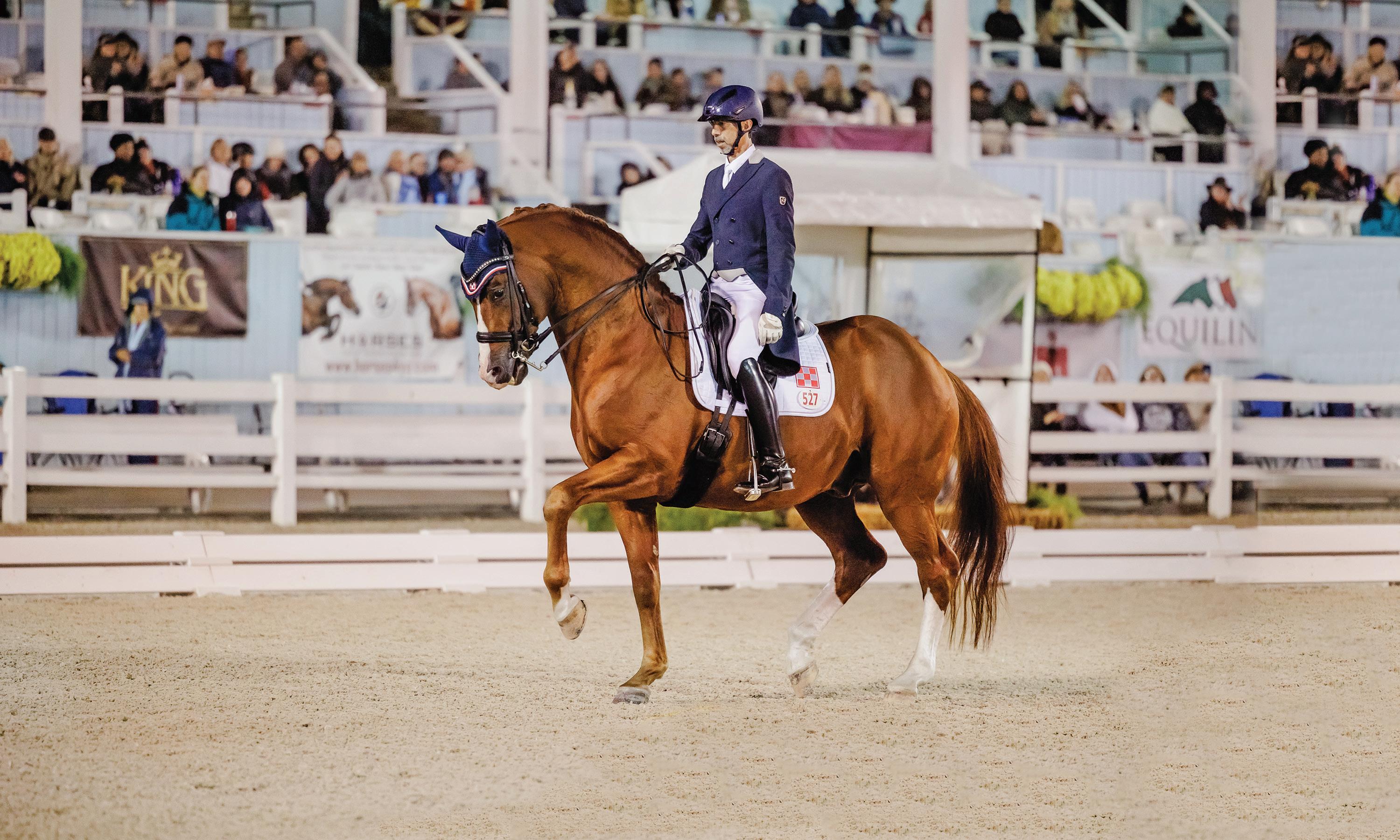





Start with a timeless classic: the buttondown Clement flannel shirt has a slim European fit whose good looks complement its easy comfort. The Clement is wrinkle-free, so it’s ready to go when you are—no fuss, no hassle—and starts your day of right.
The Millbrae vest is an all-season staple, perfect to wear under a jacket for your sporting pursuits or in the barn office. Crafted with an ethically sourced wool blend, the Millbrae also offers functional details like front pockets and a zippered chest pocket.
Top it off with the lightweight Stinson shirt jacket, a three-season layer you’ll reach for time and again. This hard-working jacket features a 100% recycled polyester shell with EcoDry™ finish and a protective (and warm) PrimaLoft® recycled insulation to vanquish the elements.
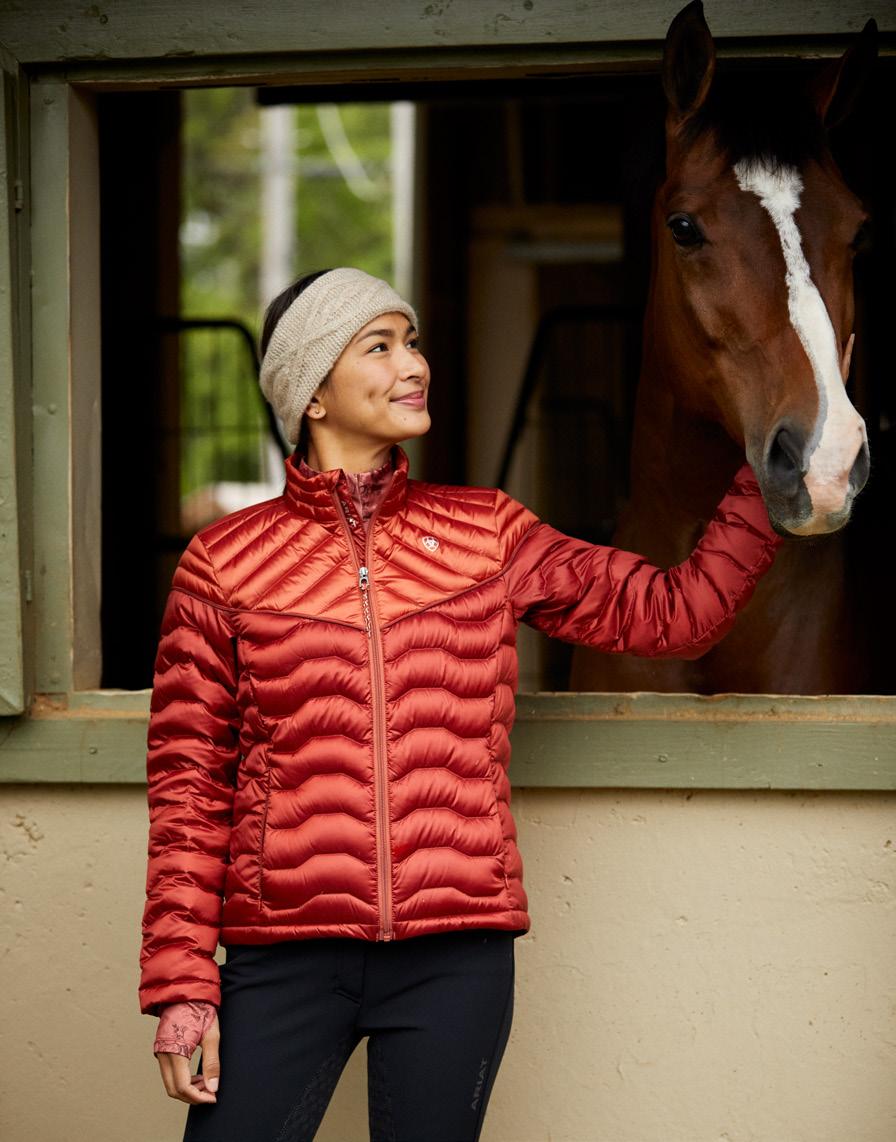
The Ideal down jacket has always been a head-turner. Its attractive quilt styling and gorgeous range of colors add a sophisticated touch to a piece that’s warm and hardy enough to be a winter barnwear staple. The ethically sourced down insulation keeps you prepared for the elements without the need for heavy layers.
The Tri Factor Frost breech is this season’s must-have, bringing fleece insulation to your favorite, most slimming breech—keeping

you toasty in the saddle even as the thermometer dips into the lower digits. And who doesn’t love a nice ear-warmer on those cold winter mornings? The fleece-lined Entwine headband is sustainably made with a recycled poly-blend knit that keeps frost out and looks great doing it.
Meet your match, winter mud. The Extreme Pro paddock boot and tall boot stand up to everything winter throws at them: icy puddles, snow, and muddy gateways. Part of the innovative Climate Control Collection, the Extreme boots have superior insulation and waterproofing that hold up to the challenges of winter and work, from riding at first light to feeding on a snowy evening.

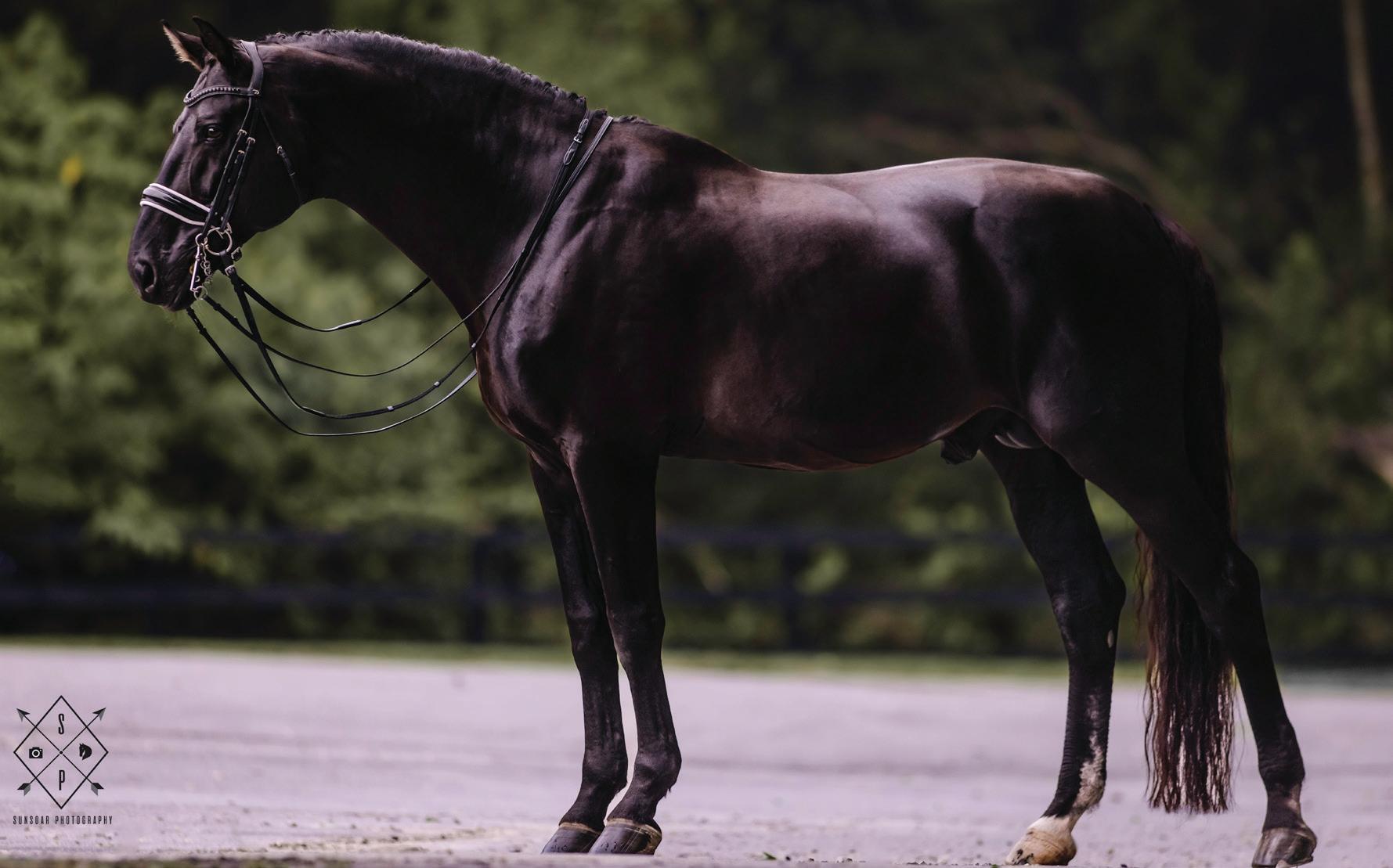
DOB 4/25/2005
Oldenburg Verband registered Lifetime breeding license ISR-Oldenburg NA and Pferdezuchtverband Baden-Wurttemberg e. V in Germany
Sire: Dr. Doolittle ( Donnerhall ) Dam: Cheri III ( Rubenstein I x Corlando )
Under 25 GP horse in Germany and currently going I2 preparing to go GP with current AA rider. Extremely easy going, excellent manners, best behaved horse in the barn, perfect behavior on and off property. First US born foal was awarded premium foal at Oldenburg inspection.

Contact: Erin Walker

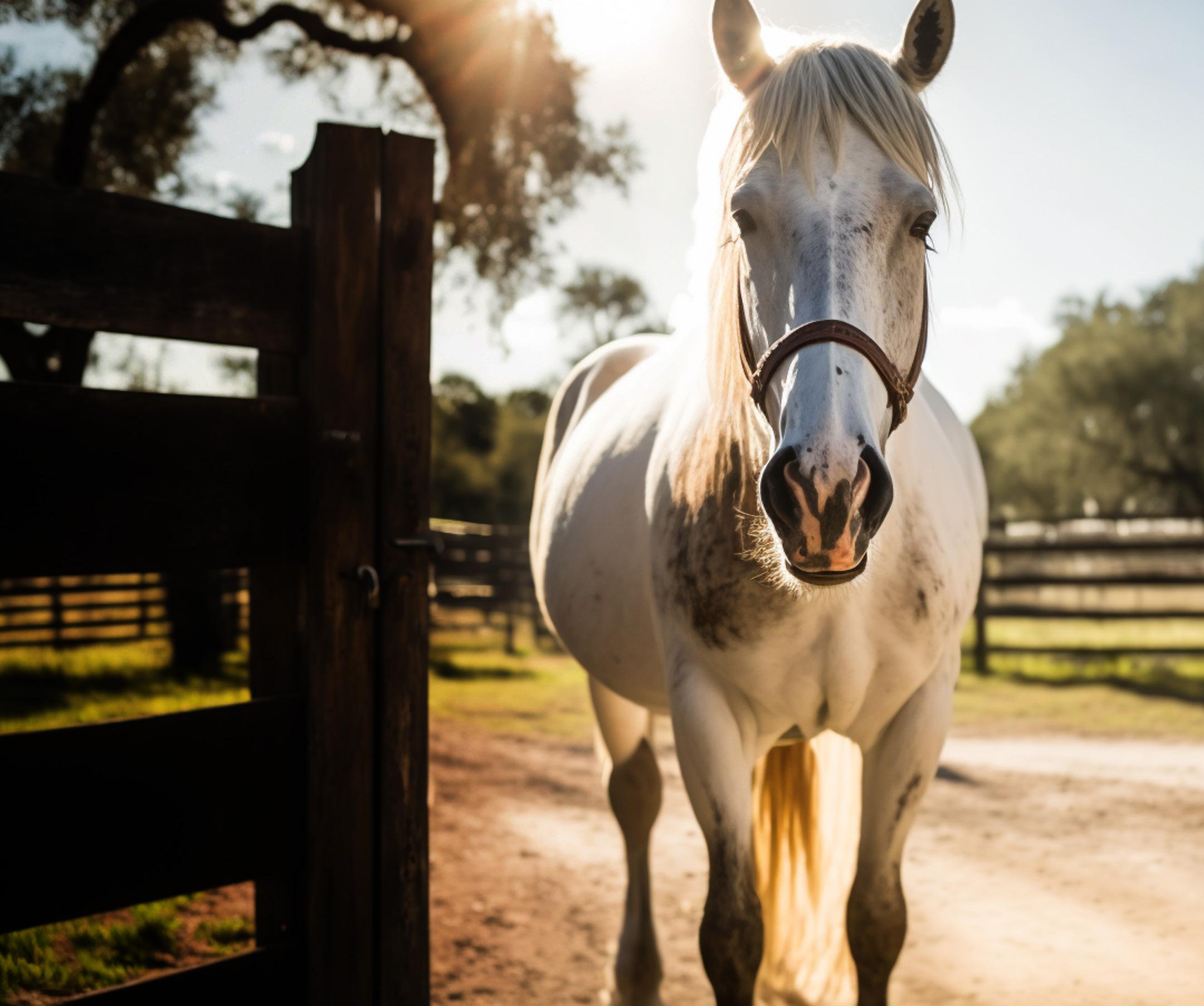
Infection prevention and environmental biosecurity are an essential part of equine care and play an important role in the practice of veterinary medicine.

Armatrex™ is an Antimicrobial solution that provides up to 90 days of an invisible and durable barrier against a broad spectrum of bacteria, fungi and viruses in an animal health setting.
• Up to 90 days of protection
• Enhances biosecurity when used in conjunction with proper cleaning and disinfection protocols
• Antimicrobial coating serves an invisible and durable barrier that continues to kill bactera after applied
• Gram + bacteria: Listeria, Staphylococcus
• Gram – bacteria: E. coli, Salmonella
• Fungi: Aspergillus, Candida and Penicillium spp.


• EPA registered spray-on antimicrobial solution for use in livestock and companion animal facilities
• Electrostatic technology provides uniform coverage of treated surfaces, decreasing product waste
• No need for mixing or measuring, ready to administer formulation
• ByoPlanet is the recommended delivery system for 360° complete coverage with less waste and quicker re-entry into the environment.
• From delivery trucks and silos, to veterinary clinics and quarantine pens, ByoPlanet and Armatrex is made to fit any operation’s biosecurity needs.
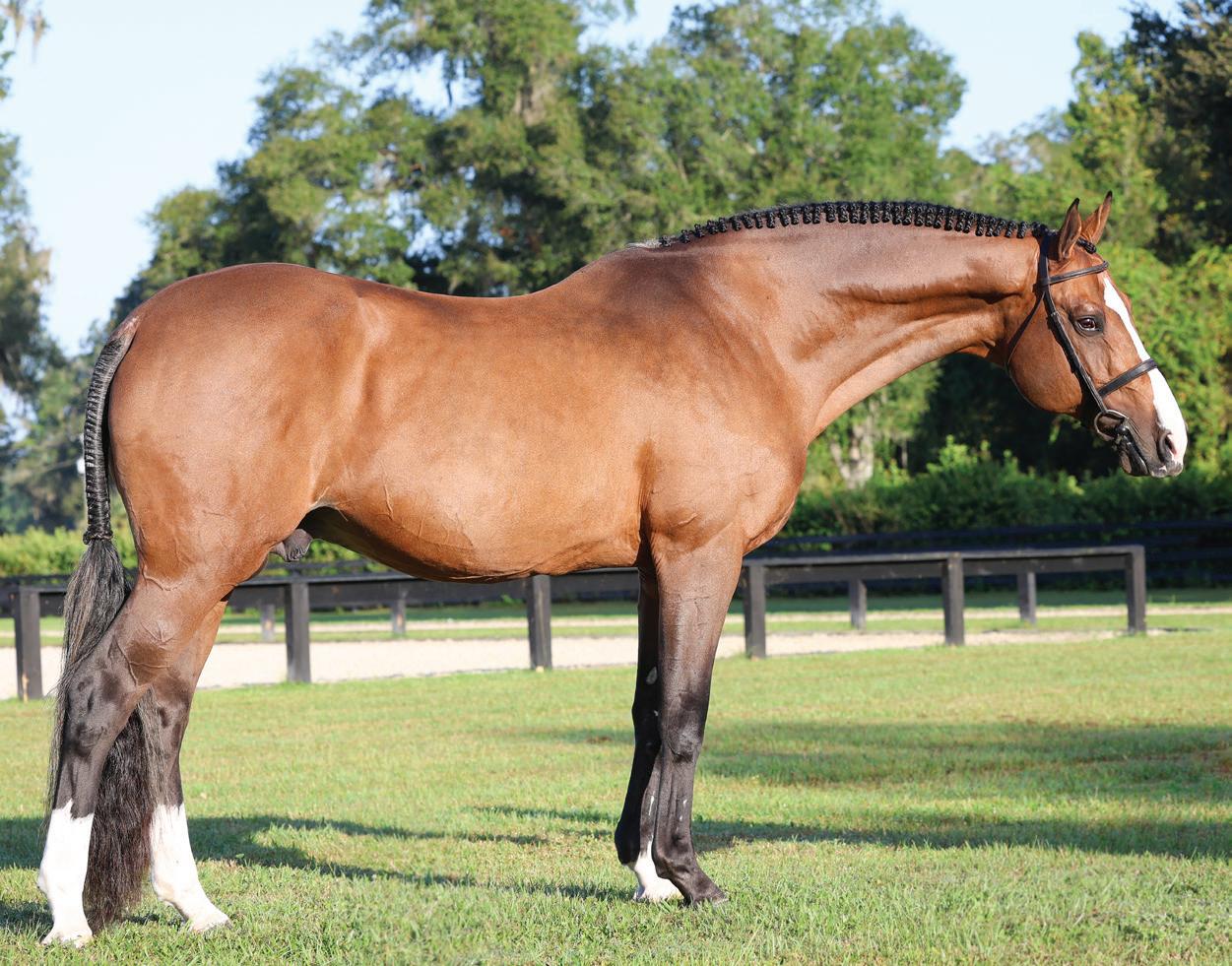
Carrico is an exceptional Holsteiner by Catoki out of Kapitale with notable equitation, jumper and hunter offspring. Fresh and frozen available. Frozen $1,350 per dose, 90 day-in-foal $1,800, LFG $2,300.
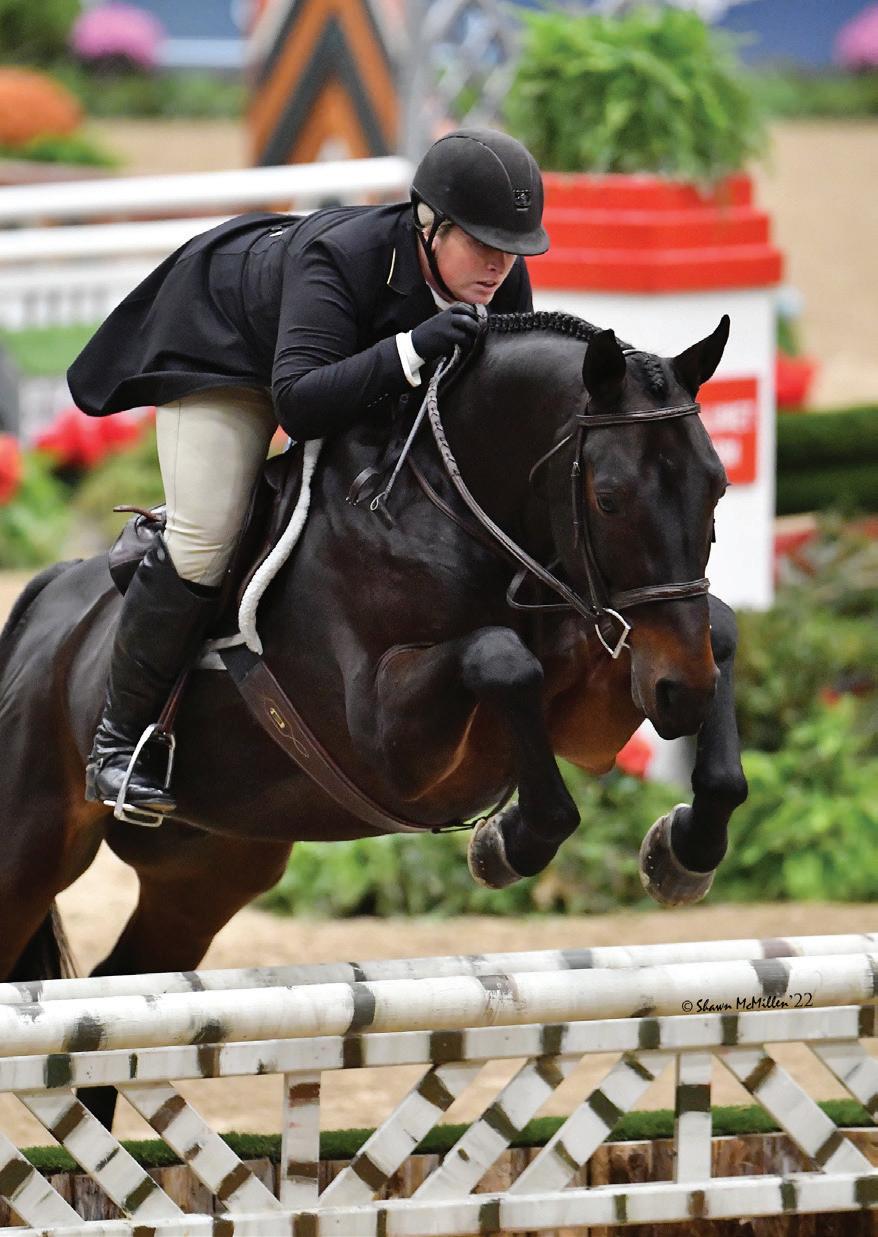

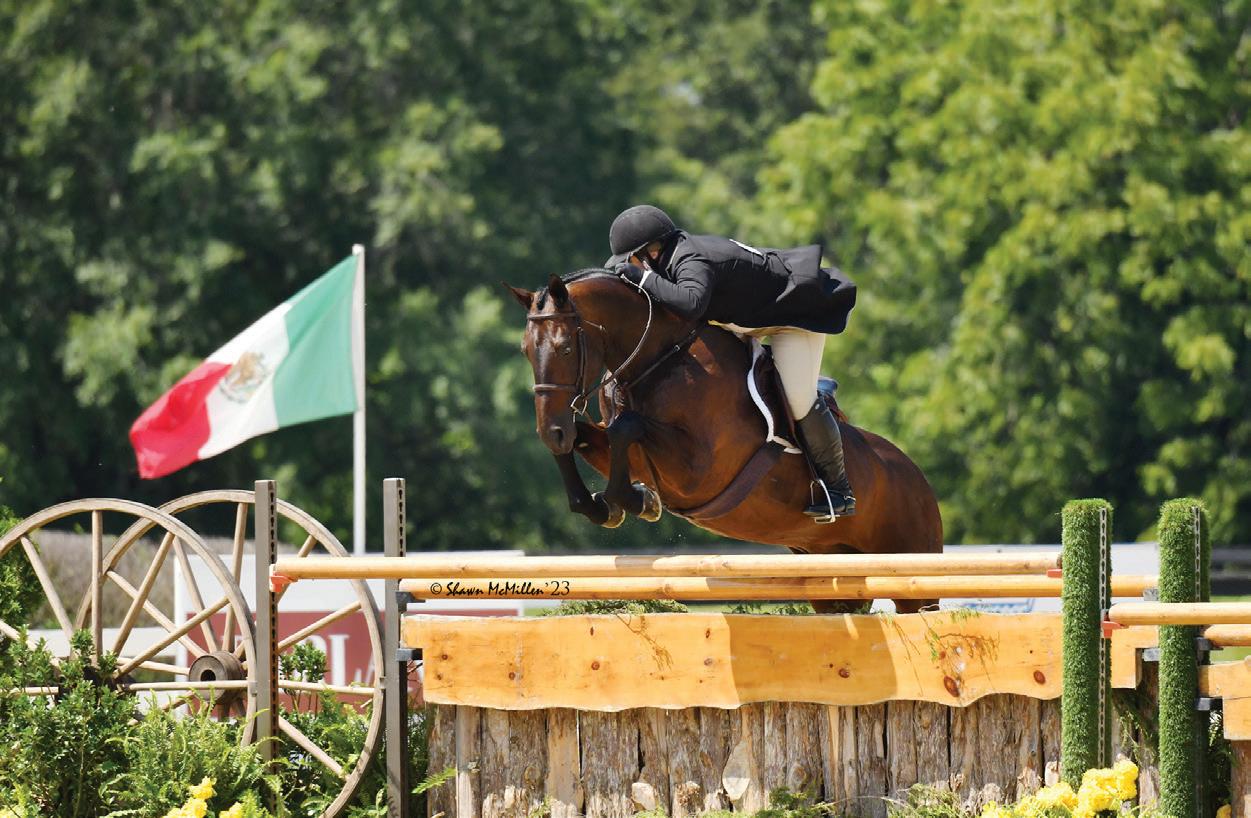
Diamante by Diarado out of Kampari W is an exceptional hunter with wins and top placings at the most prestigious shows, including wins and tricolors at Capital Challenge, the Winter Equestrian Festival, and a 3rd place finish at the 2019 USHJA International Hunter Derby Championship. Frozen available for $650 per dose.


Staying focused in the heat of competition can help you optimize your performance. In this excerpt from her book “Winning Habits: How Elite Equestrians Master the Mental Game,” equestrian coach Annette Paterakis offers some exercises to train your brain to tune out distraction and find your flow.
by Annette Paterakis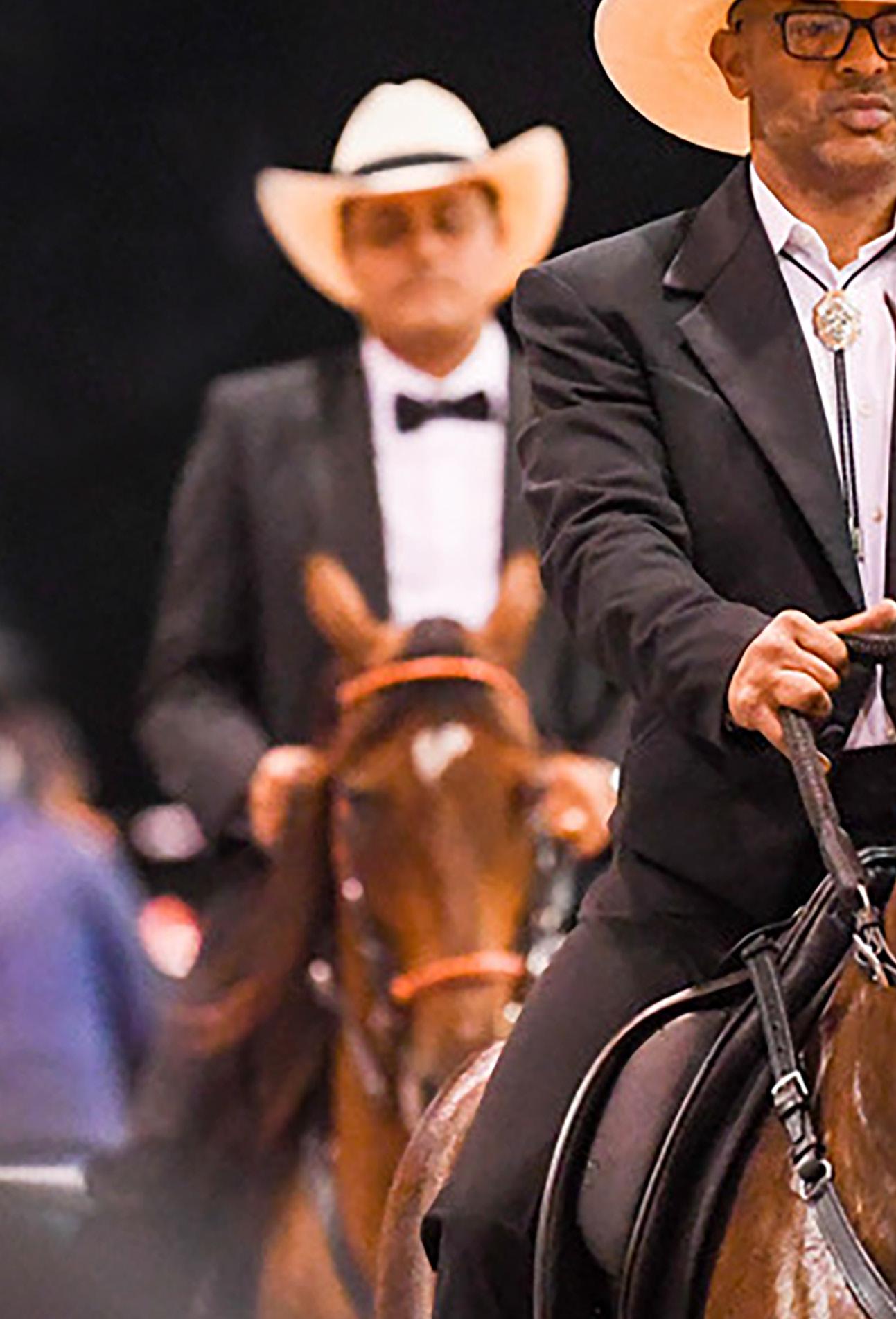
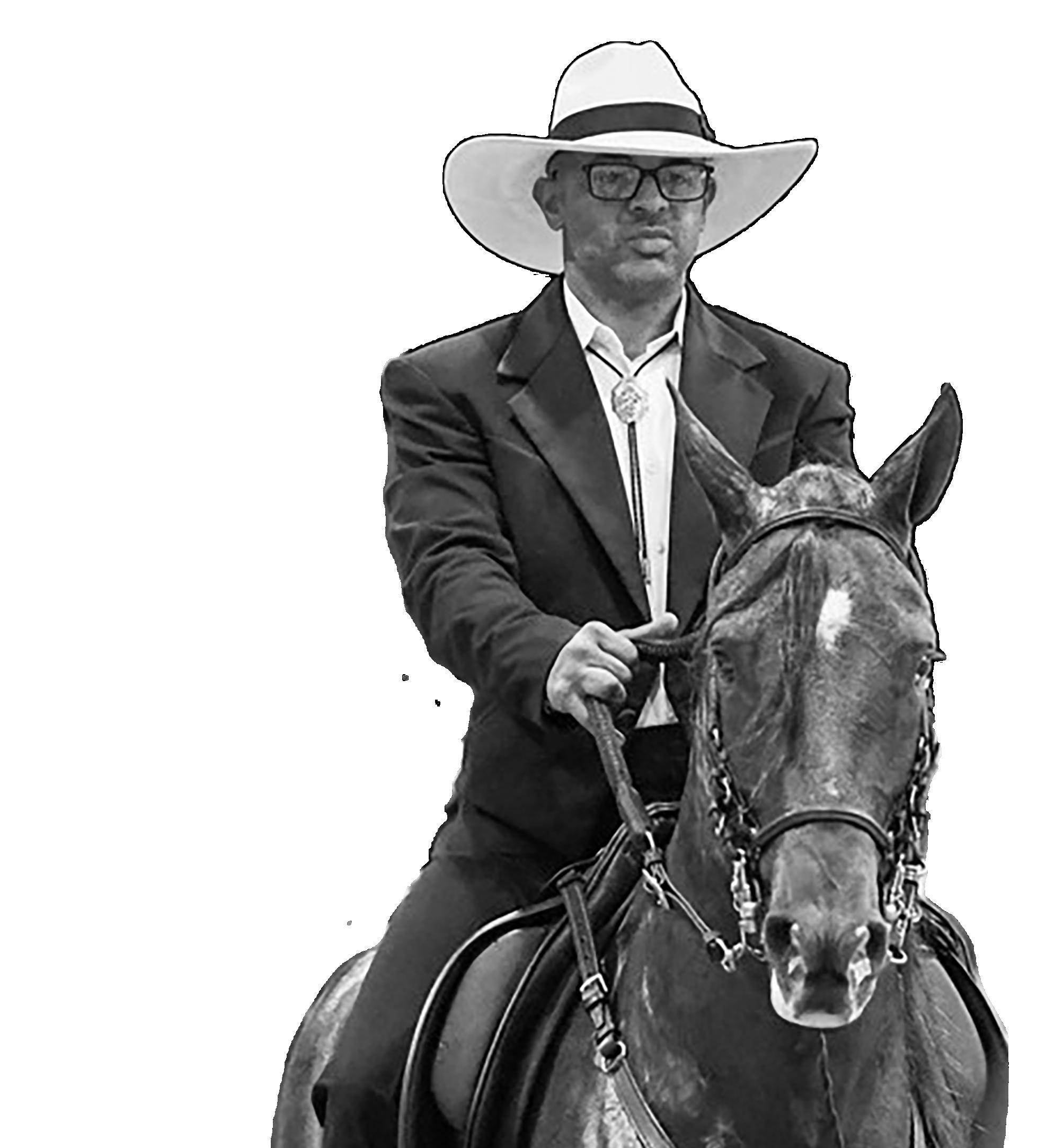
When I speak with top equestrian athletes about the keys to their success, a number of patterns emerge. One of the most important elements is an athlete’s ability to focus in the moment, tuning out the distractions that can interrupt their concentration and waste mental energy on things they can’t control, to the detriment of their performance.
In order to stay laser-focused in competition, you must prepare as best you can, be organized, and focus on the process and on what you can control. Being able to do all this requires incredible awareness and the ability to catch yourself when you begin to lose focus. Once you have become distracted (which happens to all of us, including the ones at the top), beating yourself up or thinking about what happened will only contribute to the distraction. Instead, it’s key to immediately get back to the focus point. Think one step at a time,
The ability to tune out external distractions and concentrate on your horse and the job at hand will contribute to better competition performance.
one jump at a time. Only in the present moment are we able to feel the horse moving and fully absorb the big and small messages it’s trying to convey. A focused mind directs our every move (and thought), and luckily we have full control over what we decide to focus on. Being focused means you are aware of what you’re paying attention to. If circumstances, distractions, or results still govern your focus, in order to maximize each opportunity in the arena, you must train your brain to consciously choose in each moment what to concentrate on.
Ironically, the first step to being able to refocus your attention is to be able to spot that you are distracted in the first place. The sooner you are able to do this, the sooner you can refocus and get back on track. An untrained mind will keep
going from one thought to the other or keep getting distracted by different stimuli. So how do we train this wandering mind?
There are many different ways in which we can train our brains more efficiently. Let’s explore four ways of focus training together: meditation, breathing exercises (which are also a form of meditation), reading, and other exercises to actively train your brain. Regardless of which method you choose, they all have these two key elements in common:
• You focus on one or a maximum of two objects only.
• Whenever the mind wanders or gets distracted, you bring it back to its point of focus.
One of the best ways to train attention is with meditation. There are many types and forms of meditation, and many studies note the benefits of meditating. One of those benefits is a change in brain structure, in particular in the maestro himself—the prefrontal cortex.
Sara W. Lazar at Harvard University conducted a study in which she compared people who are regular meditators with people who never meditate, and she found some interesting differences. The grey matter, in the prefrontal lobe especially, was bigger among the meditators in comparison to the non-meditators. In other words, practicing meditation helps to strengthen those areas of the brain that help us concentrate and focus better. In another study done by Lazar on meditation and its impact on the brain, the amygdala, the structure of the brain that responds to stressful and dangerous situations, actually decreased in size when the participants meditated often. The more participants reported a reduction in stress perceived, the smaller the amygdala became.
Meditation is not the most commonly used word within equestrian sports (yet), but looking at the research, the benefits of meditation are undeniable and worth exploring.
One form of meditation I personally love and always share with my clients is breathing meditation, although I prefer to call it a breathing exercise. If we are always on the go or on
auto-pilot, sitting still and focusing our attention on our breath for 10 minutes can be challenging at first. However, if we focus on one day at a time, we will start to feel the benefits, and it becomes easier to continue building this habit.
The breathing exercise is two-fold. First, you get comfortable (with a posture that will help you stay focused, like sitting up with a straight yet relaxed back, for example). Then breathe in and out while paying attention to your breath. Ideally, you take deep breaths in toward your lower abdomen; you can imagine you have a balloon in your abdomen and are filling it up with air. Then, at some point, the second element of the focus training will kick in, as you will notice at some point that your mind has wandered off into thought. The only thing you need to do in that same moment is to recognize you are distracted and direct your attention back to your breath. Notice any thoughts of frustration or judgment about your mind wandering, as they, too, are important to be aware of. However, there is no need to judge. This is what the mind does. We have between 50,000 and 70,000 thoughts a day. Our mind constantly wanders from one thought to the next. Part of this exercise is to strengthen your prefrontal cortex by noticing that you are distracted and bringing your attention back, over and over again.
The days where you feel total bliss when doing this and find it easy to stay focused in the moment are great. But just as great are those days when you need to direct yourself back a million times, as this is what the mental workout is about. Like lifting weights at the gym, you are strengthening your mind.
The reason we breathe deeply into the abdomen is that it helps to create a perfect balance between the body and the mind that we call coherence. When we are stressed or in a fightor-flight state, we usually tend to breathe very shallowly, high up in our chest. When stressed for longer periods of time, this short way of breathing becomes a pattern. If we instead wake up every morning and practice for 5–10 minutes to bring that breathing lower into our body and allow ourselves to breathe more slowly and deeply, we train our body and mind to get into a coherent state more and more quickly. When trained for a few weeks, we can now start to use this whenever we need to stay more alert, calm,
In order to stay laser-focused in competition, you must prepare as best you can, be organized, and focus on the process and on what you can control.

 PHOTO: SHANNON BRINKMAN PHOTO
PHOTO: SHANNON BRINKMAN PHOTO

“YOU MUST TRAIN YOUR BRAIN TO CONSCIOUSLY CHOOSE IN EACH MOMENT WHAT TO CONCENTRATE ON.”
1. 2. 3. 4. 5. 6. 7.
Sit or lie down in a comfortable position with your right hand on your lower abdomen.
Start by breathing deeply in and out two times.
Then just follow your breath deep into your lower abdomen (without forcing it) toward your hand (feel how your hand goes up and down with every intake and outflow of your breath).
Whenever you find yourself distracted by thoughts or noises, just go back to your breathing.
You could imagine your thoughts as if they were clouds; you just observe the clouds as they pass by, and then gently direct your attention back to your breath.
It might also help to count every intake and outflow of your breath up ’til 10 (if you lose track, start over again).
Practice for at least five minutes a day and make it part of your daily routine.
Easy Breathing Exercise #1:
1. Breathe in through your nose on a count of four.
2. Hold your breath on a count of seven.
3. Breathe out through your mouth on a count of eight.
4. Repeat four times, twice a day.
Easy Breathing Exercise #2:
1. Breathe in through your nose on a count of five (if five is easy, go up to six or seven).
2. Breathe out through your nose on a count of five (if five is easy, go up to six or seven).
3. Repeat five times, twice a day (or however often you like).
and focused. When riding, the breath can guide us back to the moment, and from there we can extend our focus to our horse and the movement beneath us. This helps to stay more connected with our equine partner whenever we are riding. When this, too, becomes a habit, we will not only be calmer and focused, but also more connected to our horse and in the moment when we are at the show.
When I was younger, my ability to concentrate was poor. Whenever I was in the classroom, I would be able to focus for two minutes, and then my mind would be off as I stared out of the window, daydreaming about my horses. I’ve realized that reading is a great way of gauging someone’s ability to stay focused. In my
case, I would get distracted so often that I sometimes had to read the same sentence about eight times before I actually registered the information. This resulted in my always running out of time during exams. Luckily, I started meditating years ago, and I have made it part of my everyday lifestyle. Because of that, I have improved my focus to the point that now I can read a full chapter of a book and not get distracted (or not often anyway). So, even when starting out with poor focus skills, with the right training, it can be improved.
Other ways to train your focus is to apply the same principles I shared above to different tasks. Pick one point of focus and bring your mind back to this focus whenever you get distracted. Some examples are
1. Place both feet about hip-width apart and hold a straight but relaxed posture. Relax your shoulders, bend your knees slightly, and now shift your weight to your left foot. Lift your right foot off the ground and place it on the side of your left knee. Hold this position for two minutes. Then switch sides. When that is easy, you can extend the time or make it more difficult by closing your eyes.
2. Get two tennis (or juggling) balls and hold one in each hand. Now start throwing them in between your hands, from your right hand to your left hand. While continuing throwing the balls around, go down on your right knee, followed by the left. Then come back up with the right knee and then the left so you are standing up straight again. When this becomes easy, change it around. Throw balls from left to right, get down on your left knee first, then the right. Get back up with the left, then the right.
3. Get on top of a big exercise (often called Swiss) ball with your lower legs until you are completely off the ground with your body (shins on the ball). Find your balance and bring your upper body up straight so you can shake someone’s hand if they were to stand in front of you. When this is easy, you could throw balls from one hand to the other whilst staying balanced on the big exercise ball.
Apart from training actively with the exercises above, if you apply the same rules of quickly getting back to your focus point, you can use them and train your focus no matter what you do. Obviously, riding your horses with full focus and attention also helps train your brain.
The benefit of practicing your focus is that it helps to get into the zone when competing.







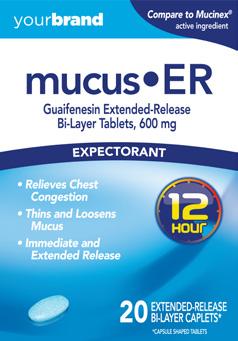
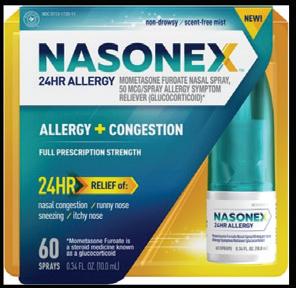
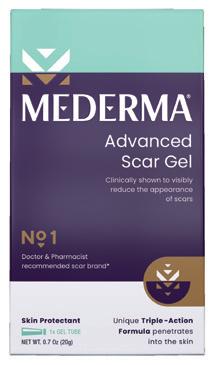


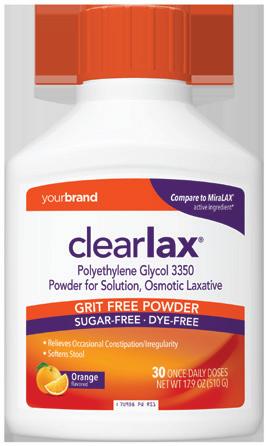

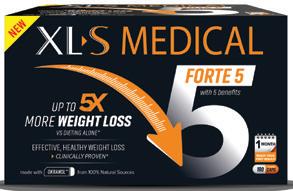





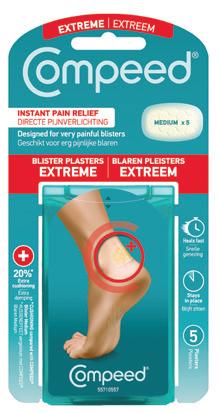




“I didn’t know I had talent,” recalled Donna Cheek (center). “I believe my trainers saw it. I knew I had passion and love for these horses.”

In
a recent interview with hunter/jumper sport historian Denise Quirk, pioneering Black equestrian Donna Cheek shared her perspective on how the art of being ready, and of understanding
the equine mind, helped her create a life with horses.by Denise Quirk
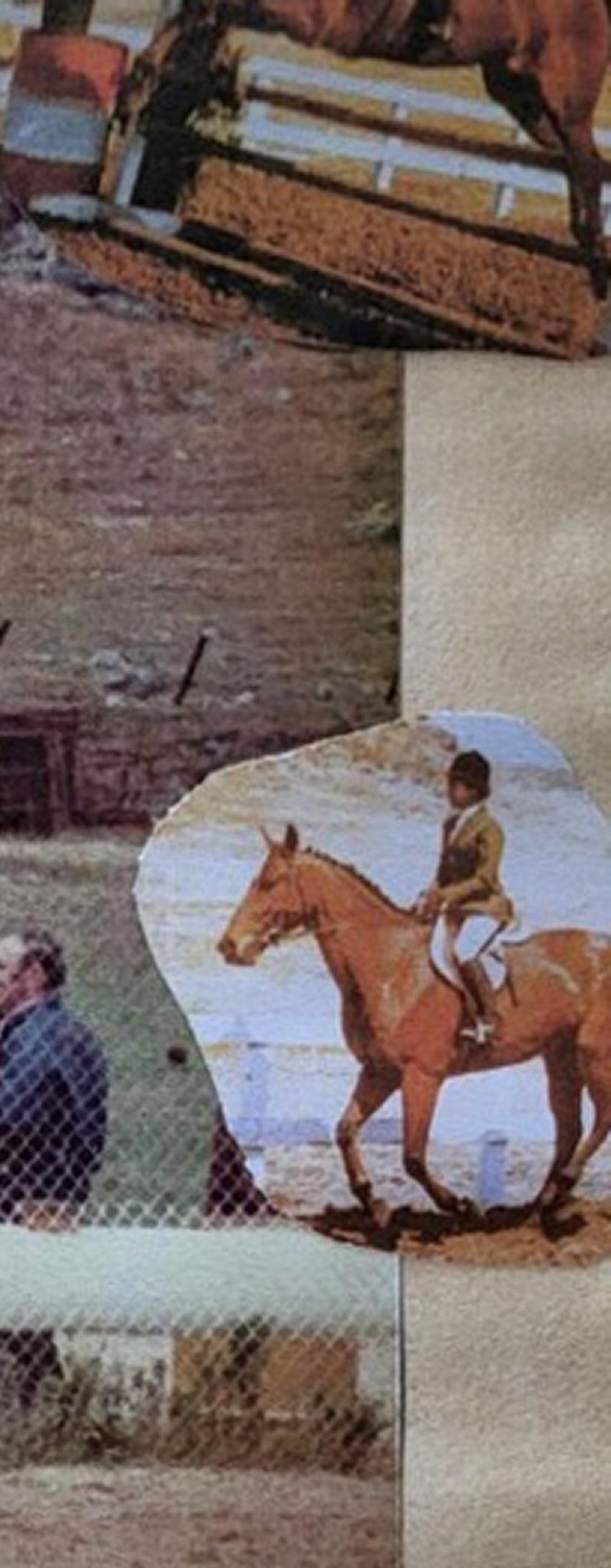
In 2022, Donna Cheek was honored with an Ethos Award, presented to Black pioneers in the equestrian world. While the Ethos Awards ceremony held at the Washington International Horse Show brought the honorees’ stories to a broad audience, those honorees had careers that have been inspiring young riders, particularly Black riders, across disciplines and through decades. Cheek was inducted into the National Women’s Sports Hall of Fame in 1987 and received the Trailblazer Courage Award from the Women’s Sports Museum in 2017.
As with many a young girl who loves horses, Cheek’s early dreams had quickly made the leap from wanting to learn to ride to aiming to ride in the Olympics. As a teenager in the early 1980s, Cheek was helped along in those aspirations by a supportive family and a community of Black business and cultural leaders that led to her participation at the 1982 American Junior Show Jumping Championship in Mexico City, where she became the first Black rider on a U.S. team to compete in an international event.
And although Cheek recounted that she had been “obsessed with horses” and focused on “riding to the highest level” she could, she had also been interested in making a mark in the broader world.
Featured among 12 Black athletes in a 1983 publication called “Going for the Gold” aimed at schoolkids, 19-year-old Cheek had said, “I want my life to be an example for young Black women who are told they can’t do something,”
California Dreaming
Donna Cheek was not from a horsey family. Her parents were from Harlem, and her father’s career took them to California, where he was a professor of social psychology. She started taking lessons at age seven from Mary O’Rourke in the Claremont area when her dad was president of the Claremont Colleges, and she rode in her first horse show when she was eight. She fondly remembers winning a class on Toby, a master school horse blind in one eye. “I was hooked,” she said. “Well, I had been hooked on horses already, but now I was hooked on competing.”
When her father began teaching at California Polytechnic in San Luis Obispo, the family moved to a 50-acre property in Atascadero. One of Cheek’s four older brothers built the family’s 10-stall barn for his senior project as an architecture student at Cal Poly. By this time, Cheek was riding with Sally Overby and had her own horse, Beau Banter. Overby moved her program to the Cheek family’s barn for a bit, and Beau came home. Cheek learned to take full care of the barn and the horses in it.
Her whole family was behind her devotion to horses and sought out ways to make the finances work. Cheek’s mother soon learned to drive a trailer and would load Beau and pick Cheek up from high school to ship for lessons with Bruce Brown when Overby encouraged her to branch out in her training.

Although fulfilling her Olympic dream remained out of her reach, Cheek’s life and career with horses succeeded in widening the perspective of thousands of children with their own dreams and keeping her true to her real passion. “It’s been a joy and privilege to better the life of horses that came through my barn or that I encountered in my career,” she said.
Long before the current trend of riders spending hours training off the horse, Cheek was running four miles a day with her dad, a runner who competed in Masters track events, and weight training a few days a week. She said, “I wanted to be ready to ride any horse I might get a chance to catch ride. I’m petite, so I worked out to gain strength. Those practices keep me fit even today.”
With just one horse of her own, and the unexpected death of Beau in 1978,

Donna Cheek signing autographs in 1984 as part of her appearance in the Bill Pickett Invitational Rodeo. Sponsored by Coors, the rodeo invited Cheek to give jumping demonstrations at its events around the country.
she made the most of any opportunity to ride other horses. “I could happily spend all day in the barn grooming and learning about how to relate to horses. It didn’t matter who I was grooming them for or what, I just loved horses,” Cheek said. As a result, she was often tapped to ride when horses needed work.
“I would catch ride anything and everything,” she noted. “I was always trying to sit on different horses. I didn’t get a chance to show them, but I was just happy spending time in the saddle.
“Somehow my parents then managed to buy a hunter named Aces Up,” she recalled. “He was a bit of a finesse ride but was also solid as my equitation horse.” She started showing at A shows locally and farther afield in California. She left high school for an independent study program and learned to drive the
“MOST OF THEM HAD NEVER SEEN A HUNTER/JUMPER RIDER, LET ALONE A BLACK ONE.”
trailer herself to ship in to train with Lois Langer at Pacific Coast Equestrian Center.
“I qualified for medal finals but didn’t have the money to travel East to the finals. I didn’t fret about it, though,” Cheek said. “I was proud of qualifying. One year I won the F. B. Hart Perpetual Trophy in Sacramento. That class required that we switch horses, and all my catch riding made it easy for me.
“The hunters had given me a great foundation, but I didn’t like the politics of the judging,” she explained. “Sometimes I would have a great trip and not be pinned and other times I’d win when I didn’t think I deserved it. Some of it was typical hunters, but sometimes it did feel like prejudice. I was kind of hard to miss as the only Black rider, but sometimes the judges treated me as invisible. I wanted to switch to jumpers.”
Cheek does not dwell on the prejudice she faced in the hunter/jumper world, but there were a few encounters she related that sum up the effects of racism on her experience and hopes for greater success at the time. She had been invited to swim at the home of another rider at her barn. On Cheek’s arrival, her friend’s mother said to her daughter, “You know how I feel about these people.” Although her friend stood up to her mother, Cheek “felt the hostility” and left. “I had never dealt with racism to my face before then, though when you’re Black, you just know it’s there. It was definitely humbling.”
As she became more successful on the show circuit, her father explored the possibility of training with nationally known trainers. One acknowledged Cheek’s talent but told her father that the board of directors at the club where
Donna Cheek appeared in a number of national publications between the 1970s and 1990s, including this article in Ebony magazine in 1979.
Below: Donna Cheek was featured among 12 Black athletes in the 1983 publication “Going for the Gold.”
he stabled “made it clear that Jews and Blacks were not welcome.”
But the trainers Cheek did work with were encouraging. “They were so supportive of my talent,” she said. “I didn’t know I had talent. I believe my trainers saw it. I knew I had passion and love for these horses.”
In Scott King, she found a jumper trainer who was equally supportive inside and outside of the ring.
“Scott and my dad became really good friends,” Cheek said. “They were both from back East and scrappy. Scott and my dad would think out of the box to find horses and promote my career.” Cheek sold Aces Up, and Scott King found jumpers for her to show.
While some in the horse show world weren’t supportive, her parents found a community of people who were. Their daughter’s teenage ambitions in the early 1980s intersected with a vibrant California Black community transforming business, social, and cultural landscapes. With connections to Black entrepreneurs, public relations executives, and players in the entertainment industry, her parents tapped into a whirlwind of support for young Black women making inroads into all kinds of careers. With the excitement of the 1984 Olympics coming to Los Angeles, sports were in sharp focus.
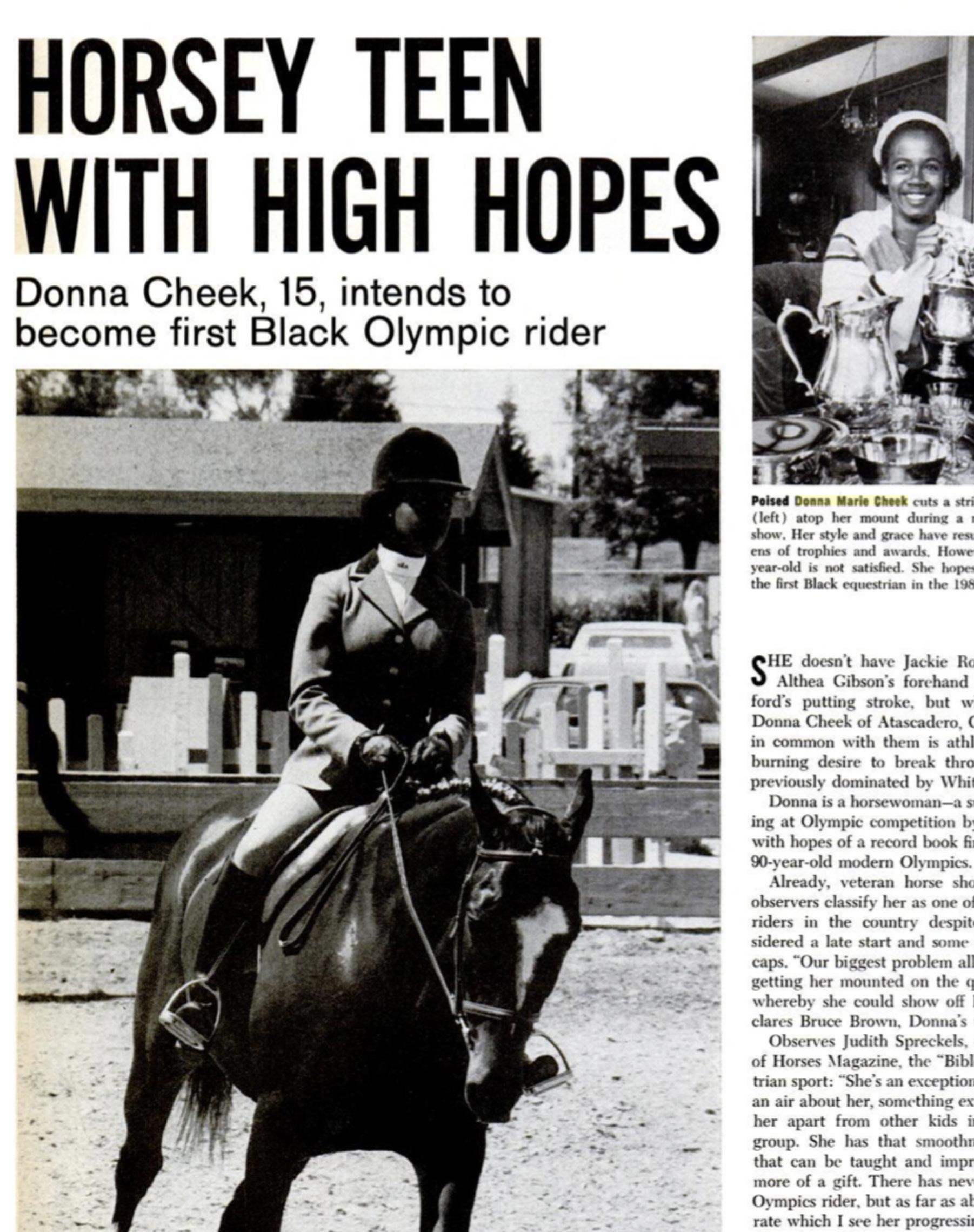
“I was focused on riding,” Cheek noted, “and I was lucky that my mom and Pat Tobin, a Hollywood PR agent, worked hard to promote me. My mom set up a nonprofit, Black Equestrian Sports Talent, and Pat arranged fundraisers and public appearances. My job was to show up when and where I was told in breeches and boots to talk to people.”
Fundraisers included parties at private homes and events at popular celebrity nightclubs. Cheek was featured in “Jet,” “Ebony,” and “Essence” magazines. “At that time,” Cheek noted, “those magazines appeared on living room tables in just about every Black home and hair salon; these were the days long before social media.”
Black industry and sports leaders were invested in helping the next generation of aspiring Black athletes and entrepreneurs. Cheek’s supporters included actor Diahann Carroll, Motown’s Quincy



Jones, world champion boxer Muhammad Ali (whose wife Veronica was a rider), and real-estate mogul Eula McClaney.
The efforts of King and Cheek’s parents soon came together. When they heard that the 1982 American Junior Show Jumping Championship, usually held in South America, was to be held in Mexico City, they decided it could be a good opportunity for Cheek and a team of California riders to gain international experience. They petitioned the U.S. Equestrian Team, which at the time had authority over Americans competing internationally, for permission to send a team.
King was named by the USET to select and lead the team as chef d’equipe. He chose the riders, handled the logistics, and trailered the horses to Mexico City. The members of the team had to find the means to cover their costs; the USET had sanctioned the team’s participation but did not provide any funds. A sponsor from her parents’ network stepped up to purchase and fund the care for a horse King found for Cheek.
“The people at the championship took really good care of us,” Cheek remembered. “They’d never had a U.S. team, and they made a big deal about us. It was so unusual.” Cheek finished fourth individually, with just one rail in the jump-off.
The trip to Mexico was “a proud moment,” Cheek remembered, although
Donna Cheek and the legendary boxing champion Muhammad Ali, who was one of her supporters in the Black community, in an undated photograph.
it didn’t quite turn into the springboard she, King, and her parents had hoped. The team did not make the podium, so this pioneering effort in the international arena didn’t receive much attention in the equestrian press.
PR agent Tobin, however, arranged for Cheek’s story to be featured on NBC’s “Special Treat” daytime television series (modeled on ABC’s “Afterschool Special”).
Aimed at inspiring young viewers, “One More Hurdle: The Donna Cheek Story” focused on Cheek’s resilience and determination to pursue her dream of riding in the Olympics.
Cheek was cast to play herself, riding her horse from the championship. The television show included the highs and lows of horse ownership and touched on the racism she faced as the only Black competitor at horse shows. Produced by Fernfield Productions and directed by Neema Barnette, herself a pioneering Black director, “One More Hurdle” aired in April 1984. It won an NAACP Image award.
The Bill Pickett Invitational Rodeo
Not long after, Cheek’s sponsor faced financial difficulties and ended their support. Cheek “retired” from competition and focused on completing her communications degree at Cal Poly. Looking back, she said, “I retired a lot in the course of my career, but I never thought ‘I’ll never ride again.’ It was just really frustrating, so I looked into doing something else. Then, the next thing that happened, I got the call about the Bill Pickett Invitational Rodeo.”
The Bill Pickett Invitational Rodeo was founded in 1984 to highlight the historical and modern-day
skills of Black cowboys. Coors was the sponsor and developed an “Outstanding Talent Family” to act as ambassadors, inviting Cheek to give jumping demonstrations at each of the rodeos. “At that time,” she said, “I didn’t have a horse, so I was like, ‘Shoot, I’m just going to catch ride in any city they want me to. I can ride anything.’ I could ride and jump and have fun. I could travel. That was my feeling.”
The BPIR circuit in those days included 10 to 15 cities across the country. In each city, Cheek had to field the horses suitable for her demonstration rides: “I would arrive on Monday and go to the library, copy down the hunter/jumper stables from the Yellow Pages, go back to the hotel and call them.”
She’d visit the barns and try out likely candidates. “It was challenging. I’d go into a city and never know what kind of horse I’d be sitting on,” Cheek recalled. “And the people had no idea I was Black until I showed up to try the horses. It was so interesting—I would get such positive feedback since they had no idea that someone like me could ride so well. I went back to some of the same people each year. I had a lot of great experiences.”
Cheek’s job in each city included promoting the rodeo and the Coors brand on radio, television, and in the newspapers, with occasional visits to schools and children’s hospitals. Cheek noted, “Those of us in the Outstanding Talent Family had posters, brochures, and ‘hero cards’ with our pictures and bios to give out. Coors would set up the interviews and send a rep to pick me up and take me to my appearances.”
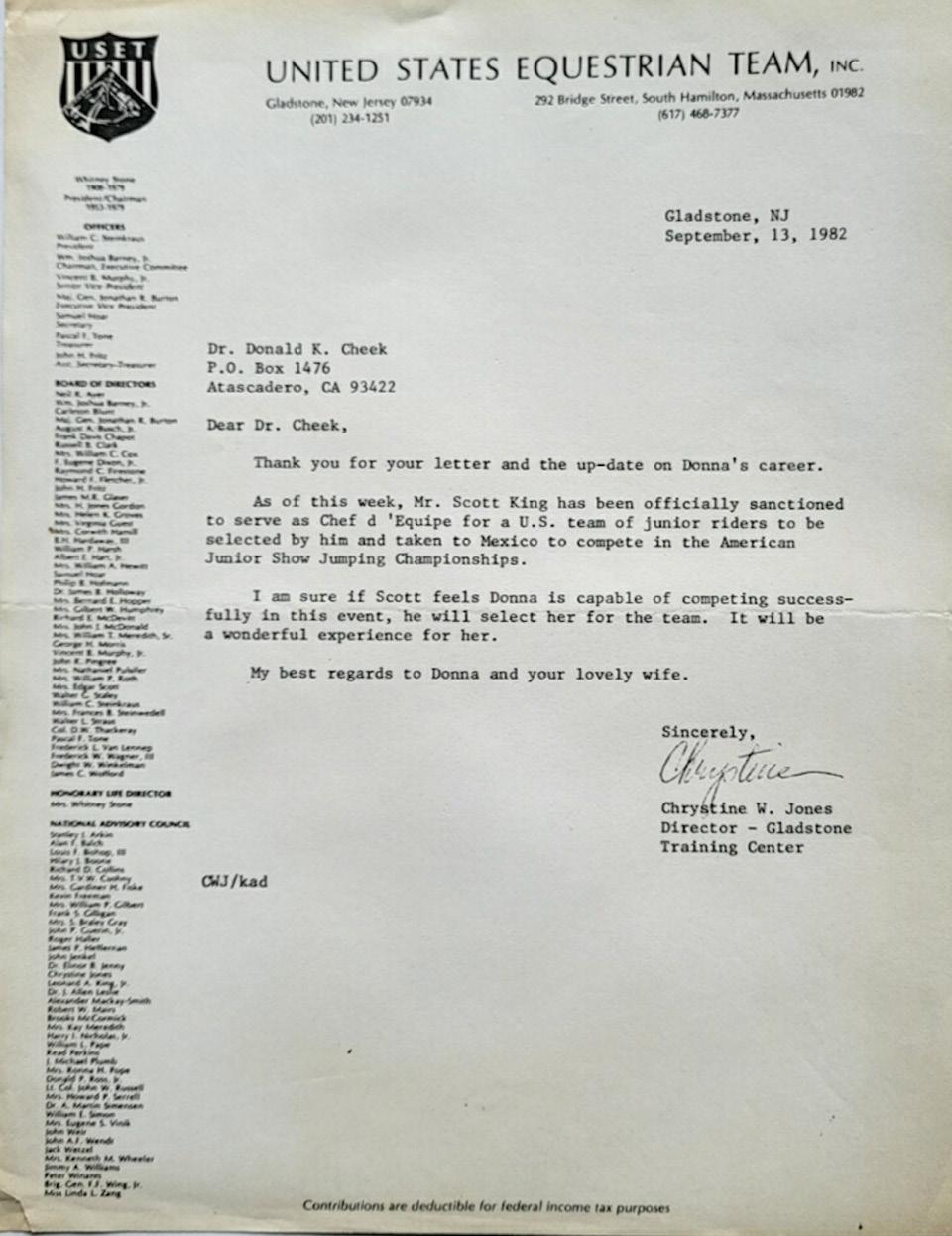
“It was so much fun. We would promote the rodeo, yet tell our own stories, wanting to get the kids’ attention. We’d talk about the
Donna Cheek speaks to the audience after accepting an Ethos Award at the inaugural Ethos Gala at the 2022 Washington International Horse Show in Maryland.

character and the approach you have to have to succeed at anything that’s your passion. And that was our message. The message was about finding that passion and pursuing it. That’s when success happens.”
For her performances, Cheek said, “I would always ride to classical music to give a totally different presentation than the rest of the rodeo. The packed audiences were predominantly people of color. And most of them had never seen a hunter/jumper rider, let alone a Black one. Once I finished riding, I would go into the stands and sign autographs for hours. These people were so fascinated and in awe that a person that looked like them was doing something so different. I really felt validated and appreciated when I did the rodeo.”
Ready for the Next Step
When the sponsorships for the rodeo special performances ended in the early
“IT’S BEEN A JOY AND PRIVILEGE TO BETTER THE LIFE OF HORSES THAT CAME THROUGH MY BARN.”
1990s, Cheek went back to hunter/jumper jobs, occasionally showing for other people, but as she described, “Things didn’t pan out well. I just didn’t have access to a chance that led to being able to compete at the level that I desired. With these other opportunities, though, I was having fun, and I was satisfied in my need to ride. I didn’t really need to compete again because I was fulfilled in a way that competing couldn’t compete with.”
Eventually, she started training on her own and then moved into consignment sales. Her business focused on finding new jobs for horses that had been outgrown or were stepping down. Cheek focused on working with the horses to figure out the best new role for them. “I wanted to sell the horses into a really happy situation that suited where that horse was at the moment,” she said.
All kinds of horses came to her on
consignment. She’d reassess whether continuing to be a hunter or dressage horse was the right job for a particular horse. After all her experience with catch riding, she had learned to really listen to horses. She said, “A horse can tell me what makes them happy. I would just approach them with a clean slate, see what they were good at, see what they were happy with, and then I would market and sell them that way. Consequently, people were happy with the horse they bought.”
These days, Cheek’s still fit and maybe not yet completely retired. She said, “I’m an amateur now, and being able to focus on just one horse and compete again is always in the back of my mind. I still love horses.” And like them, she said, “I’ve really learned just to live in the moment.”


John Deere offers substantial discounts on everything from mowers and tractors to GatorsTM, hay and construction equipment.
• The MSRP Program – Professional operations can save up to 28% on select equipment
• The Cash Bonus Program – All members can save up to $2,700 with vouchers that are stackable with special financing
• Construction Equipment – All members can save up to 26% on select equipment


in-store products and wall coverings.
ODP Business Solutions™ (formerly Office Depot) and Equine Discounts have partnered to provide exclusive benefits and savings on a wide selection of office products and services. ODP Business Solutions™ is here to support the success of your business. Save up to 35% discount on Sherwin Williams


 by Kim Russell
by Kim Russell
Spread the joy of horses while you shop with these businesses that have pledged support for the USEF Opportunity Fund. This year, a number of companies are showing their support for the USEF Opportunity Fund by making a contribution to the fund or donating a percentage of their sales to the fund. The USEF Opportunity Fund is a grantmaking resource dedicated to supporting grassroots organizations with a mission of increasing access to horses, horse sports, and equine-based learning opportunities among under-represented and/or underserved communities. Learn more and make your own donation at usef.org.

The Ariat Ideal down parka is famed for its
SmartPak’s classic grooming set has everything you need for grooming and bonding with your horse at the same time. You not only get a wide assortment of grooming tools and brushes, but also a handy grooming tote. The tote’s open interior compartment and outside pockets have plenty of storage to easily organize and transport your grooming gear and more. $44.95. smartpak.com



The SmartPak soft padded leather halter is handmade by skilled Amish craftsmen with the highest quality leather and durable, stylish hardware. Havana halters have solid brass hardware, and black halters have stainless steel hardware. Contrasting soft padding on the 1” double-stitched noseband, cheek pieces, and crown piece prevents rubbing or uncomfortable pressure on sensitive areas. An adjustable chin strap and crown piece allow for a customized fit. $99.95 smartpak.com

Introducing the Loire ear bonnet, which lets your horse be as stylish as you are. Beautifully made from three-way handknitted crochet with a luxurious satin fabric front piece and soft stretch elastane ears. Finished with the LeMieux Loire embossed motif. $55.95. lemieux.com

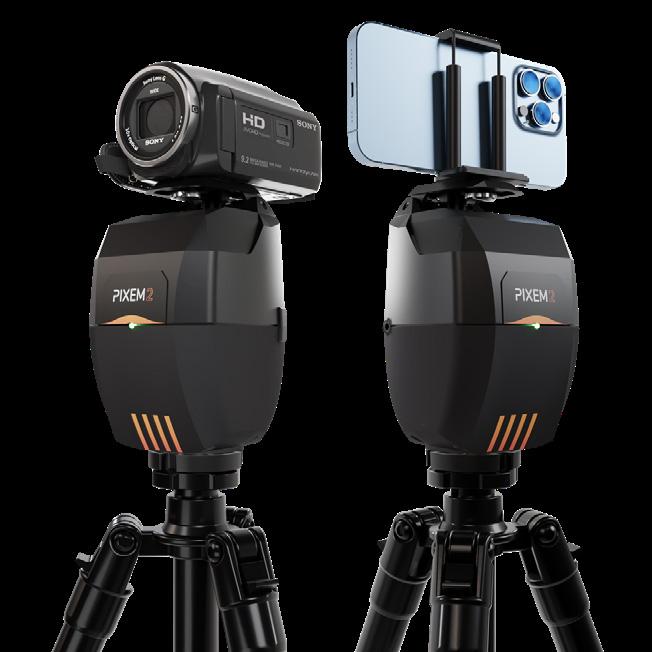
Roeckl’s Roeck-Grip winter glove is supple, flexible, and breathable for maximum feel and grip on the reins. This winter version is laminated with a soft Micro Bemberg fleece lining for warmth. Like its summer counterpart, the Roeck-Grip® Winter fits like a second skin, giving the rider a close contact feel even in cold weather. $69.95 toklat.com/roeckl

This ultra-plush, relaxed-fit Fjord fleece hoodie prioritizes the equestrian’s winter comfort with a close-fitting hood that keeps you extra cozy, a front kangaroo pouch with an inside mesh phone holder, and inner cuffs with thumbholes to keep the wind out. A rose-gold zipper makes it easy on and off, even over your helmet. It also has a rose gold metal zipper pull that will double as a hair tie in a pinch!
The ultra-snuggly Fjord fleece knee-patch breeches envelop you in warmth and block out wind and cold. The practical all-way stretch allows unrestricted movement, a silicone horsehead tread provides extra grip, and the belt loops are detailed with a rose-gold horsehead charm for a touch of elegance, too. Extralarge front pockets accommodate even the largest phones for easy storage and access. Hoodie $119.95, breeches $139.95. toklat.com
Finally: you can film professional quality videos with PIXEM 2 auto-follow robots! Film your lessons, shows, competitions, horses for sales, and more. Place your camera/ smartphone/tablet on the robot and enjoy the automatic tracking, zoom, and record- ing features. Want to livestream for distance coaching? The PIXEM 2 has that option, too. $ 999 with a special holiday discount, plus 10% off for USEF members. shop.movensee.com
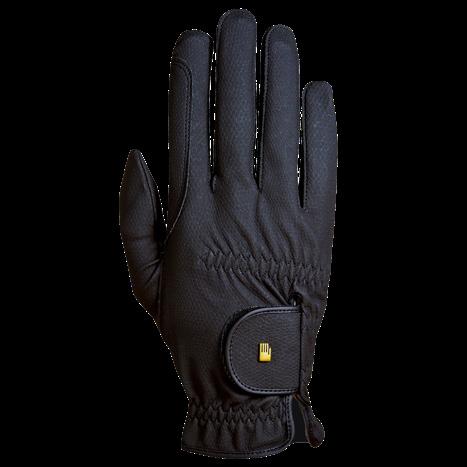

The Grand Prix locker includes all the great features of the FlexiEquine’s Champion locker, only more compact. With ease of movement, loading, and transport, this locker is a wonderful gift for the equestrian on the move and is the perfect solution for storing all your own equestrian equipment. Keeps equipment organized and easily accessible. Starts from $3,800. flexiequinetack.com

Made entirely in the USA, the Elliena EQ Collection made by Ellie’s Bows sports vibrant fabrics made with cool tech technology that moves heat away from the body while keeping you comfortable. $75. ellienaequestrian. myshopify.com



Dapple Up’s healthy equine and petfriendly shampoo is infused with essential oils to help our best animal friends feel and look their best from the outside in.
Proudly made in Kentucky. And here’s an extra gift for you: use code USEF10 to receive 10% off your purchase. Prices range from $5 for 4 oz. to $69 for a gallon. dappleup.com
LeMieux’s lightweight Motionflex dressage boots are close-fitting and breathable with a molded TPU tendon and joint guard to protect your horse’s legs. These highly flexible boots are carefully designed to nestle against your horse’s leg with a close-fitting design that minimizes restriction without compromising on your horse’s flexibility. They feature a light and breathable mesh lining to keep tendons cool and comfortable during dressage competitions or training sessions at home. An easy wrap-around closure makes things simple when you’re scrambling to get your horse ready during early morning starts. $95.95. lemieux.com



CUSTOM FIT & DESIGN


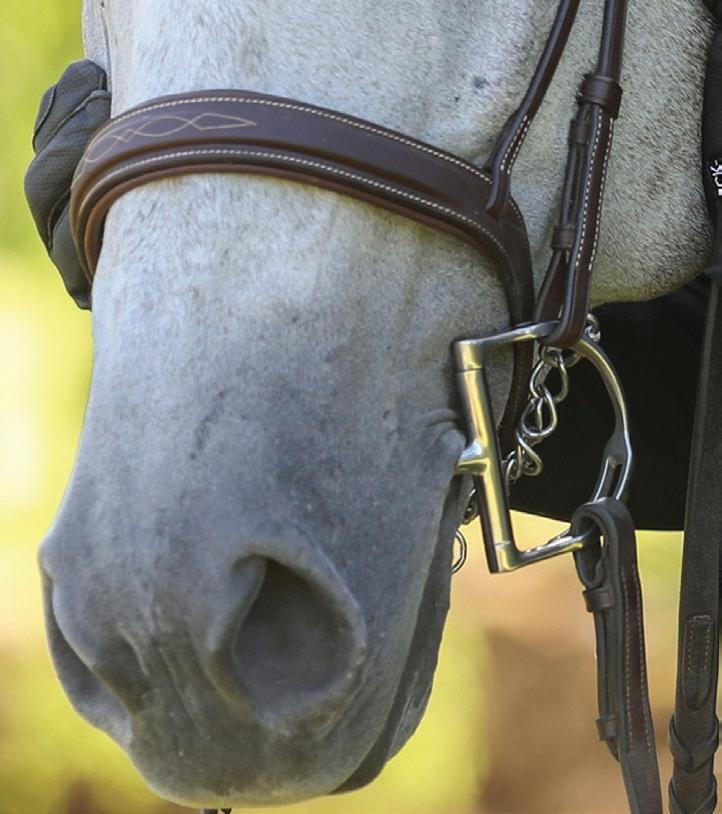
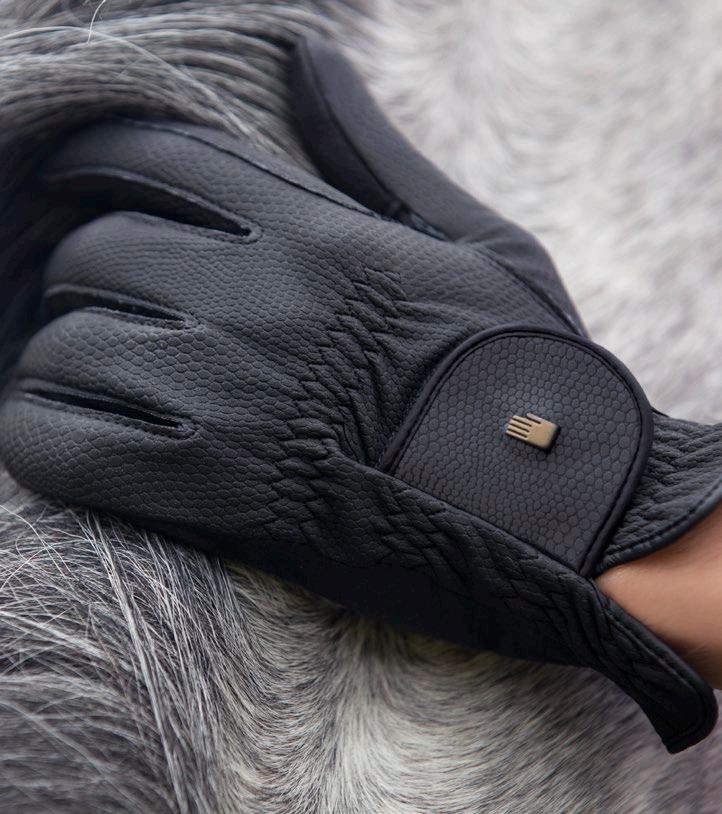

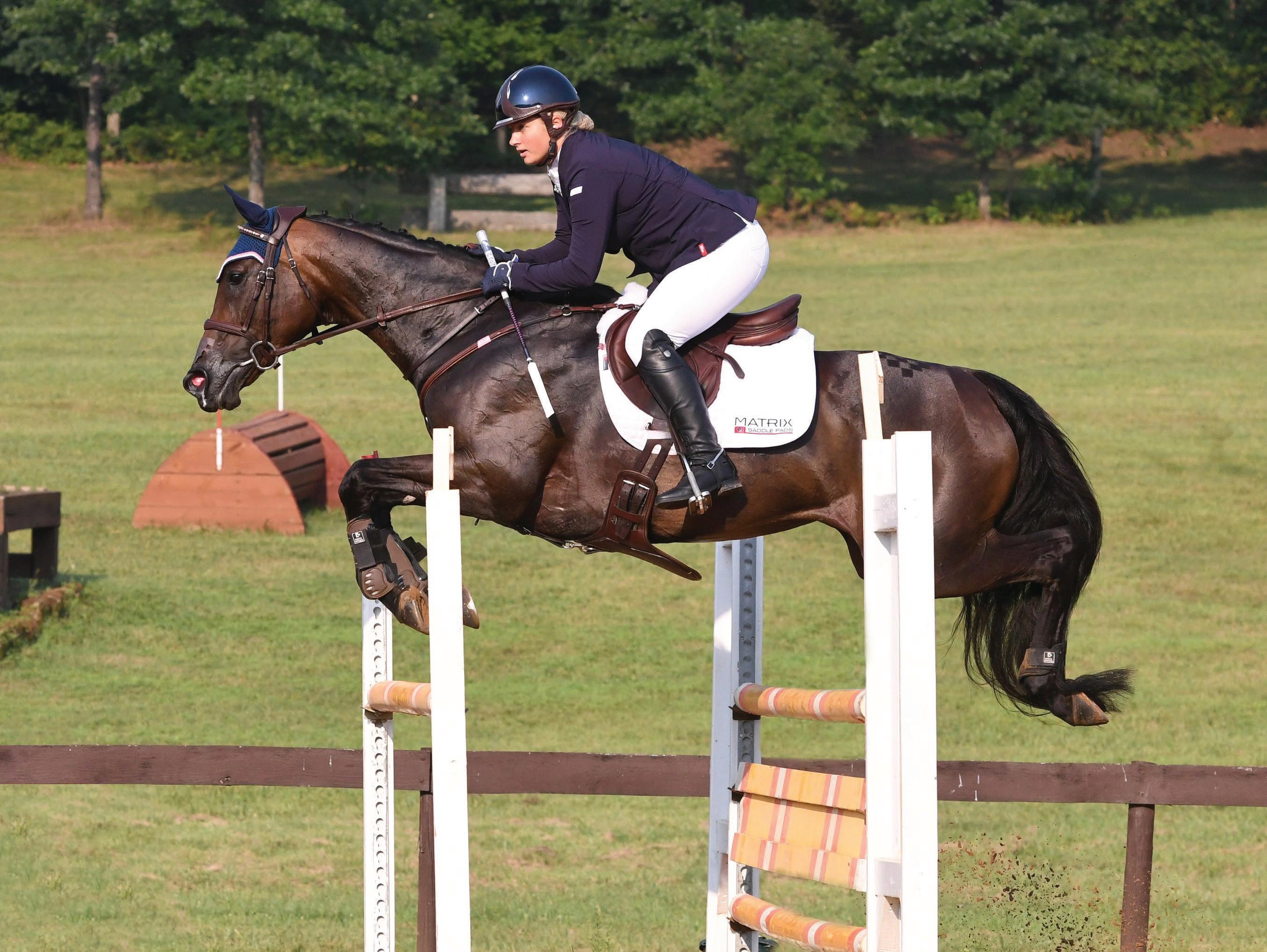
Utilize the latest technology with T3 Matrix Saddle Pads for maximum comfort and freedom of moment


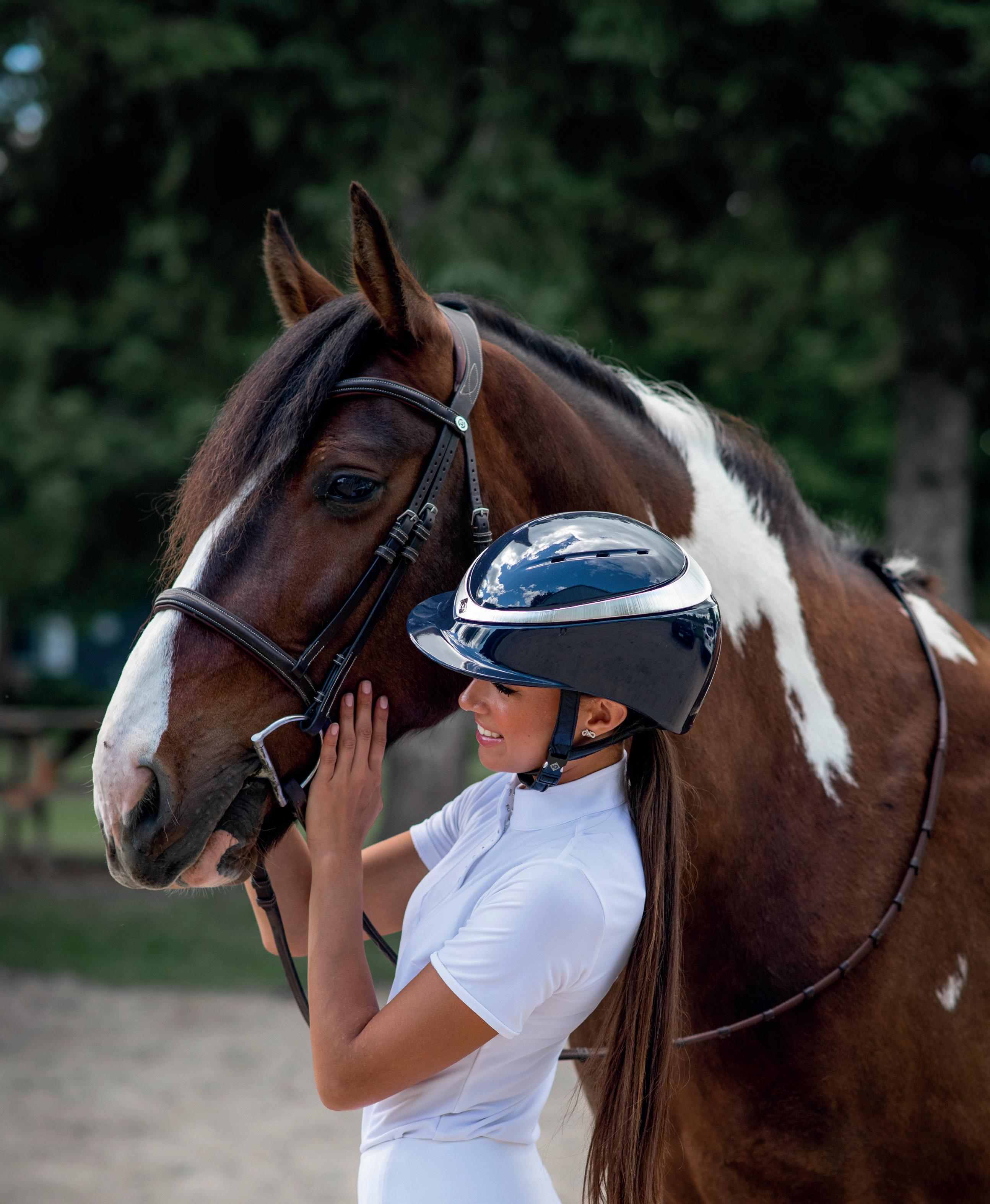


Orthobiologics, also known as regenerative medicine devices or RMDs, can be beneficial in treating both arthritis in joints and soft-tissue injuries.
Orthobiologics, treatments that derive from your horse’s own natural mechanisms for healing, offer great promise for veterinary therapies, as Dr. Liberty Getman from Zoetis details.
Devices used in regenerative medicine are rapidly evolving in veterinary medicine. These innovations use orthobiologics—therapies developed from the horse’s own blood, cells, or tissues—to promote healing. That has added some stall-side treatment options for veterinarians and their clients, the horse owners and managers who care for equine athletes. But what do regenerative medicine devices (RMDs) like platelet-rich plasma therapy and autologous protein solutions involve and how do they help? How do they differ from other treatments, and can they be used in conjunction with other therapies?
We sat down with equine surgeon Dr. Liberty Getman, who also is an equine technical services veterinarian with the largest standalone global veterinary pharmaceutical company Zoetis, to ask these questions and find out more about orthobiologics and their use. Getman calls orthobiologic therapies, also called regenerative medicine devices, “a game-changer” in veterinary medicine but notes that they are more helpful for some equine problems than others.
What are the benefits of orthobiologics compared to more traditional treatments people might be more familiar with?
In general, what we’re trying to do with the orthobiologics approach is twofold. We’re trying to give a horse the same amount of pain relief that they would get from a more traditional treatment like a steroid. But the benefit to using an orthobiologic is
that we know that, over time with repeated use, steroids actually cause further cartilage breakdown and joint destruction. So what we’re really trying to do is put a product in the joint that not only is going to relieve the horses’ pain, but also help to heal whatever’s going on in that joint and not contribute to further joint damage.
Orthobiologics is kind of an umbrella term, but the ones that we’re using specifically are going to help decrease the inflammation in the joints, heal some of the damage that’s already there, and hopefully prevent any arthritis from progressing at a faster pace.
The substances in these regenerative medicine devices produce, or at least in the three that Zoetis has, are growth factors, which promote healing, and anti-inflammatory proteins, which decrease inflammation. All of these types of proteins are found in the horse’s blood. We take those proteins---the good, healing proteins and the anti-inflammatory proteins, out of your horse’s blood, concentrate them, and then put them back into your horse’s joints. They’re not drugs; they’re not classified as drugs by the Food and Drug Administration. They’re proteins from your horse’s own body and blood that are meant to help heal the joint, decrease inflammation, and slow the progression of arthritis.
Are there horses for whom that kind of orthobiologic treatment might not be appropriate?
I think probably as many as 80% of the lameness cases in performance horses that I see could benefit from one of these regenerative therapies. The cases that don’t see as much benefit are those that already have severe joint damage. So if they have severe bone-on-bone osteoarthritis or are very lame, we know at that point, that’s probably a lost cause in that joint; nothing can regrow cartilage once it’s gone. These therapies work for just about every type of lameness and most degrees of lameness until you get to those very, very severe cases and those end-stage joints.
Is it safe to give a horse fairly regular treatment with an orthobiologic like a Pro-Stride® APS device if, say, they are older or have some history of needing joint injections with steroids for maintenance?
It would be my preference to use a Pro-Stride APS device rather than steroids for maintenancetype injections, because, although steroids do provide pain relief, repeated steroid use in a joint over time is going to cause further cartilage breakdown. When those were the only products we had to treat achy or painful joints, it was appropriate to use them. But I think now we also have products that aren’t going to contribute the joint damage, and it’s our job as veterinarians and horse owners to do what’s best for the horse and what’s best for the joint in a specific case.
In general, a maintenance schedule with something like Pro-Stride is going to be similar to a maintenance schedule with steroid injections. Every horse is different, depending on their degree of lameness, and the disease that’s in that joint. But I would say, on average, you’re going to get about the same amount of pain relief in terms of time, and maybe a little bit longer, with Pro-Stride than you do with steroids. I certainly have clients who felt like the effects lasted longer. But the biggest thing for me is this, especially if you have a horse who’s a little bit younger
“THEY’RE PROTEINS FROM YOUR HORSE’S OWN BODY AND BLOOD .…TO HELP HEAL THE JOINT, DECREASE INFLAMMATION, AND SLOW THE PROGRESSION OF ARTHRITIS.”
or middle-aged: when you inject the horse’s hocks with steroids, the first time you might get a year out of that, but the next time, it might be nine months. And the next time it might be six months. So you’d get progressively shorter action out of a steroid injection, because the joint is continuing to break down, and the steroids are speeding that up.
Every horse is different. And with as with anything, the more advanced the disease gets, the harder it has to find any sort of silver bullet for it. But what I do in a lot of those cases who have more advanced arthritis is not to say that I would never use steroids in them, but instead to prescribe steroids one year and Pro-Stride the next, in an alternating fashion.
Another thing to consider is that, as these horses get older, some of them are more prone to some metabolic conditions. And we know that when you put steroids in horses that have or are at risk for metabolic disease or insulin resistance, steroids can increase their risk of developing laminitis. Pro-Stride won’t do that. So with any horses that are getting a little bit on the older side, I do strongly suggest the clients to go with Pro-Stride.
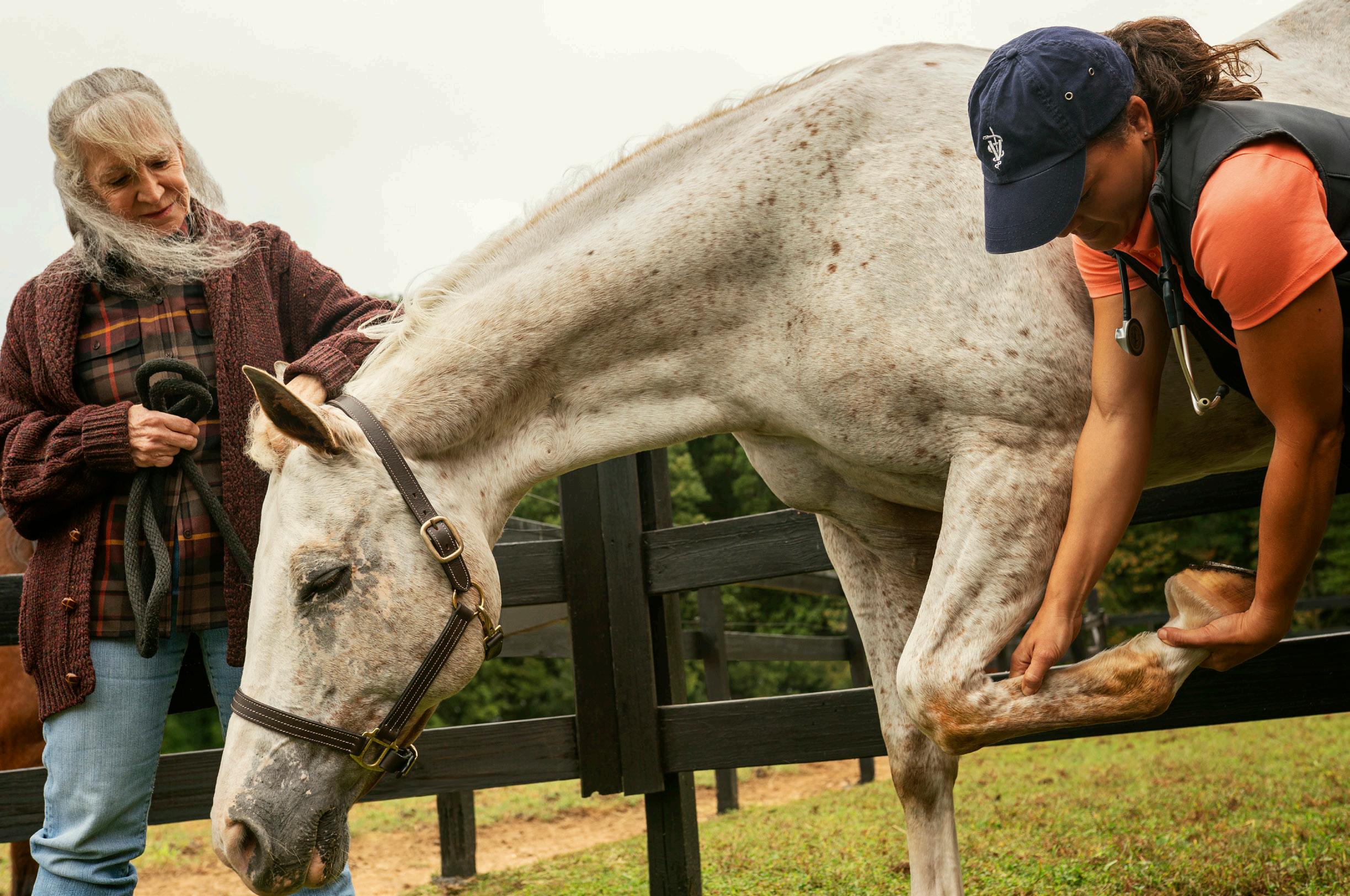
How much difference is there in terms of cost to the horse owner?
I can’t really give you any exact numbers, because obviously it varies from clinic to clinic and from one part of the country to another. But I will say, these therapies aren’t exorbitantly expensive. I think most people’s fear is that, if you’re spending $750 on hock injections now, is the regenerative medicine device going to be more like $3,000? And the short answer is no. I would encourage people to reach out to their veterinarians and see what their price point is. But I would say, depending on the number of joints you’re doing and the size of the joint that you’re doing, we’re talking a few hundred dollars’ difference, depending on how many joints you’re treating.
What kind of workload can a horse perform after an RMD treatment?
If it’s a routine joint injection, then I’m going to have you get back on your horse in two or three days and do some light work for a couple of days before returning to full work again. Every veterinarian is going to have their own preference. But I would say two or three days is what most people are recommending for a joint. If it’s a soft tissue injury, that’s going to depend on the extent and type of injury that the horse has. That’s usually going to be a longer process.
In general, my clients can expect the same post-treatment protocol they have with steroid injections, with the caveat that you need to give the treatment a solid two to three weeks before you’re going to see the full effect.
The procedure for RMDs like Pro-Stride is similar to that of traditional joint injections, with the horse sedated and the solution injected sterilely.
Why does it take longer to see the positive effects of an RMD like ProStride than it does to see those effects from steroid injections?
I always tell people that it’s going to be about two or three weeks before they see the full effect of a Pro-Stride APS device therapy, but an important point to make is that even though it might take that amount of time to see the full effect, you can still put your horse back to work in the same timeframe that you would with a steroid injection. Most of my horses got about three days off with a steroid injection and also get about three days off with Pro-Stride. That’s also going to be clinician-dependent. In general, you don’t need to give your horse more time off, but it does take longer for Pro-Stride to have its full effect. The reason is because it works on cell signaling; it’s relying on those proteins to go in and bind to different receptors. That’s a slower system than simply pouring water on a fire, which is more how the steroids operate. But I look at it this way; if you put out the fire in front of you and the forest is still burning behind you, you’re not going to be able to pour enough water to put the whole fire out. Pro-Stride puts water on the fire in front of you but also turns off the bigger fire.
What should the horse owner know about the procedure and how it’s done? And should the horse be tranquilized?
Yes, the horse should be sedated. There will be a blood draw, because these proteins are found in your horse’s blood— that’s where we get them from. It’s just a simple sterile surgical prep on your horse’s jugular vein, the veterinarian will pull 60cc of blood sterilely, so not a lot. And then that will get processed from a two step process using a centrifuge. While that’s happening, it’s just going to be like any other joint injection from there on: the horse will be sedated, the joints will have a sterile prep put on them, and the solution will be injected sterilely.
We’ve talked a lot about using orthobiologics to treat arthritis in joints, but can they also help soft-tissue injuries?

Orthobiologics are certainly the preferred method of treatment for soft-tissue injuries. The Restigen® platelet-rich plasma (PRP) product has been intensively studied in soft-tissue injuries, and PRP would be my preference for those. However, there is some emerging research looking at Pro-Stride in soft-tissue injuries, and it seems to work well, too. So you can use either, but the most extensive research so far has been behind using Restigen PRP for soft-tissue injuries.
We also use CenTrate®, a bone marrow aspirate (BMA) device, for soft-tissue injuries or for a soft-tissue structure that attaches to a bone—so a tendon or a ligament where it’s attaching to bone. The difference between CenTrate BMA and Pro-Stride or Restigen is that, in addition to having the same healing growth factors and antiinflammatory proteins, it also has stem cells in it as well. These are live cells, and you get them from the bone marrow. It’s a little bit of a different process: you take a bone marrow aspirate from the horse’s sternum to get these.
Typically, we use CenTrate on these kinds of injuries that we know are going to be hard to get to heal, like chronic hind-limb proximal suspensory issues, meniscal problems in the stifle—issues that we know are difficult to heal. That’s where bone marrow concentrate seems to show the most promise.

We’ve seen so much change in veterinary medicine in the last 20 years or so. As a veterinarian, how much difference do these new orthobiologic therapies make to your ability to treat equine injuries?
They’ve been a game-changer, literally one of the most exciting advancements in treatment that we’ve had in veterinary medicine. As a human who has her own sports injuries, I can’t wait until the human side catches up with what we’re able to do for our equine athletes. Regenerative medicine has dramatically decreased healing times, has improved the healing in our soft tissue structures, and allowed these structures to heal with less scar tissue, which decreases their chance of re-injury down the road. It’s been so much healthier for the joints than repeated steroid use. So we’re keeping these joints healthier for longer, which is keeping our horses in work for longer.

Above: It’s our job as veterinarians and horse owners to do what’s best for the horse and what’s best for the joint in a specific case,” says equine surgeon Dr. Liberty Getman, an equine technical services veterinarian for Zoetis.
Inset: Equine surgeon Dr. Liberty Getman, who also is equine technical services veterinarian for Zoetis, estimates that as many as 80% of the lameness cases she sees in performance horses could benefit from one of these regenerative medicine devices.
Contributed by the Regulation Department unless otherwise indicated. The following official notices are only intended to give penalty information for a given case and not to disclose the factual basis for each violation or penalty. For matters heard by the Hearing Committee, a Hearing Panel decides each case based on the evidence presented at the hearing and takes into account many factors that may raise or lower a given penalty. For example, the Hearing Committee takes into account such things as whether the violation was intentional or unintentional, the nature of the violation, the credibility of witnesses, Penalty Guidelines, penalties in similar cases, past violations of Federation rules by a respondent, and many other mitigating factors.
US Equestrian members can access and search the United States Equestrian Federation Suspension List online at USequestrian.org. Hover over the Compete tab on the homepage. In the menu that appears, click Ineligibility List under Rules, Regulations, and Grievances.
of Wellington, Fla., as trainer, violated Chapter 4, GR410-411, of this Federation in connection with the Gold Coast Dressage Finale II Horse Show held on April 16, 2023, in that the horse MANHATTAN was exhibited after it had been administered and/ or contained in its body cetirizine. The facts and mitigating factors in this case supported the following penalty even though it is below the suggested range for Category II Violations outlined in the Drugs and Medications Penalty Guidelines.
For this violation, it was determined that BETSY STEINER be censured pursuant to Chapter 7, GR703.1a, and fined $1,500 pursuant to Chapter 7, GR703.1j. It was further directed that for this violation of the rules, all trophies, prizes, ribbons, and monies, if any, won by MANHATTAN at said competition must be redistributed pursuant to Chapter 7, GR703.1g.
ARIANNA ALMEIDA of Purcellville, Va., as trainer, violated Chapter 4, GR410-411, of this Federation in connection with the Loch Moy Spring Fling Dressage Horse Show held on April 22, 2023, in that the horse RHEIN AFLAME was exhibited after it had been administered and/ or contained in its body cetirizine. The facts and mitigating factors in this case supported the following penalty even though
it is below the suggested range for Category II Violations outlined in the Drugs and Medications Penalty Guidelines.
For this violation, it was determined that ARIANNA ALMEIDA be censured pursuant to Chapter 7, GR703.1a, and fined $1,500 pursuant to Chapter 7, GR703.1j. It was further directed that for this violation of the rules, all trophies, prizes, ribbons, and monies, if any, won by RHEIN AFLAME at said competition must be redistributed pursuant to Chapter 7, GR703.1g.
EMILY MILLER of Leesport, Pa., as trainer, violated Chapter 4, GR410-411, of this Federation in connection with the Ocala Spring Classic III Horse Show held on April 12-16, 2023, in that the horse CASIRO INCIPIT was exhibited after it had been administered and/ or contained in its body cetirizine. The facts and mitigating factors in this case supported the following penalty even though it is below the suggested range for Category II Violations outlined in the Drugs and Medications Penalty Guidelines.
For this violation, it was determined that EMILY MILLER be censured pursuant to Chapter 7, GR703.1a, and fined $1,500 pursuant to Chapter 7, GR703.1j. It was further directed that for this violation of the rules, all trophies, prizes, ribbons,
and monies, if any, won by CASIRO INCIPIT at said competition must be redistributed pursuant to Chapter 7, GR703.1g.
ALLISON BLACK of Birmingham, Ala., violated Chapter 4, GR410, of this Federation, in connection with the Brownland Farm Spring II Horse Show held on April 26-30, 2023, in that she, as trainer, exhibited the horse TRUTH BE TOLD after it had been administered and/or contained in its body methocarbamol in a plasma concentration exceeding the maximum permitted level, and guaifenesin.
For this violation, it was determined that ALLISON BLACK be censured pursuant to Chapter 7, GR703.1a, and fined $1,000 pursuant to Chapter 7, GR703.1j. It was further directed that for this violation of the rules, all trophies, prizes, ribbons, and monies, if any, won by TRUTH BE TOLD at said competition must be redistributed pursuant to Chapter 7, GR703.1g.
ABIGALE SELEYFERRIGNO of Newtown, Conn., violated Chapter 4, GR410, of this Federation in connection with the Westbrook Annual Spring Fling Horse Show held on April 27-30, 2023, in that she, as trainer, exhibited the horse ENVOL DE RIVERLAND after it had been administered and/ or contained in its body methocarbamol in a

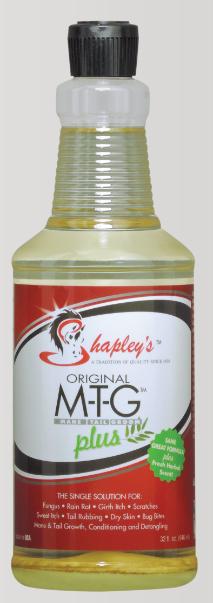

plasma concentration exceeding the maximum permitted level, and guaifenesin.
For this violation, it was determined that ABIGALE SELEY-FERRIGNO be censured pursuant to Chapter 7, GR703.1a, and fined $1,000 pursuant to Chapter 7, GR703.1j. It was further directed that for this violation of the rules, all trophies, prizes, ribbons, and monies, if any, won by ENVOL DE RIVERLAND at said competition must be redistributed pursuant to Chapter 7, GR703.1g.
RODOLFO GUZZO of Phoenix, Ariz., violated Federation Rule AR105.3 in connection with the U.S. National Arabian and Half-Arabian National Championships Horse Show held on October 21-29, 2022, in that he, as trainer, exhibited the horse STARDOM SKY after it had been administered and/or contained in its body gingerol.
The Federation resolved this matter through an informal resolution with Mr. Guzzo following an investigation and review of competition records, during which Mr. Guzzo was represented by counsel and
fully cooperated with the Federation. In determining the proper penalty, the Federation took into account the facts and mitigating factors in this case and determined that the following penalties were appropriate.
For this violation, it was determined that pursuant to Chapter 7, GR703.1b and GR703.1f, RODOLFO GUZZO shall be found not in good standing, suspended from membership, and forbidden from the privilege of taking any part whatsoever in any Licensed Competition for two (2) months and is excluded from all competition grounds (cannot be on grounds from the time participants are admitted on the competition grounds until the last time for departure). For example, suspended individuals may not be on competition grounds during schooling or other such days prior to the start of the competition for any purpose, including such things as coaching riders, training or schooling horses, or trailering horses on or off competition grounds during Licensed Competitions for that period. Furthermore,
suspended individuals are excluded from (1) competition grounds as an exhibitor, participant, or spectator; (2) from participating in all Federation affairs and activities; (3) from holding or exercising office in the Federation or in any Licensed Competition; and (4) from attending, observing, or participating in any event, forum, meeting, program, clinic, task force, or committee of the Federation, sponsored by or conducted by the Federation, or held in connection with the Federation and any of its activities. Regulations as to suspended persons are set forth in detail in General Rule 704.
The two-month suspension shall commence on November 1, 2023, and terminate at midnight on December 31, 2023. Any horse or horses owned, leased, or of any partnership, corporation, or stable of his, or shown in his name or for his reputation (whether such interest was held at the time of the alleged violation or acquired thereafter) shall also be suspended, pursuant to Chapter 7, GR703.1c, for the same period.
RODOLFO GUZZO was also fined $2,500 pursuant to Chapter 7, GR703.1j. In connection with this penalty all trophies, prizes, ribbons, and monies, if any, won by STARDOM SKY at said competition were redistributed pursuant to Chapter 7, GR703.1g.
JOAO CARLOS SILVESTRE DE SOUZA violated Federation Rule AR105.3 in connection with the U.S. National Arabian and Half-Arabian National Championships Horse Show held on October 21-29, 2022, in that he, as trainer, exhibited the horse STARDOM SKY after it had been administered and/or contained in its body gingerol.
The Federation resolved this matter through an informal resolution with Mr. De Souza following an investigation and review of competition records, for which Mr. De Souza was represented by counsel and fully cooperated with the Federation. In determining the proper penalty, the Federation took into account the facts and mitigating factors in this case and determined that the following penalties were appropriate.

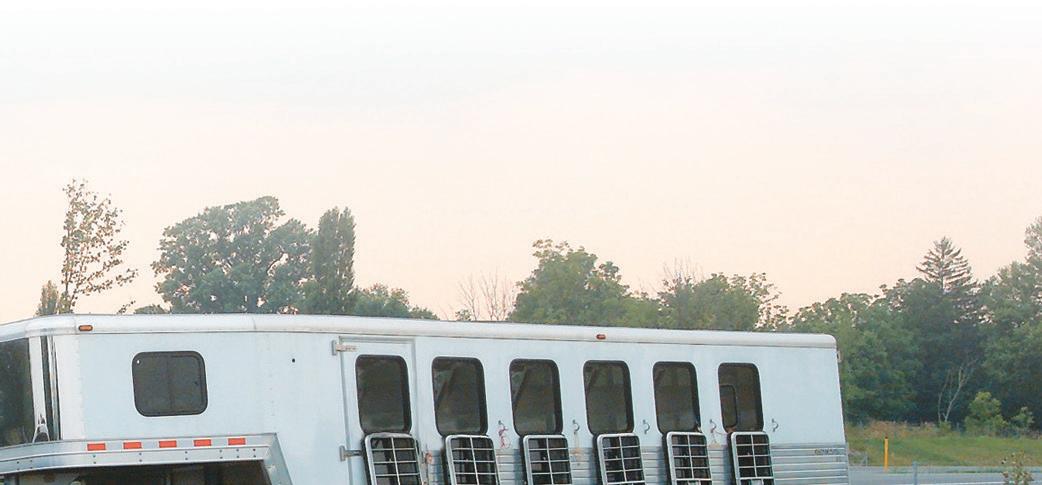

For this violation it was determined that pursuant to Chapter 7, GR703.1b and GR703.1f, JOAO CARLOS SILVESTRE DE SOUZA shall be found not in good standing, suspended from membership, and forbidden from the privilege of taking any part whatsoever in any Licensed Competition for two (2) months and is excluded from all competition grounds (cannot be on grounds from the time participants are admitted on the competition grounds until the last time for departure). For example, suspended individuals may not be on competition grounds during schooling or other such days prior to the start of the competition for any purpose, including such things as coaching riders, training or schooling horses, or trailering horses on or off competition grounds during Licensed Competitions for that period. Furthermore, suspended individuals are excluded from (1) competition grounds as an exhibitor, participant, or spectator; (2) from participating in all Federation affairs and activities; (3) from holding or exercising office in the Federation or in any Licensed Competition; and (4) from attending, observing, or participating in any event, forum, meeting, program, clinic, task force, or committee of the Federation, sponsored by or conducted by the Federation, or held in connection with the Federation and any of its activities.
Regulations as to suspended persons are set forth in detail in General Rule 704.
The two-month suspension shall commence on November 1, 2023, and terminate at midnight on December 31, 2023. Any horse or horses owned, leased, or of any partnership, corporation or stable of his, or shown in his name or for his reputation (whether such interest was held at the time of the alleged violation or acquired thereafter) shall also be suspended, pursuant to Chapter 7, GR703.1c for the same period.
JOAO CARLOS SILVESTRE DE SOUZA was also fined $2,500 pursuant to Chapter 7, GR703.1j. In connection with this penalty all trophies, prizes, ribbons, and monies, if any, won by STARDOM SKY at said competition were redistributed pursuant to Chapter 7, GR703.1g.
LAURIE MCLAUGHLIN of Auburn, Wash., violated Chapter 4, GR410–GR411 of this Federation in connection with the Donida Farm Spring Fling #1 Horse Show held on May 13, 2023, in that she, as trainer, exhibited the horse VOGUE after it had been administered and/or contained on its body gabapentin.
For this violation, it was determined that pursuant to Chapter 7, GR703.1b and GR703.1f, LAURIE MCLAUGHLIN shall be found not in good standing, suspended from membership, and forbidden from the privilege of taking any part whatsoever in any Licensed Competition for one (1) months and is excluded from all competition grounds (cannot be on grounds from the time participants are admitted on the competition grounds until the last time for departure). For example, suspended individuals may not be on competition grounds during schooling or other such days prior to the start of the competition for any purpose, including such things as coaching riders, training or schooling horses, or trailering horses on or off competition grounds during Licensed Competitions for that period. Furthermore, suspended individuals are excluded from (1) competition grounds as an exhibitor, participant, or spectator; (2) from participating in all Federation affairs and activities; (3) from holding or exercising office in the Federation or in any Licensed Competition; and (4) from attending, observing, or participating in any event, forum, meeting, program, clinic, task force, or committee of the Federation, sponsored by or conducted by the Federation, or held in connection with the Federation and any of its activities. Regulations as to suspended persons are set forth in detail in General Rule 704.
The one-month suspension shall commence on May 1, 2024, and terminate at midnight on May 31, 2024. Any horse or horses owned, leased, or of any partnership, corporation or stable of hers, or shown in her name or for her reputation (whether such interest was held at the time of the alleged violation or acquired thereafter) shall also be suspended, pursuant to Chapter 7, GR703.1c for the same period.
LAURIE MCLAUGHLIN was also fined $2,000 pursuant to Chapter 7, GR703.1j. It was further directed that for this violation of the rules, all trophies, prizes, ribbons, and monies, if any, won by VOGUE at said competition must be redistributed pursuant to Chapter 7, GR703.1g.
JILL CURTIS of Deep River, Conn., violated Chapter 4, GR410, of this Federation in connection with the Fieldstone Spring Festival 2 Horse Show held on May 17-21, 2023, in that she, as trainer, exhibited the horse CONDOR II after it had been administered and/or contained in its body methocarbamol in a plasma concentration exceeding the maximum permitted level, and guaifenesin.
For this violation, it was determined that JILL CURTIS be censured pursuant to Chapter 7, GR703.1a, and fined $1,000 pursuant to Chapter 7, GR703.1j. It was further directed that for this violation of the rules, all trophies, prizes, ribbons, and monies, if any, won by CONDOR II at said competition must be redistributed pursuant to Chapter 7, GR703.1g.
2nd STREET EQUESTRIAN LLC D/B/A ROCKING HORSE STABLES , as Competition Management, and GALE FOX, as Licensed Official, violated Chapter 10, GR1033.7, GR1039.1, and GR1040.6 and EV158.1.b.6 of this Federation, in that in connection with the Rocking Horse Winter III Horse Trials held March 3-5, 2023, Gale Fox served as both a Technical Delegate and Eventing Judge. In addition, Ms. Fox officiated as Technical Delegate at more than two consecutive competitions run by the same licensee. Specifically, she served as Technical Delegate at the Rocking Horse Winter I Horse Trials held January 27-29, 2023, the Rocking Horse Winter II Horse Trials held February 9-12, 2023, and the Rocking Horse Winter III Horse Trials held March 3-5, 2023.
The Federation resolved this matter through an informal resolution with Rocking Horse Stables and Ms. Fox, following an investigation and review of competition records, with which they fully cooperated with the Federation. In determining the proper penalty, the Federation took into account the seriousness of the
violations and determined that the following penalties were appropriate.
For their violation of the Rules, it was determined that 2 nd STREET EQUESTRIAN LLC D/B/A ROCKING HORSE STABLES and GALE FOX each be fined in the amount of $300, pursuant to GR703.1.k.
KATHY MEADOWS of Jarrettsville, Md., violated the Chapter 10, GR1033.6, of this Federation in connection with the Heritage Acres Winter III Horse Show held on January 7, 2023, the Heritage Acres January Horse Show held on January 16, 2023, the Heritage Acres Winter IV Horse Show held on February 26, 2023, and the Heritage Acres Spring Horse Show held March 11, 2023, in that she served as Steward for more than three consecutive competitions run by the same licensee.
The Federation entered into an informal resolution with Ms. Meadows to resolve this matter outside of a hearing. Ms. Meadows cooperated with the Federation throughout the proceedings and, as a result, the Federation determined that the following penalty was appropriate.
For this violation KATHY MEADOWS shall be censured pursuant to Chapter 7, GR703.1a, and fined $250 pursuant to Chapter 7, GR703.1k.
HERITAGE ACRES STABLES LLC., as licensee, violated Chapter 10, GR1033.6, of this Federation in connection with the Heritage Acres Winter III Horse Show held on January 7, 2023, the Heritage Acres January Horse Show held on January 16, 2023, the Heritage Acres Winter IV Horse Show held on February 26, 2023, and the Heritage Acres Spring Horse Show held March 11, 2023, in that they allowed the same Steward to serve for more than three consecutive competitions run by the same licensee.
The Federation entered into an informal resolution with Heritage Acres Stables LLC. to resolve this matter outside of a hearing, with which they fully cooperated with the Federation throughout the proceedings. In determining the proper penalty, the Federation took into account the seriousness of the violation and determined that the following penalty was appropriate.
For this violation it was
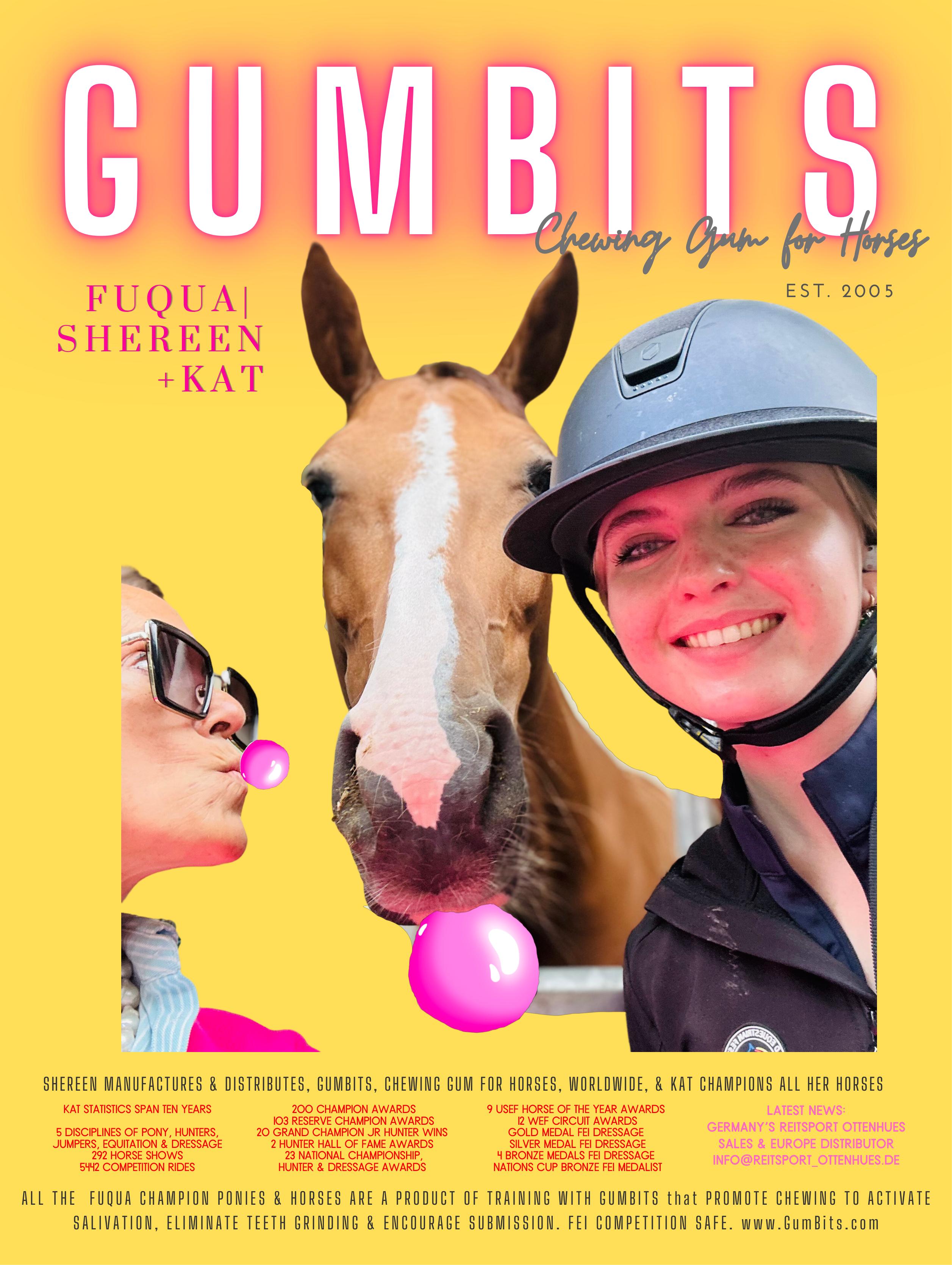
determined that HERITAGE ACRES STABLES LLC. , as licensee, shall be censured pursuant to Chapter 7, GR703.1a, and fined $250 pursuant to Chapter 7, GR703.1k.
COACHELLA HORSE PARK, LLC , as Competition Management, violated HU166.1.b, HJ125.4, and HJ125.5, of this Federation in that in connection with the Desert Circuit IX Horse Show held March 15-19, 2023, they inappropriately divided the 3’6” Performance Hunter Division, which had a total of 28 entries, using the California Split method of dividing the section, although the Rules state that “the section may only be divided after thirty (30) horses have competed in the first over fences class.”
In addition, class #737, $20,000 Young Hunter Championship, was held with restricted entries without seeking approval from the Federation at least ninety (90) days prior to the start of the competition resulting in USEF Horse of the Year (HOTY) points not being awarded to exhibitors.
The Federation resolved this matter through an informal resolution with Coachella Horse Park following an investigation and review of competition records, with which Competition Management fully cooperated with the Federation. In determining the proper penalty, the Federation took into account the seriousness of the violations and determined that the following penalties were appropriate.
For their violation of the Rules, it was determined that COACHELLA HORSE PARK, LLC be fined in the amount of $1,000, pursuant to GR703.1.k, and that the points earned by the entries in the Young Hunter Championship, shall be reinstated.
CHARLES RUSSELL , as Competition Management, Manager, and Licensee, violated Chapter 3, GR302.1.h.3, of Federation Rules in connection with the Atlanta In The Spring Horse Show held March 16-19, 2023, by offering and holding classes that the competition was not licensed to run. Specifically, USHJA Hunters, Low Children’s Hunters, Low Adult Hunters, Miscellaneous Jumper classes, and the USEF/NCEA Junior Hunter Seat Medal class, were held, although
none of these sections were approved or included in the License Agreement. In addition, the competition ran as a Jumper Level 2 Horse Show, however, was licensed as a Jumper Level 3.
The Federation resolved this matter through an informal resolution with Mr. Russell following an investigation and review of competition records, during which Mr. Russell fully cooperated with the Federation. In determining the proper penalty, the Federation took into account the seriousness of the violations, including that these violations were a breach of probation terms previously imposed on the Licensee by the Federation and determined that the following penalties were appropriate.
For these violations it was determined that CHARLES RUSSELL must apply for a Licensee Modification/Issuance of a New License in accordance with GR304 for all licenses under his Licensee or provide written notification of cancellation of existing licenses. It was further directed that CHARLES RUSSELL is not permitted to serve as Licensee or Manager of a USEF Licensed Competition for a period of three years beginning July 15, 2023, and terminating on July 15, 2026.
EVENTS AT TERRANOVA, as Licensee, violated Chapter 3, GR302.1.h.3.a, of this Federation in connection with The Event at Terranova held March 30-April 2, 2023, in that the competition was licensed to run Advanced Level; however, the competition did not run the Advanced Level, which is also considered a Bid Level.
The Federation entered into an informal resolution with Events at Terranova to resolve this matter outside of a hearing, during which they fully cooperated with the Federation throughout the proceedings. In determining the proper penalty, the Federation took into account the seriousness of the violation and determined that the following penalty was appropriate.
For this violation, it was determined that EVENTS AT TERRANOVA , as Licensee, shall be censured pursuant to Chapter 7, GR703.1a, and fined $1,000 pursuant to Chapter 7, GR703.1k.
PAUL W. FOOHEY , as Licensee, violated Chapter 3,
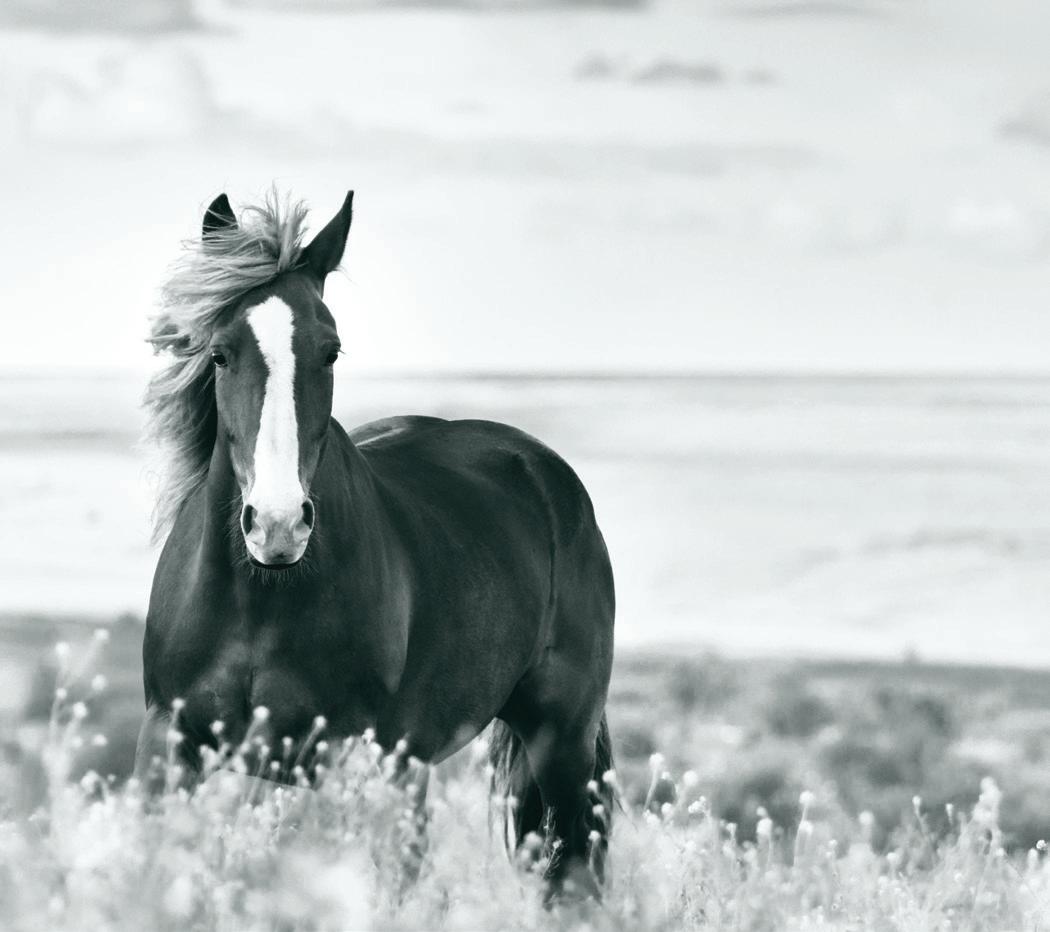

GR302.1.h.3 of this Federation, in connection with the Pines Open March II Horse Show held April 1-2, 2023, in that the competition offered and held an age-restricted equitation section that was not included in the executed USEF License Agreement.
The Federation entered into an informal resolution with Paul W. Foohey to resolve this matter outside of a hearing, with which they fully cooperated with the Federation throughout the proceedings. In determining the proper penalty, the Federation took into account the seriousness of the violation and determined that the following penalty was appropriate.
For this violation, it was determined that PAUL W. FOOHEY, as Licensee, shall be censured pursuant to Chapter 7, GR707.1a, and fined $300 pursuant to Chapter 7, GR707.1d.
LESLIE BEAN of Morriston, Fla., violated Chapter 7, GR702.1.a and GR702.1.d, of this Federation and the USEF Code of Conduct during the World Equestrian Center Dressage XIII Horse Show held on February 22-24, 2023, when she misrepresented a horse as another horse to conceal the fact that her horse was not properly registered or permitted to be on competition grounds.
The Federation entered into an informal resolution with Ms. Bean to resolve this matter outside of a hearing, with which she fully cooperated with the Federation throughout the proceedings. In determining the proper penalty, the Federation took into account the seriousness of the violation and determined that the following penalty was appropriate.
For this violation, LESLIE BEAN shall be censured pursuant to Chapter 7, GR703.1a, and fined $2,000 pursuant to Chapter 7, GR703.1k. Additionally, Ms. Bean shall be on probation until December 31, 2023, during which any substantiated report filed against her for failing to comply with the rules and policies of the Federation will result in disciplinary action.
VALERIE GARZA of Athens, Texas, violated Chapter 12, GR1202.1, and Chapter 13, GR1303, of this Federation in that in connection with the Saratoga Spring III Horse
Show, held May 18-21, 2023, she served as Competition Manager without the correct membership, and without refreshing her annual Safe Sport Training.
The Federation entered into an informal resolution with Ms. Garza to resolve this matter outside of a hearing, with which she fully cooperated with the Federation throughout the proceedings. In determining the proper penalty, the Federation took into account the seriousness of the violation and determined that the following penalty was appropriate.
For this violation, VALERIE GARZA shall be censured pursuant to Chapter 7, GR703.1a, and fined $500 pursuant to Chapter 7, GR703.1k.
HARLEY BROWN of Menlo Park, Calif., violated the USEF Code of Conduct and the USEF Safe Sport Policy in connection with the Sacramento International Welcome Week event in Rancho Murieta, Calif., held on October 5-9, 2023, in that on or about October 5, 2022, during Class # #213 1.20m Jumper II.2.1, he engaged in improper and emotionally abusive misconduct after entering the show ring to tend to his daughter and he aggressively shouted inappropriate and demeaning words directed at other individuals. Such conduct was disproportionate to the reasonable emotional reaction considering the surrounding circumstances and served to humiliate and harass those at whom the comments were directed.

The Federation entered into an informal resolution with Mr. Brown to resolve this matter outside of a hearing, with which he fully cooperated with the Federation throughout the proceedings. In determining the proper penalty, the Federation took into account the seriousness of the violation and determined that the following penalty was appropriate.
For this violation, HARLEY BROWN shall be censured pursuant to Chapter 7, GR703.1a, and fined $2,500 pursuant to Chapter 7, GR703.1k. Mr. Brown shall be on probation until December 31, 2023, during which time any substantiated report filed against him for failing to comply with the rules and policies of the Federation will result in disciplinary action. Additionally, Mr. Brown shall complete an anger



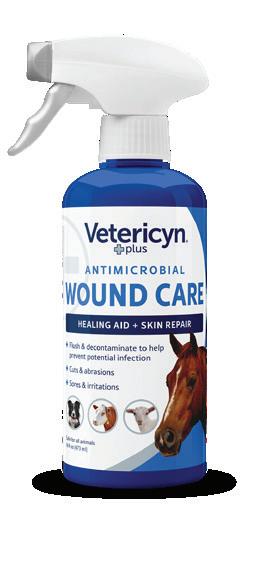
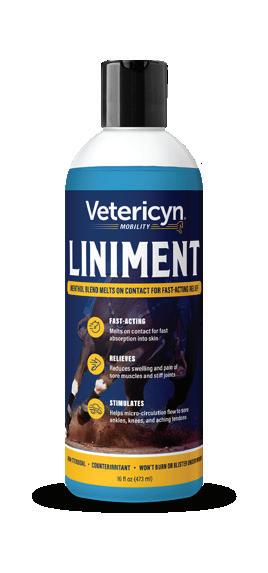

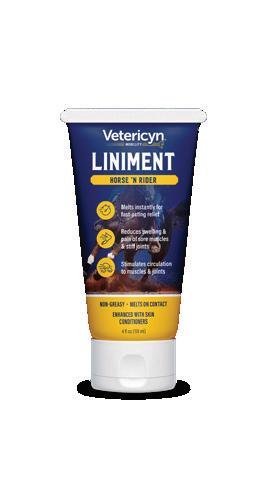
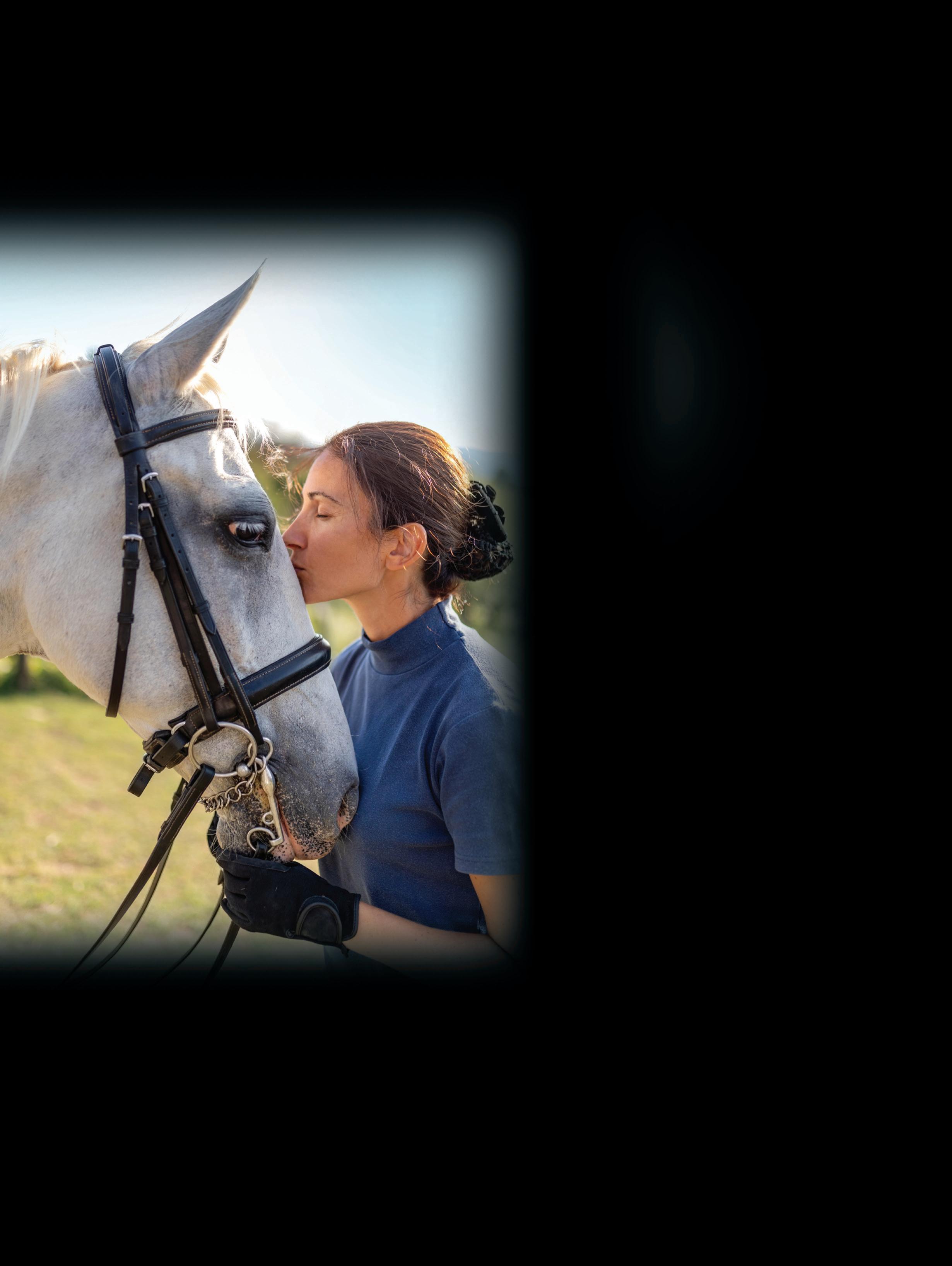
Challenge: Maintaining healthy weight and strong topline in senior horses
Solution: Equi-Jewel® high-fat rice bran
• Concentrated source of calories supports healthy weight.

Easy to chew and digest.
Pellet dissolves easily in water; great for use in daily mash.
Recommended for seniors with dental and digestive issues.
Satisfaction Guaranteed.
management course.
GEORGE D’AMBROSIO of Asbury, N.J., violated Federation Rules and/or Policies during the Garden State Horse show held May 3-7, 2023, when he engaged in a series of inappropriate behaviors that served to demean and attack participants at the event, including yelling, verbally attacking, and using profane language at individuals. Furthermore, he personally entered or directed staff to enter vehicles and relocate them without the owners’ consent or proper authority to do so.
The Federation resolved this matter through an informal resolution with Mr. D’Ambrosio following an investigation and review of the matter, during which Mr. D’Ambrosio was represented by counsel and fully cooperated with the Federation. In determining the proper penalty, the Federation took into account the facts and mitigating factors in this case and determined that the following penalty was appropriate.
For this violation GEORGE D’AMBROSIO shall be fined $1,000 pursuant to Chapter 7, GR703.1k.
BRIAN MURCH of Orchard Park, N.Y., violated Chapter 4, GR410-411, of this Federation in connection with the U.S. National Arabian and Half-Arabian National Championship Horse Show held in Tulsa, Okla., on October 21-29, 2022, when he, as Trainer, Agent, or other Person Responsible as defined by GR148 and GR404, exhibited the horse EXTRAORDINARILILY after it had been administered and/or contained in its body cetirizine. The facts and mitigating factors in this case supported the following penalty even though it is below the suggested range for Category II Violations outlined in the Drugs and Medications Penalty Guidelines.
The Federation resolved this matter through an informal resolution with Mr. Murch following an investigation and review of the matter, in which Mr. Murch was represented by counsel and fully cooperated with the Federation. In determining the proper penalty,
the Federation took into account the facts and mitigating factors in this case and the USEF Drugs and Medications Penalty Guidelines and determined that the following penalty was appropriate even though it is below the suggested range for Category II Violations outlined in the Penalty Guidelines.
For this violation, it was determined that BRIAN MURCH be censured pursuant to Chapter 7, GR703.1a, and fined $2,500 pursuant to Chapter 7, GR703.1j.
RACHEL AGEE of Deale, Md., violated Chapter 4, GR410, of this Federation in connection with the St. Christopher’s Hunter/ Jumper Horse Show held on May 10-14, 2023, in that she, as trainer, exhibited the horse SPECTACULAR after it had been administered and/or contained in its body dexamethasone in a plasma concentration exceeding the maximum permitted level.
For this violation, it was determined that RACHEL AGEE be censured pursuant to Chapter 7, GR703.1a, and fined $1,000 pursuant to Chapter 7, GR703.1j. It was further directed that for this violation of the rules, all trophies, prizes, ribbons, and monies, if any, won by SPECTACULAR at said competition must be redistributed pursuant to Chapter 7, GR703.1g.
SHP MGT, as Competition Management, violated Chapter 10, GR1004.2, and Chapter 12, GR1211.1, GR1211.2, and GR1211..3a, of the Federation’s Rules in connection with the SHP Spring Classic I Horse Show held May 10-14, 2023, in that they permitted Brad Gabriel to serve as Hunter and Hunter Seat Equitation Judge without a License or Guest Judge Card.
Furthermore, SHP MGT violated Chapter 12, GR1211.4.f.5, of the Federation’s Rules in that it ran 5 performance areas simultaneously; although only one Steward was on duty.
Additionally, SHP MGT violated Chapter 3, GR302.1.h.3, when it offered and held the USHJA International Hunter Derby, Hunter Classics, and Green Pony Hunter, although these sections were not included in the License Agreement.
The Federation resolved this matter through an informal resolution with SHP MGT following an investigation and review of the matter. In determining the proper penalty, the Federation took into account the seriousness of the violations and determined that the following penalties were appropriate.
For these violations, it was determined that SHP MGT be censured pursuant to Chapter 7, GR703.1.a, and fined $1,350, pursuant to Chapter 7, GR703.1.k.
JACK TOWELL, of Camden, S.C., violated Chapter 4, GR410, of this Federation in connection with the Devon Horse Show held on May 25-June 4, 2023, in that he, as trainer, exhibited the horse GOLDEN YEARS after it had been administered and/or contained in its body flunixin in a plasma concentration exceeding the maximum permitted level.
For this violation, it was determined that JACK TOWELL be censured pursuant to Chapter 7, GR703.1a, and fined $1,000 pursuant to Chapter 7, GR703.1j. It was further directed that for this violation of the rules, all trophies, prizes, ribbons, and monies, if any, won by GOLDEN YEARS at said competition must be redistributed pursuant to Chapter 7, GR703.1g.
MARTIN GUELDNER of Carlisle, Ky., violated Chapter 4, GR410, of this Federation,in connection with the Rock Creek Horse Show held on June 6-10, 2023, in that he, as trainer and owner, exhibited the horse SENOR FROG after it had been administered and/or contained in its body ketoprofen in a plasma concentration exceeding the maximum permitted level.
For this violation it was determined that MARTIN GUELDNER be censured pursuant to Chapter 7, GR703.1a, and fined $1,500 (fine was enhanced due to level of ketoprofen detected) pursuant to Chapter 7, GR703.1j. It was further directed that for this violation of the rules, all trophies, prizes, ribbons, and monies, if any, won by SENOR FROG at said competition must be redistributed pursuant to Chapter 7, GR703.1g.
BOB BRISON of New
Approved by FDA under NADA # 141-458
Equioxx ® Tablets
(firocoxib) 57mg
Brief Summary: This information is not comprehensive. Before using Equioxx ® (firocoxib) tablets, please consult the product insert for full prescribing information. The product insert may be obtained from your veterinarian or by visiting www.equioxx.com.
CAUTION: Federal (USA) law restricts this drug to use by or on the order of a licensed veterinarian. Indications: EQUIOXX Tablets are administered once daily for up to 14 days for the control of pain and inflammation associated with osteoarthritis in horses.
Dosage and Administration: Always provide the Client Information Sheet with the prescription. The recommended dosage of EQUIOXX Tablets is one 57 mg tablet administered orally to horses weighing 800 – 1300 lbs, once daily for up to 14 days. For ease of administration, EQUIOXX Tablets may be given with food.
The overall duration of treatment with any firocoxib formulation in horses, including EQUIOXX Tablets, Injection or Oral Paste, should not exceed 14 days. Please see the package insert for EQUIOXX Injection or Oral Paste for appropriate prescribing information for those formulations.
Contraindications: Horses with a hypersensitivity to firocoxib should not receive EQUIOXX Tablets.
Warnings: For use in horses only. Do not use in horses intended for human consumption. Store EQUIOXX Tablets out of the reach of dogs and other pets in a secured location in order to prevent accidental ingestion or overdose.
Human Warnings: Not for use in humans. Keep this and all medications out of the reach of children. Consult a physician in case of accidental ingestion by humans.
Precautions: Horses should undergo a thorough history and physical examination before initiation of NSAID therapy. Appropriate laboratory tests should be conducted to establish hematological and serum biochemical baseline data before and periodically during administration of any NSAID. Clients should be advised to observe for signs of potential drug toxicity and be given a Client Information Sheet with each prescription. See Information for Owner or Person Treating Horse section of this package insert. Treatment with EQUIOXX Tablets should be terminated if signs such as inappetence, colic, abnormal feces, or lethargy are observed. As a class, cyclooxygenase inhibitory NSAIDs may be associated with gastrointestinal, renal, and hepatic toxicity. Sensitivity to drug-associated adverse events varies with the individual patient. Horses that have experienced adverse reactions from one NSAID may experience adverse reactions from another NSAID. Patients at greatest risk for adverse events are those that are dehydrated, on diuretic therapy, or those with existing renal, cardiovascular, and/or hepatic dysfunction. Concurrent administration of potentially nephrotoxic drugs should be carefully approached or avoided. NSAIDs may inhibit the prostaglandins that maintain normal homeostatic function. Such anti-prostaglandin effects may result in clinically significant disease in patients with underlying or pre-existing disease that has not been previously diagnosed. Since many NSAIDs possess the potential to produce gastrointestinal ulcerations and/or gastrointestinal perforation, concomitant use of EQUIOXX Tablets with other anti-inflammatory drugs, such as NSAIDs or corticosteroids, should be avoided.
The concomitant use of protein bound drugs with EQUIOXX Tablets has not been studied in horses. The influence of concomitant drugs that may inhibit the metabolism of EQUIOXX Tablets has not been evaluated. Drug compatibility should be monitored in patients requiring adjunctive therapy. The safe use of EQUIOXX Tablets in horses less than one year in age, horses used for breeding, or in pregnant or lactating mares has not been evaluated. Consider appropriate washout times when switching from one NSAID to another NSAID or corticosteroid.
Adverse Reactions: The safety and effectiveness of EQUIOXX Tablets was established in a relative bioavailability study comparing EQUIOXX Tablets and EQUIOXX (firocoxib) Oral Paste. Therefore, additional field studies were not performed to support the effectiveness of EQUIOXX Tablets.
In controlled field studies, 127 horses (ages 3 to 37 years) were evaluated for safety when given EQUIOXX Oral Paste at a dose of 0.045 mg/lb (0.1 mg/kg) orally once daily for up to 14 days. The following adverse reactions were observed. Horses may have experienced more than one of the observed adverse reactions during the study.
Table 1: Adverse Reactions Seen in U.S. Field Studies with EQUIOXX Oral Paste:
Adverse Reactions EQUIOXX n=127 Active Control n=125
Abdominal Pain 0 1
Polydipsia 0 1
Urticaria 0 1
In these field trials, EQUIOXX Oral Paste was safely used concomitantly with other therapies, including vaccines, anthelmintics, and antibiotics. The safety data sheet (SDS) contains more detailed occupational safety information. To report suspected adverse events, for technical assistance, or to obtain a copy of the SDS, contact Boehringer Ingelheim Animal Health USA Inc. at 1-888-637-4251. For additional information about adverse drug experience reporting for animal drugs, contact FDA at 1-888-FDA-VETS or online at www.fda.gov/reportanimalae.
Animal Safety: The safety of EQUIOXX Tablets was supported by a relative bioavailability study comparing EQUIOXX Tablets and EQUIOXX Oral Paste (see CLINICAL PHARMACOLOGY, Relative Bioavailability Study), pharmacovigilance information, and target animal safety data for existing firocoxib containing products in horses. No additional target animal safety studies were conducted with EQUIOXX Tablets.
In a target animal safety study conducted to support the approval of EQUIOXX Oral Paste, firocoxib was administered orally to healthy adult horses (two male castrates and four females per group) at 0, 0.1, 0.3 and 0.5 mg firocoxib/kg body weight (1, 3 and 5X the recommended dose) for 30 days. Administration of firocoxib at 0.3 and 0.5 mg/kg body weight was associated with an increased incidence of oral ulcers as compared to the control group but, no oral ulcers were noted with 0.1 mg/kg. There were no other drugrelated adverse findings in this study.
In another target animal safety study, firocoxib was administered orally to healthy adult horses (four males or male castrates and four females per group) at 0, 0.1, 0.3 and 0.5 mg firocoxib/kg body weight (1, 3 and 5X the recommended dose) for 42 days. Administration of firocoxib at 0.1, 0.3 and 0.5 mg/kg body weight was associated with delayed healing of pre-existing oral (lip, tongue, gingival) ulcers. In addition, the incidence of oral ulcers was higher in all treated groups as compared to the control group.
Clinical chemistry and coagulation abnormalities were seen in several horses in the 0.5 mg/kg (5X) group. One 5X male horse developed a mildly elevated BUN and creatinine over the course of the study, prolonged buccal mucosal bleeding time (BMBT), and a dilated pelvis of the right kidney. Another 5X male had a similar mild increase in creatinine during the study but did not have any gross abnormal findings. One female in the 5X group had a prolonged BMBT, bilateral tubulointerstitial nephropathy and bilateral papillary necrosis. Tubulointerstitial nephropathy occurred in one 3X female, two 3X male horses, and the 5X female horse discussed above with the prolonged BMBT. Papillary necrosis was present in one 1X male horse and the 5X female horse discussed above. Despite the gross and microscopic renal lesions, all of the horses were clinically healthy and had normal hematology, clinical chemistry and urinalysis values. In another target animal safety study, firocoxib was administered orally to healthy adult horses (three females, two male castrates and one male per group) at 0, 0.25 mg/kg, 0.75 mg/kg and 1.25 mg/kg (2.5, 7.5 and 12.5X the recommended dose of 0.1 mg/kg) for 92 days. An additional group of three females, two male castrates and one male per group, was dosed at 1.25 mg/ kg for 92 days but was monitored until Days 147-149. There were treatmentrelated adverse events in all treated groups. These consisted of ulcers of the lips, gingiva and tongue and erosions of the skin of the mandible and head. Gross and microscopic lesions of the kidneys consistent with tubulointerstitial nephropathy were seen in all treated groups. Papillary necrosis was seen in the 2.5X and 12.5X groups. In addition, several 12.5X horses had elevated liver enzymes (GGT, SDH, AST and ALT). One 2.5X horse had increased urine GGT and urine protein levels which was due to renal hemorrhage and nephropathy. Gastric ulcers of the margo plicatus and glandular area were more prevalent in the 2.5X and 7.5X groups, but not seen in the 12.5X group. The group of horses that were monitored until Days 147-149 showed partial to full recovery from oral and skin ulcers, but no recovery from tubulointerstitial nephropathy.
Storage Information: Store at room temperature, between 59º- 86 º F (15º - 30º C). Brief periods up to 104º F (40º C) are permitted. How Supplied: EQUIOXX is available as round, beige to tan, half-scored tablets, containing 57 mg firocoxib. EQUIOXX Tablets are supplied in 60 and 180 count bottles. 1 McCann ME, Rickes EL,
Bloomfield, Mo., violated Chapter 4, GR410, of this Federation in connection with the Midwest Charity Horse Show held on June 13-17, 2023, in that he, as trainer, exhibited the horse DOMINIQUE after it had been administered and/or contained in its body dexamethasone in a plasma concentration exceeding the maximum permitted level.
For this violation it was determined that BOB BRISON be censured pursuant to Chapter 7, GR703.1a, and fined $1,000 pursuant to Chapter 7, GR703.1j. It was further directed that for this violation of the rules, all trophies, prizes, ribbons, and monies, if any, won by DOMINIQUE at said competition must be redistributed pursuant to Chapter 7, GR703.1g.
MICHAEL MCCORMICK of Flower Mound, Texas, violated Chapter 4, GR410, of this Federation, in connection with the WEC Ocala Summer #5 Horse Show held on July 4-9, 2023, in that he, as trainer, exhibited the horse MTM LOLAH LOL after it had been administered and/or contained in its body dexamethasone in a plasma concentration exceeding the maximum permitted level.
For this violation, it was determined that MICHAEL MCCORMICK be censured pursuant to Chapter 7, GR703.1a, and fined $1,000 pursuant to Chapter 7, GR703.1j. It was further directed that for this violation of the rules, all trophies, prizes, ribbons, and monies, if any, won by MTM LOLAH LOL at said competition must be redistributed pursuant to Chapter 7, GR703.1g.
NINA FENSTERMACHER of New Freedom, Pa., as trainer, violated Chapter 4, GR410-411, of this Federation in connection with the Loch Moy Summer Dressage Festival II Horse Show held on June 4, 2023, in that the horse REMARKABLE was exhibited after it had been administered and/or contained in its body cetirizine. The facts and mitigating factors in this case supported the following penalty even though it is below the suggested range for Category II Violations outlined in the Drugs and Medications Penalty Guidelines.
For this violation it was determined that NINA FENSTERMACHER be censured pursuant to Chapter 7, GR703.1a, and fined $1,500
pursuant to Chapter 7, GR703.1j. It was further directed that for this violation of the rules, all trophies, prizes, ribbons, and monies, if any, won by REMARKABLE at said competition must be redistributed pursuant to Chapter 7, GR703.1g.
BRIANNA WIRFS of Mount Airy, Md., as trainer, violated Chapter 4, GR410-411, of this Federation in connection with the Loch Moy Summer Dressage Festival II Horse Show held on June 4, 2023, in that the horse MY LUCKY COPPER PENNY was exhibited after it had been administered and/or contained in its body cetirizine. The facts and mitigating factors in this case supported the following penalty even though it is below the suggested range for Category II Violations outlined in the Drugs and Medications Penalty Guidelines.
For this violation, it was determined that BRIANNA WIRFS be censured pursuant to Chapter 7, GR703.1a, and fined $1,000 pursuant to Chapter 7, GR703.1j. It was further directed that for this violation of the rules, all trophies, prizes, ribbons, and monies, if any, won by MY LUCKY COPPER PENNY at said competition must be redistributed pursuant to Chapter 7, GR703.1g.
BIANCA CORDEIRO of Leesburg, Va., as trainer, violated Chapter 4, GR410-411, of this Federation in connection with the Middleburg Horse Trials held on June 10-11, 2023, in that the horse LORDANS LAD was exhibited after it had been administered and/or contained in its body cetirizine. The facts and mitigating factors in this case supported the following penalty even though it is below the suggested range for Category II Violations outlined in the Drugs and Medications Penalty Guidelines.
For this violation, it was determined that BIANCA CORDEIRO be censured pursuant to Chapter 7, GR703.1a, and fined $1,500 pursuant to Chapter 7, GR703.1j. It was further directed that for this violation of the rules, all trophies, prizes, ribbons, and monies, if any, won by LORDANS LAD at said competition must be redistributed pursuant to Chapter 7, GR703.1g.
JOYCE MERSEREAU of Wellington, Fla., violated Chapter 4, GR410, of this Federation in connection with the Upperville Colt & Horse Show held
on June 5-11, 2023, in that she, as trainer, exhibited the horse GREG after it had been administered and/or contained in its body methocarbamol in a plasma concentration exceeding the maximum permitted level, and guaifenesin.
For this violation, it was determined that JOYCE MERSEREAU be censured pursuant to Chapter 7, GR703.1a, and fined $1,000 pursuant to Chapter 7, GR703.1j. It was further directed that for this violation of the rules, all trophies, prizes, ribbons, and monies, if any, won by GREG at said competition must be redistributed pursuant to Chapter 7, GR703.1g.
JENNIFER TAYLOR of Huntersville, N.C., violated Chapter 4, GR410, of this Federation in connection with the Tryon Spring 6- TR & HC Charity Horse Show held on June 6-11, 2023, in that she, as trainer, exhibited the horse PRECIOUS MOMENTS after it had been administered and/or contained in its body methocarbamol in a plasma concentration exceeding the maximum permitted level, and guaifenesin.
For this violation, it was determined that JENNIFER TAYLOR be censured pursuant to Chapter 7, GR703.1a, and fined $1,000 pursuant to Chapter 7, GR703.1j. It was further directed that for this violation of the rules, all trophies, prizes, ribbons, and monies, if any, won by PRECIOUS MOMENTS at said competition must be redistributed pursuant to Chapter 7, GR703.1g.
GUY CAMBRIA of Upperville, Va., violated Chapter 4, GR410, of this Federation, in connection with the Upperville Colt & Horse Show held on June 5-11, 2023, in that he, as trainer, exhibited the horse FIGURE OF SPEECH after it had been administered and/or contained in its body methocarbamol in a plasma concentration exceeding the maximum permitted level, and guaifenesin.
For this violation, it was determined that GUY CAMBRIA be censured pursuant to Chapter 7, GR703.1a, and fined $1,000 pursuant to Chapter 7, GR703.1j. It was further directed that for this violation of the rules, all trophies, prizes, ribbons, and monies, if any, won by FIGURE OF SPEECH at said competition must be
redistributed pursuant to Chapter 7, GR703.1g.
ALICE COKE of Sewanee, Tenn., violated Chapter 4, GR410, of this Federation in connection with the Mid South Classic Horse Show held on July 5-9, 2023, in that she, as trainer, exhibited the horse ARMANI after it had been administered and/or contained in its body methocarbamol in a plasma concentration exceeding the maximum permitted level, and guaifenesin.
For this violation, it was determined that ALICE COKE be censured pursuant to Chapter 7, GR703.1a, and fined $1,000 pursuant to Chapter 7, GR703.1j. It was further directed that for this violation of the rules, all trophies, prizes, ribbons, and monies, if any, won by ARMANI at said competition must be redistributed pursuant to Chapter 7, GR703.1g.
SAMANTHA LEUCI of Califon, N.J., as trainer, violated Chapter 4, GR410-411, of this Federation, in connection with The Skidmore College Saratoga Classic II Horse Show held on June 21-25, 2023, in that the horse SEDONA was exhibited after it had been administered and/or contained in its body cetirizine. The facts and mitigating factors in this case supported the following penalty even though it is below the suggested range for Category II Violations outlined in the Drugs and Medications Penalty Guidelines.
For this violation, it was determined that SAMANTHA LEUCI be censured pursuant to Chapter 7, GR703.1a, and fined $1,500 pursuant to Chapter 7, GR703.1j. It was further directed that for this violation of the rules, all trophies, prizes, ribbons, and monies, if any, won by SEDONA at said competition must be redistributed pursuant to Chapter 7, GR703.1g.
KIRA RUBIN of Bolivar, Mo., as trainer, violated Chapter 4, GR410-411, of this Federation, in connection with the Mill Creek Pony Club Horse Trials held on May 27-28, 2023, in that the horse DOUBLE PLAY was exhibited after it had been administered and/or contained in its body cetirizine. The facts and mitigating factors in this case supported the following penalty even though it is below the suggested range for Category II Violations outlined in the Drugs and Medications Penalty Guidelines.



For this violation it was determined that KIRA RUBIN be censured pursuant to Chapter 7, GR703.1a, and fined $1,500 pursuant to Chapter 7, GR703.1j. It was further directed that for this violation of the rules, all trophies, prizes, ribbons, and monies, if any, won by DOUBLE PLAY at said competition must be redistributed pursuant to Chapter 7, GR703.1g.
SCOTT TRAVERS of Westport, Mass., violated Chapter 4, GR410-411 of this Federation, in connection with Connecticut Morgan Open Horse Show held on June 7-10, 2023, in that he, as trainer, exhibited the horse BLACK PRONG NIGHT STALKER after it had been administered and/or contained in its body trazodone. The facts and mitigating factors in this case supported the following penalty even though it is below the suggested range for Category III Violations outlined in the Drugs and Medications Penalty Guidelines.
For this violation it was determined that pursuant to Chapter 7, GR703.1b and GR703.1f, SCOTT TRAVERS shall be found not in good standing, suspended from membership, and forbidden
from the privilege of taking any part whatsoever in any Licensed Competition for three (3) months and is excluded from all competition grounds (cannot be on grounds from the time participants are admitted on the competition grounds until the last time for departure). For example, suspended individuals may not be on competition grounds during schooling or other such days prior to the start of the competition for any purpose, including such things as coaching riders, training or schooling horses, or trailering horses on or off competition grounds during Licensed Competitions for that period. Furthermore, suspended individuals are excluded from (1) competition grounds as an exhibitor, participant, or spectator; (2) from participating in all Federation affairs and activities; (3) from holding or exercising office in the Federation or in any Licensed Competition; and (4) from attending, observing, or participating in any event, forum, meeting, program, clinic, task force, or committee of the Federation, sponsored by or conducted by the Federation, or held in connection with the Federation and any of its
activities. Regulations as to suspended persons are set forth in detail in General Rule 704.
The three-month suspension shall commence on April 1, 2024, and terminate at midnight on June 30, 2024. Any horse or horses owned, leased, or of any partnership, corporation or stable of his, or shown in his name or for his reputation (whether such interest was held at the time of the alleged violation or acquired thereafter) shall also be suspended, pursuant to Chapter 7, GR703.1c, for the same period.
SCOTT TRAVERS was also fined $3,000 pursuant to Chapter 7, GR703.1j. It was further directed that for this violation of the rules, all trophies, prizes, ribbons, and monies, if any, won by BLACK PRONG NIGHT STALKER at said competition must be redistributed pursuant to Chapter 7, GR703.1g.
BRIAN GAUTHIER of Marlborough, Mass., as trainer, violated Chapter 4, GR410-411, of this Federation in connection with the GMHA June Horse Trials held on June 3-4, 2023, in that the horse SIR WINSOME was exhibited after it had been administered and/or contained in its body pentoxifylline and
albuterol. Following a review of the facts and evidence submitted, it was determined that a warning was appropriate for the albuterol finding. Furthermore, related to the pentoxifylline finding, the facts and mitigating factors in this case supported the following penalty even though it is below the suggested range for Category II Violations outlined in the Drugs and Medications Penalty Guidelines.
For this violation, it was determined that BRIAN GAUTHIER be censured pursuant to Chapter 7, GR703.1a, and fined $1,500 pursuant to Chapter 7, GR703.1j. It was further directed that for this violation of the rules, all trophies, prizes, ribbons, and monies, if any, won by SIR WINSOME at said competition must be redistributed pursuant to Chapter 7, GR703.1g.
ASHLYNN MEUCHEL of Anthony, Fla., violated the USEF Code of Conduct and Chapter 7, GR702.1.d, of the Federation’s Rules in connection with the WEC Ocala Summer #2 Horse Show in Ocala, Fla., held on June 13-18, 2023 in that on or about on or about June 14, 2023, she, or others on her behalf failed to place the
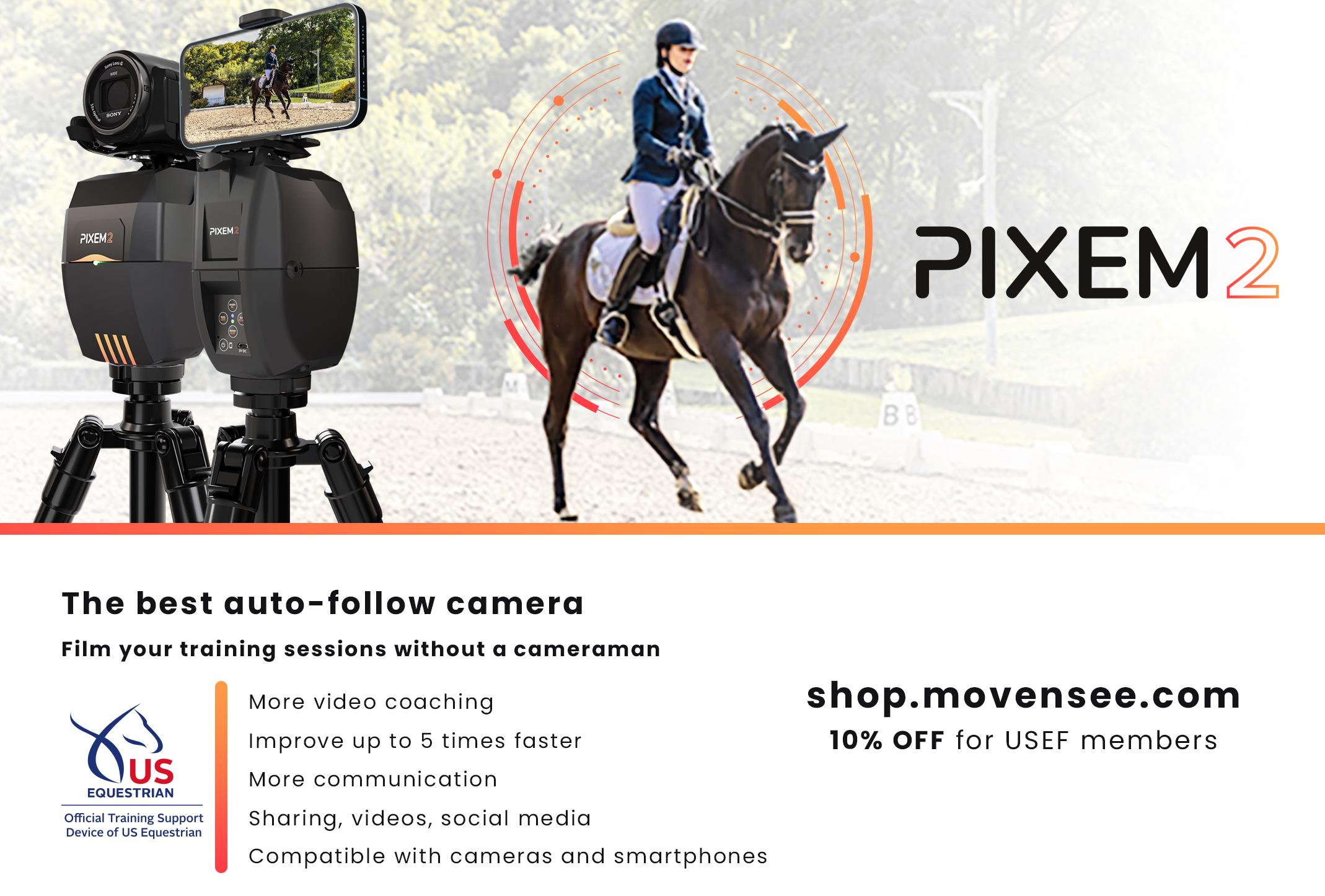

well-being, safety, and health of her horse/horses above all other considerations while on competition grounds. Specifically, she kept multiple horses enclosed on a transport trailer for an extended period during a time of heightened temperatures. Additionally, one of the horses was exhibiting distress, including moving in such a manner to shake the trailer, and was drenched in sweat. Ms. Meuchel displayed indifference to the welfare of the animals by failing to immediately attend to the situation when competition staff requested her presence, as well as by failing to provide a cooling fan, rinse, or offer water after the horses were removed from the trailer and placed into a stall.
The Federation entered into an informal resolution with Ms. Meuchel to resolve this matter outside of a hearing, with which she fully cooperated with the Federation throughout the proceedings, including participating in an interview with Federation Staff. In determining the proper penalty, the Federation took into account the seriousness of the violation and determined that the following penalty was appropriate.

Through the control of warm and cold water temperature, water height (to control buoyancy and resistance), speed and duration, equine trainers and veterinarians can better treat, train and condition equine athletes:
• Improve performance
• Prevent injury
• Recover faster
HudsonAquatic.com • 888-206-7802
For this violation, it was determined that pursuant to Chapter 7, GR703.1b and GR703.1f, ASHLYNN MEUCHEL shall be found not in good standing, suspended from membership, and forbidden from the privilege of taking any part whatsoever in any Licensed Competition for two months and is excluded from all competition grounds (cannot be on grounds from the time participants are admitted on the competition grounds until the last time for departure). For example, suspended individuals may not be on competition grounds during schooling or other such days prior to the start of the competition for any purpose, including such things as coaching riders, training or schooling horses, or trailering horses on or off competition grounds during Licensed Competitions for that period. Furthermore, suspended individuals are excluded from (1) competition grounds as an exhibitor, participant, or spectator; (2) from participating in all Federation affairs and activities; (3) from holding or exercising office in the Federation or in any Licensed Competition; and (4) from attending, observing,
or participating in any event, forum, meeting, program, clinic, task force, or committee of the Federation, sponsored by or conducted by the Federation, or held in connection with the Federation and any of its activities. Regulations as to suspended persons are set forth in detail in General Rule 704.
The two-month suspension commenced on June 18, 2023, and terminated at midnight on August 18, 2023. Any horse or horses owned, leased, or of any partnership, corporation or stable of hers, or shown in her name or for her reputation (whether such interest was held at the time of the alleged violation or acquired thereafter), were also be suspended, pursuant to Chapter 7, GR703.1c for the same period.
ASHLYNN MEUCHEL was also fined $2,500 pursuant to Chapter 7, GR703.1j.
DANIEL MCCONAUGHEY of Hudson, Wisc., violated Chapter 4, GR410 of this Federation in connection with the Region 13 Horse Show held on June 20-25, 2023, in that he, as trainer, exhibited the horse VALERIUS CS after it had been administered and/or contained
in its body dexamethasone in a plasma concentration exceeding the maximum permitted level.
For this violation, it was determined that DANIEL MCCONAUGHEY be censured pursuant to Chapter 7, GR703.1a, and fined $1,000 pursuant to Chapter 7, GR703.1j. It was further directed that for this violation of the rules, all trophies, prizes, ribbons, and monies, if any, won by VALERIUS CS at said competition must be redistributed pursuant to Chapter 7, GR703.1g.
JULIE AGAR of Wilmington, Ohio, violated the Chapter 7, GR702.1.d, of this Federation in that as Competition Secretary she was intentionally listing an incorrect and exorbitant amount for the USEF Show Pass Fee, thereby misrepresenting the true fee on the Entry Blank. This was done to catch the attention of exhibitors before they close out their show bill and ensure the exhibitor obtained a USEF membership before leaving the competition.
For this violation, JULIE AGAR shall be fined $500 pursuant to Chapter 7, GR703.1k.
“Tribute”

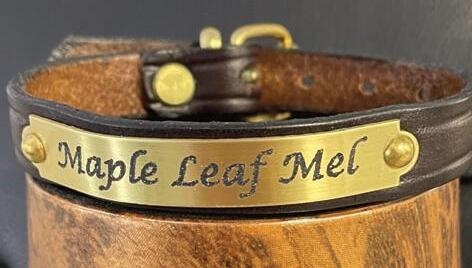

grayson-jockeyclub.org




